- You are here:
- All Botswana Tours
- Okavango Delta Tours

Your Safari
Tour length, rates in usd $ – change currency, starting from.
- Victoria Falls Town (31)
- Livingstone (5)
- Johannesburg (5)
- Cape Town (4)
- Nairobi (0)
- Entebbe (0)
- Zanzibar (0)
- Dar es Salaam (0)
- Kampala (0)
- Windhoek (3)
- Addis Ababa (0)
- Mombasa (0)
- Hoedspruit (0)
- Antananarivo (0)
- Kasane (11)
- Port Elizabeth (0)
- Pretoria (0)
- Bujumbura (0)
- Diani Beach (0)
- Upington (0)
- Hazyview (0)
- Nelspruit (0)
- Blantyre (0)
- Skukuza (0)
Comfort Level
- Luxury+ (7)
- Luxury (42)
- Mid-range (58)
- Budget (67)
Private or Shared Tour
- Private tour (103)
- Shared tour (82)
Safari Type
- Lodge, tented camp or hotel (84)
- Camping (101)
Operator Rating
- & up (180)
Specialized Tours
- Fly-in safaris (37)
- Family (24)
- Beach time (1)
- Honeymoon (49)
- Gorilla trekking (1)
- Photographic safaris (0)
- Mountain climbing (0)
- Walking safaris (0)
- Self-drive (2)
- Guided self-drive (0)
- Chimp trekking (1)
- Overland tours (10)
- Cycling safaris (0)
- Canoe safaris (25)
- Horseback safaris (0)
- Birding tours (0)
- Accessible safaris (0)
- Golf & Wildlife (0)
Other Tour Features
- Airport transfer is included (185)
- Itinerary can be customized (119)
Filter by Operator
Filter by accommodation, operators from.
- South Africa (26)
- Tanzania (0)
- United Kingdom (22)
- United States (19)
- Australia (1)
- Belgium (0)
- Botswana (94)
- Comoros (0)
- Denmark (0)
- Ethiopia (2)
- Eswatini (0)
- Germany (0)
- Ireland (0)
- Lesotho (0)
- Madagascar (0)
- Mauritius (0)
- Mayotte (0)
- Mozambique (0)
- Namibia (5)
- Netherlands (0)
- New Zealand (0)
- Nigeria (0)
- Portugal (0)
- Reunion (0)
- Seychelles (0)
- Singapore (0)
- Switzerland (6)
- United Arab Emirates (0)
- Zimbabwe (25)
Okavango Delta Safari Tours & Holidays
The Okavango Delta safari is an African classic. The vast network of waterways changes with the seasons, but always hosts memorable wildlife populations. The diversity here is endless, with islands that exist one year but are gone the next. This world in motion should be drama enough for most visitors, but it is here that Botswana’s wildlife reputation was born and so many wildlife documentaries were filmed. To put it another way, the Delta is one of the best places on the planet to see wildlife.

5-Day Botswana Luxury Tour
$3,346 to $5,317 pp (USD)
Botswana: Private tour Luxury Lodge & Tented Camp
You Visit: Kasane (Start) , Chobe NP, Okavango Delta, Maun Airport (End)

4.9 /5 – 149 Reviews
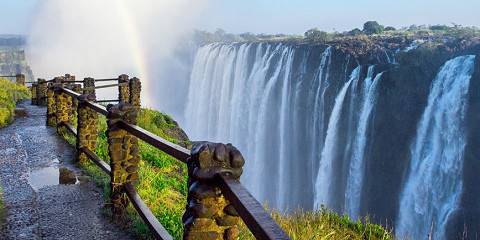
10-Day Northern Highlights Trip
$6,050 pp (USD)
Botswana & Zimbabwe: Private tour Mid-range Camping & Lodge
You Visit: Victoria Falls town (Start) , Savuti (Chobe NP) , Khwai (Okavango Delta) , Moremi GR (Okavango Delta) , Maun (End)
Wild For Game Safaris Tour operator has an office in Botswana
5.0 /5 – 17 Reviews

7-Day Last Minute Deal - Kalahari / Linyanti / Okavango
$4,642 to $4,884 pp (USD)
You Visit: Maun (Start) , Linyanti, Okavango Delta, Central Kalahari GR, Maun Airport (End)
Savanna Safaris and Tours Tour operator has an office in Botswana
5.0 /5 – 16 Reviews

6-Day Your Unforgettable Botswana Tour
$2,618 pp (USD)
Botswana: Shared tour (max 10 people per vehicle) Budget Camping
You Visit: Kasane (Start) , Chobe NP, Savuti (Chobe NP) , Moremi GR (Okavango Delta) , Maun (End)
Tony Mobile Safari Tour operator has an office in Botswana
5.0 /5 – 79 Reviews

7-Day True Adventure
$4,180 to $4,598 pp (USD)
Botswana: Shared tour (max 9 people per vehicle) Budget Camping
You Visit: Maun (Start) , Khwai (Okavango Delta) , Savuti (Chobe NP) , Chobe NP, Kasane (End)
Early Kingfisher Safari Tour operator has an office in Botswana
5.0 /5 – 21 Reviews
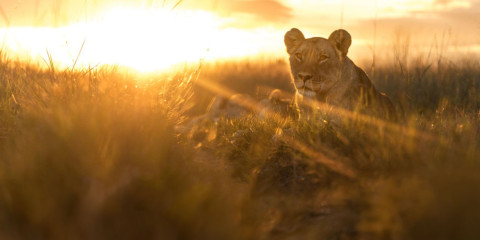
7-Day Ultra-Luxury Okavango Delta Honeymoon
$8,233 to $14,819 pp (USD)
Botswana: Private tour Luxury Tented Camp
You Visit: Maun (Start) , Linyanti, Okavango Delta, Jao (Okavango Delta) , Maun (End)
5.0 /5 – 41 Reviews

11-Day Expedition Safari
$1,870 to $2,530 pp (USD)
Botswana: Shared tour (max 6 people per vehicle) Budget Camping
You Visit: Maun Airport (Start) , Moremi GR (Okavango Delta) , Khwai (Okavango Delta) , Savuti Channel (Chobe NP) , Chobe NP, Kasane (End)
Okavango Exploration Safaris Tour operator has an office in Botswana
5.0 /5 – 2 Reviews
7-Day Botswana Exceptional Wildlife Luxury Vacation
$10,450 to $10,670 pp (USD)
Botswana: Private tour Luxury Lodge & Tented Bush Camp
You Visit: Maun (Start) , Okavango Delta, Moremi GR (Okavango Delta) , Savuti (Chobe NP) , Chobe NP, Maun Airport (End)
5.0 /5 – 122 Reviews
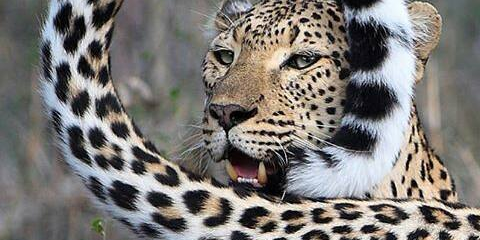
6-Day Okavango Delta Experience (Fly-in Safari)
$2,710 to $6,040 pp (USD)
Botswana: Private tour Mid-range Tented Camp & Tented Bush Camp
You Visit: Maun (Start) , Okavango Delta, Maun (End)
Gondwana Tours & Safaris Tour operator has an office in Botswana
5.0 /5 – 78 Reviews

7-Day Victoria Falls, Chobe and Okavango Delta Tour
$2,550 pp (USD)
Botswana & Zimbabwe: Shared tour (max 8 people per vehicle) Budget Camping & Lodge
You Visit: Victoria Falls (Start) , Chobe Riverfront (Chobe NP) , Chobe NP, Savuti (Chobe NP) , Khwai (Okavango Delta) , Maun Airport (End)
Skytheme Safaris Tour operator has an office in Botswana
5.0 /5 – 3 Reviews

3-Day Mokoro Overnight-Okavango Delta
$534 to $589 pp (USD)
Botswana: Shared tour (max 15 people per group) Budget Camping
Mosu Safari Tours Tour operator has an office in Botswana
5.0 /5 – 29 Reviews

5-Day Botswana Boteti Delta Safari
$1,500 pp (USD)
Botswana: Private tour Luxury Lodge
You Visit: Maun (Start) , Okavango Delta, Moremi GR (Okavango Delta) , Maun (End)
Safari With Us
5.0 /5 – 215 Reviews

5-Day Okavango Delta & Boteti River Tented Safari
$1,705 to $1,804 pp (USD)
Botswana: Shared tour (max 10 people per group) Luxury Lodge
You Visit: Maun (Start) , Moremi GR (Okavango Delta) , Khwai (Okavango Delta) , Okavango Delta, Maun (End)
The Mzansi Experience
4.8 /5 – 62 Reviews

7-Day Camping Safari Khwai Concession, Savuti and Chobe
$2,965 pp (USD)
Botswana: Private tour Budget Camping
You Visit: Maun (Start) , Khwai (Okavango Delta) , Savuti (Chobe NP) , Savuti Channel (Chobe NP) , Chobe Riverfront (Chobe NP) , Chobe NP, Kasane (End)
Shipungo Safari & Tours Tour operator has an office in Botswana
4.8 /5 – 50 Reviews
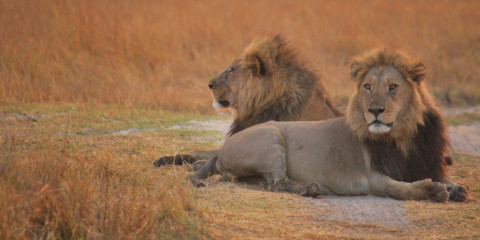
7-Day Okavango Mobile Camping Safari - Fully Serviced
$3,300 to $3,960 pp (USD)
Botswana: Shared tour (max 6 people per vehicle) Mid-range Camping
You Visit: Maun (Start) , Moremi GR (Okavango Delta) , Khwai (Okavango Delta) , Maun Airport (End)
Kingfisher Safaris
4.7 /5 – 51 Reviews
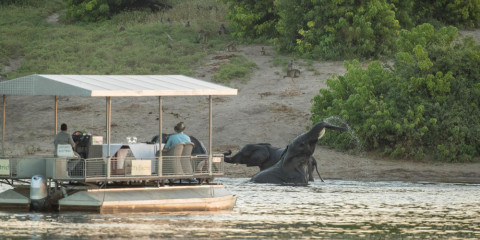
7-Day Chobe & Delta Fly-in
$4,080 pp (USD)
Botswana: Shared tour (max 6 people per vehicle) Luxury Lodge & Tented Camp
You Visit: Maun (Start) , Chobe NP, Okavango Delta, Maun (End)
4.7 /5 – 186 Reviews

5-Day Botswana Tour
$1,788 pp (USD)
Walking Stick Travel & Tours Tour operator has an office in Botswana
4.8 /5 – 73 Reviews

3-Day Okavango Delta Mokoro Safari Tour
$1,315 pp (USD)
Botswana: Private tour Mid-range Camping
Xaa Safaris Tour operator has an office in Botswana
4.6 /5 – 18 Reviews

10-Day Chronicles of Botswana
$10,395 pp (USD)
Botswana: Private tour Mid-range Lodge & Tented Camp
You Visit: Kasane (Start) , Chobe NP, Moremi GR (Okavango Delta) , Okavango Delta, Maun (End)
5.0 /5 – 6 Reviews
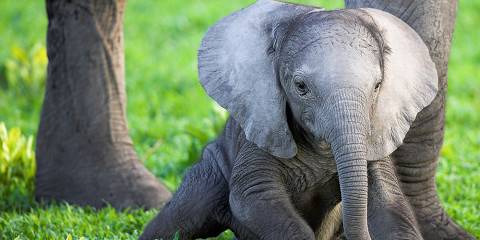
3-Day Moremi Game Reserve Trail
$1,155 pp (USD)
Botswana: Shared tour (max 8 people per vehicle) Budget Camping
You Visit: Maun (Start) , Moremi GR (Okavango Delta) , Maun (End)
Black Smooth Adventures Tour operator has an office in Botswana
5.0 /5 – 7 Reviews
Related Searches
- Botswana Safaris
- Okavango Delta Travel Agencies
- Okavango Delta From Maun
- Best Okavango Delta Safaris
- 4-Day Okavango Delta Tours
- 3-Day Okavango Delta Packages
- 2-Day Okavango Delta Itineraries
- Savuti Safari Tours
- Khama Rhino Safari Tours
- Linyanti Safari Tours
- Khwai Safari Tours
- Elephant Sands Safari Tours
8 Questions About Okavango Delta Safaris

Answered by
Anthony ham.

When is the best time to visit Okavango?
“As with so much of southern Africa, the high season for an Okavango safari runs from July to September or October. This is when you can expect high water levels but clear skies, making it easier both to see wildlife and to get around. From November to March or April, rain is always possible making trails muddy and rendering inaccessible some areas, especially in the Moremi Game Reserve. Not surprisingly, many lodges close at this time, especially from January to March. The flipside of this is that birding in these months can be exceptional, with migrating species in residence in their millions. May and June are certainly worth considering – the rains have come and gone, high season prices are yet to begin, and crowds are fewer. But as always with the Delta, this isn’t always true – a particularly heavy rainy season can mean that trails remain muddy, for example.”
What are the most accessible areas?
“Moremi Game Reserve is the most accessible corner of the Delta, especially for those who plan to arrive and explore in a 4WD as part of their Okavango tour. Except for during the January–March rainy season, when many trails become boggy and impassable, you can simply drive into and around the reserve, provided you have a high-clearance 4WD. Then again, it all depends on your definition of ‘inaccessible’. You can’t drive into some parts of the Delta at any time of the year, but you can fly, which makes the Delta actually easy to reach and explore. All you have to do is board a small plane in Maun or Kasane airport and fly to your lodge or tented camp. On most Okavango tours, once there, you’ll be driven around in a 4WD along trails that are open, or get around in a mokoro (wooden dugout canoe). Visiting in this way is obviously expensive, but is certainly easy to arrange if you have the funds.”
When does the Okavango Delta flooding take place?
“If you visit the Okavango Delta from November to April, you may wonder what all the fuss is about – water levels are generally low. That’s because the region has an extremely high evaporation rate and it’s not until May or June, six to eight months after rains have fallen hundreds of kilometers away in the Angolan Highlands, that the Delta again begins to fill. From May or June, the Delta’s waterways start to take shape, making it an ideal time to begin your Okavango safari. By July, water levels are at their highest, although they sometimes peak as late as September. In October, with punishingly hot temperatures and high evaporation rates, waters again begin to fall.”
What animals can I expect to see on safari in Okavango Delta?
“The Okavango Delta is home to all three of the Big Cats, although cheetahs tend to be more localized and generally are rarer. Large mammals such as elephants, buffalos, hippos, Nile crocodiles and, increasingly, rhinos, thrive out here, as do African wild dogs (almost a third of the continent’s African wild dogs are found in Moremi), spotted hyenas and all manner of weird-and-wonderful antelope species. Across the Delta, a staggering 200,000 large mammals roam; it is considered an important stronghold for the continent’s lions and elephants in particular. Throw in more than 450 bird species, around 2000 different types of plants and 65 species of fish and the Delta’s position as one of the most biodiverse places on the planet becomes even clearer.”
How do I get to and around the Okavango Delta?
“Apart from the Inner Delta, which has water year-round, many of the southern, northern and eastern sections of the Delta can be reached in a 4WD vehicle on any Okavango safari. That, of course, comes with an important caveat: water levels vary and accessibility can be different from one year to the next, and sometimes even from one month to the next. For the Inner Delta (and elsewhere in high-water years), the only access is by plane, and this is usually arranged as part of your Botswana tour – air routes using small planes connect the remote lodges and camps across the Delta, with most starting in Maun, although Kasane is also a possibility. Once there, mokoros (wooden dugout canoes) are a classic Okavango means of transport, enabling you to navigate the waterways that would otherwise be inaccessible. Most lodges and camps also offer safari drives in 4WD vehicles along trails close to your accommodation, although, again, their range can vary from year to year.”
What condition are the roads in within the Okavango Delta?
“I can’t think of a single paved road that lies within the boundaries of the Delta. Some of the main access roads, such as the one that runs from Shorobe (40km north of Maun) into the Moremi Game Reserve, are graded but are also sometimes deeply corrugated, and driving here will have you longing for the sandy or dirt roads that dominate the Delta proper. The condition of these ‘roads’ varies greatly, even to the extent that a track that was firm last year can become hard work and perilous the next. Either way, you always need a 4WD, preferably one with a high clearance, to travel by vehicle in the Delta. It is also worth remembering that some trails may, in some years, require you to cross waterways with your vehicle. Knowing which ones are safe to cross comes with experience, but first-timers should rely on local advice and a GPS unit with Tracks4Africa installed.”
Are mokoro (canoe) safaris offered year-round?
“As long as there’s water in the Delta, travelling by mokoro (wooden dugout canoe) will most likely be possible somewhere. Even when water levels are low, the Delta is not entirely dry land, so if there is access to a launching place close to where you’re staying, some form of mokoro trip should be possible. Of course, the distance you can travel and the likelihood of getting out on the water is far greater when water levels are high, possibly as early as May, but always from July through to September and possibly in October. One final comment about traveling by mokoro. It can be a wonderful experience, drifting slowly through the Delta with no noise but the slap of a paddle on the water and safe in the knowledge that your carbon footprint is close to zero. Birdwatching can be excellent from a mokoro, and you’ll often see hippos and elephants. But for any other wildlife, you’ll probably need to explore in a safari 4WD vehicle as it’s difficult to see anything else if you’re restricted to where the water can take you.”
What lodges or camps would you recommend for an Okavango safari?
“There are countless fabulous places to stay as part of Okavango safari packages and staying in a magnificent lodge in the Delta’s remote reaches is sure to be a highlight of any Botswana safari. Choosing one above the rest is fraught with peril – so many fine places to choose from! – but choose you must. The lodges operated by &Beyond are very high on my list of favorites, partly because friendly staff and personal service are something of a company trademark, but also because their lodges and tented camps make architectural statements. Wilderness Safaris, too, have an even larger portfolio of Delta camps, all high quality, well sited and professionally run. And then there’s Great Plains Conservation, with their world-class guides, uber-luxurious camps and astonishing attention to detail. Where these three companies also rise above the pack is in their commitment to social responsibility – all aim for high levels of sustainability, support numerous important conservation projects, and have planted deep roots in the lives of local communities.”
Okavango Delta Safari Reviews

Mark is a travel writer who grew up in Africa and has written over 700 titles for Condé Nast Traveller, Travel Africa, BBC Wildlife and others.
Africa's greatest waterborne safari venue!
I spent two weeks living on the Okavango Panhandle, near the point where the Okavango flows into Botswana from Namibia's Zambezi Region. I was working on a scientific study, collecting data on the Okavango's outrageous crocodiles. We would...
Full Review

Gemma authored several Lonely Planet guidebooks, including the guides to Africa, Kenya, Tanzania and South Africa.
One for the bucket list
The Okavango Delta thoroughly deserves its legendary status amongst safari destinations. The Okavango River, flowing in from Namibia, spreads out once across the border into Botswana into a labyrinth of channels, floodplains and islands....

You feel closer to nature than anywhere else by doing a walking safari. We felt very secure at all times with our guide, even when seeing animals very close, like giraffes, elephants, crocodiles and even lions (we saw two males eating a...

We have seen lions, buffaloes, lots (!) of elephants, warthogs, herds of antelopes (different species), hippos in the water and grazing, crocodiles, w wild nature. Mokoro trips and walking safari was exciting.

Great wildlife sightings (both predators and plains animals) and birdlife. Delta from the air is magical for photography, with sitatungas in the channel and same as kwando - focus of guiding on what we are there for - wildlife

A once in a lifetime trip that did not disappoint.
From the moment we arrived at Belmond Eagle Island Resort, we were made to feel like royalty. The entire staff greeted us at the entrance in song, followed by refreshments and tour. The accommodations redefine the term "glamping" with our...
TOP DESTINATIONS
- Kruger Park
Okavango Delta
- Serengeti National Park
- Victoria Falls
TOP COUNTRIES
- South Africa
TRAVEL DEALS
View All Travel Deals
SOUTHERN AFRICA
East africa, indian ocean islands, top experiences.
- Beach Holidays
- Family Safaris
- Honeymoon Safaris
- Desert Safaris
- Luxury Rail Safaris
- Multi-Generational Safaris
- Positive Impact Safaris
- Photographic Safaris
- Walking Safaris
WILDLIFE SAFARI
- Big Five Safaris
- Birding Safaris
- Gorilla Trekking Safaris
- Migration Safaris
- Mobile Camping Safaris
- Horseback Safaris
FEATURED EXPERIENCES
Comfort levels, property types.
- Tented Camps
- Boutique Hotels
Featured Safari Collections
- African Anthology
- Green Safaris
- Red Carnation
- Saruni Basecamp
GET TO KNOW US
- Meet The Team
- Pricing Explained
- Traveller Reviews
- Traveller Stories
- Why Book With Us?
- HerdTracker
- Safari Cost Calculator
- South Africa In 360
- Trusted Safari Partners
What are you looking for?
- Safaris & Tours
- Destinations
- Experiences
- Accommodations
- Why book with us?
Hello traveller!
It's in Cape Town now.
We're sorry. Our safari planners aren't available now. Our office hours are 08:00 - 19:00 (GMT+2).
Call us to speak to an experienced safari planner.
Alternatively, we recommend...
Schedule a phone or Zoom call with one of our safari planners
Complete our travel enquiry form to connect with a safari planner
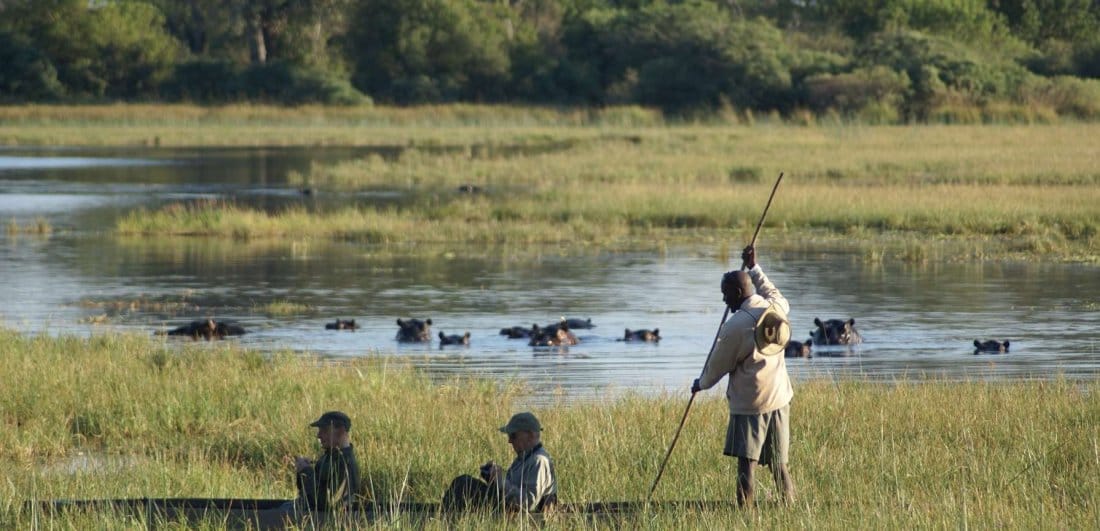
- Okavango Delta Safari
The ultimate guide to your next Okavango Delta Safari
Get to know okavango delta.

By Antoinette Booyse
Safari Travel Planner
The seasonal flooding of the Okavango River spills across the parched Kalahari landscape, producing a gigantic inland sea that is peppered with lush islands and brimming with wildlife
Each year, during Botswana’s long dry season, the Okavango River floodwaters arrive from the Angolan highlands and push the permanent Okavango Delta outwards into its seasonal floodplains.
The result is an enormous sprawling inland delta that is characterised by a mosaic of islands, shallow channels and fluctuating wetlands. Wildlife abounds in this verdant landscape. Aside from the Big Five – all of which occur here –visitors also stand an excellent chance of seeing African wild dogs, especially in the drier northern and eastern regions of the delta.
Okavango Delta Video
How it Works
View our recommended safaris for inspiration and get ready to plan your dream safari
Contact us or fill out an enquiry form and one of our travel experts will help you tailor make your perfect safari
Enjoy an authentic African experience, with peace of mind
Why Okavango Delta?
- Boasting some of the best wildlife viewing to be found anywhere in Africa
- Home to the Big Five as well as African wild dogs and a rich birdlife
- Scenically spectacular terrain (best appreciated from the air)
- The water element allows for boat cruises and mokoro [dugout canoe] safaris to explore the delta from a different perspective
Where to go in Okavango Delta
- Chiefs Island in Okavango Delta
- Maun in Okavango Delta
- Moremi Game Reserve in Okavango Delta
- Northern Okavango Delta
- Okavango Delta Panhandle
- Southern Okavango Delta
- Western Okavango Delta
Region Explained
Chief’s Island was once the private hunting ground of the local Chief Moremi, but was incorporated into the wider Moremi Game Reserve in 1976. Roughly 60km long and 10km wide, the island is only accessible by boat or, more usually, by light aircraft, to one of the very few high-end luxury lodges and mobile camps that operate on the island itself. Day boat trips and overnight boat safaris can also be arranged from Maun, but in general the island sees very low visitor numbers and is certainly Botswana’s most exclusive wildlife destination.
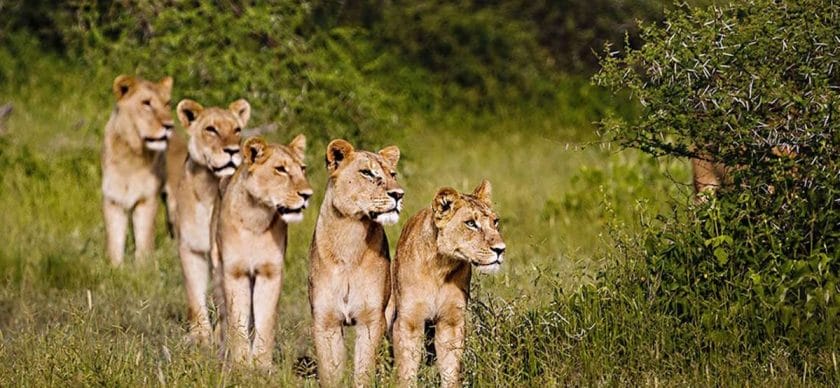
Rhino in the wild: Besides the small Khama Rhino Sanctuary in western Botswana, Chief’s Island is the only place in the country where you have a good chance of seeing rhino in the wild. Once common across Botswana they were completely wiped out by poaching, but were successfully reintroduced to central Moremi in the early 2000s.
Exclusive game viewing: Moremi is arguably Botswana’s best wildlife-viewing region, and Chief’s Island is undoubtedly the reserve’s most game-rich and exclusive area. It’s the only place in Botswana which supports all of the Big Five and excellent predator sightings are virtually guaranteed.
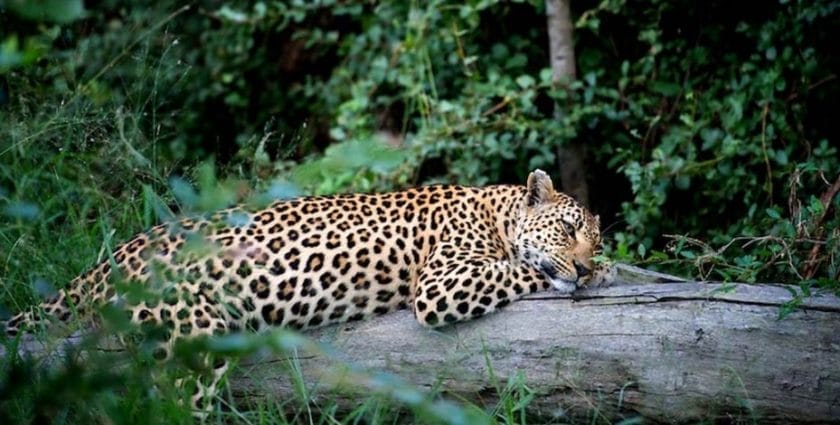
Practical Advice
Chief’s Island’s two main lodges are among the most luxurious in Africa, offering all-inclusive, fly-in safaris, usually transferring through Maun. Day or overnight boat trips from Maun are the more affordable option, but however you visit you’ll need to book well in advance. The island can be visited at any time of year, but May to August sees extensive flooding in some areas. This can be a wonderful time to visit Chief’s Island, but the focus shifts to boat and mokoro excursions instead of game vehicles and walking safaris.
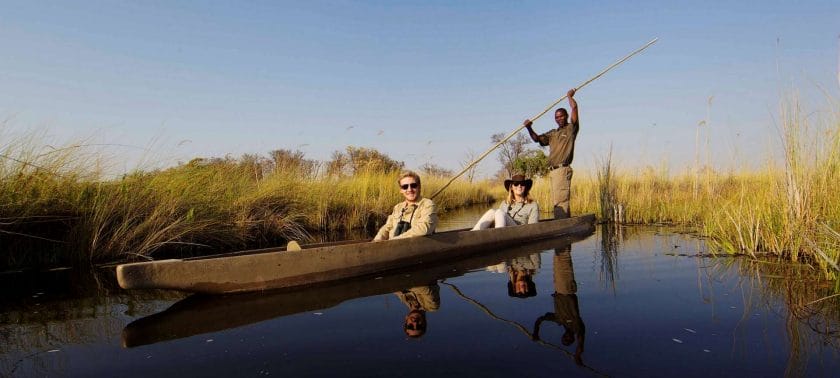
On the south-eastern edge of the Okavango Delta, straddling the banks of the Thamalakane River, the bustling frontier town of Maun serves as the gateway to northern Botswana. If you’re on a fly-in safari, you’ll likely not leave the airport, instead making a quick change of planes before winging off into the central Delta. Those arriving by vehicle, however, usually stay a night or two, replenishing supplies, making repairs, getting laundry done and so on. Maun has large shopping centres, garages, banks, bars and camping supply stores, serving not just the steady stream of 4×4 visitors, but the hundreds of lodges, hotels, campsites and safari tour operators that ply their trade in the region.

Flights over the Delta: The Okavango Delta is spectacular from above, and a flight over the Delta is highly recommended. A number of companies offer light aircraft and helicopter tours – with minimum flight time of 45 minutes. As is takes some minutes to get over the Delta properly, booking at least an hour is a good idea. Helicopters are more expensive, but the visibility – and photo opportunities – are much better.
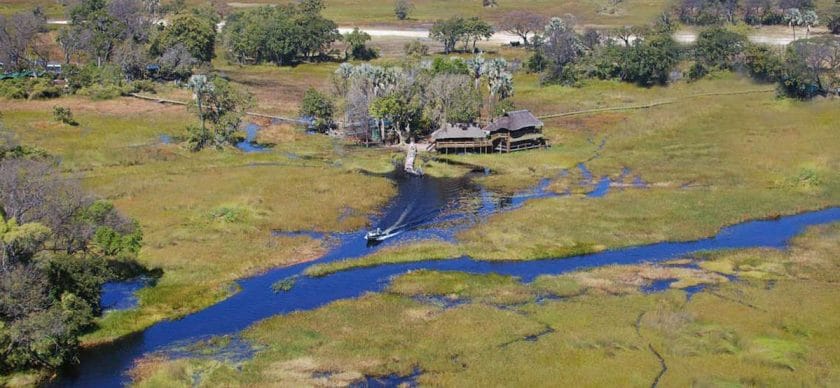
Mokoro trips: Mekoro (plural) are the Delta’s traditional dugout canoes and multi-day excursions can be arranged from Maun. If the water is high enough you’ll start with a speedboat transfer from Maun itself, otherwise a vehicle will drive you north of town to the launch site. Once into the Delta, local guides will pole you along, stopping at deserted, wild islands for a few unforgettable nights under the stars. Day trips can also be arranged, but it’s usually more practical to stick to the Thamalakane River – most river lodges have small motorboats for birding and sunset cruises.
Maun is a great place to head it you’re travelling solo – everyone passes through the town on their way north or south. It’s much more affordable booking group activities into the Delta and in Maun you’ll be able to join bigger tours and meet new people. All of Botswana’s major campsite and tour operators have offices in Maun and although it’s always a good idea to book in advance, last minute itinerary changes can be made in Maun in person (which is often much easier than by email or over the phone!). There’s not much safari-related that you can’t get done in Maun, from buying a new tent or camping chair to welding or major mechanical repairs. It’s also the last place to get fuel before the long drive north to Kasane.
Moremi Game Reserve covers the central and eastern edges of the Okavango Delta and is one of Botswana’s most famous parks. In the central region, dominated by Chief’s Island, a couple of beautiful luxury lodges provide fly-in safaris to one of the most pristine wildlife havens in the world. East of Chief’s Island, a roughly triangular wedge incorporates expansive mopani and riverine hardwood forests, open swamp grasslands, reed beds and waterways. This wedge of land provides the only public vehicle access into the Delta, with four main camping areas and a handful of private campsites and lodges.
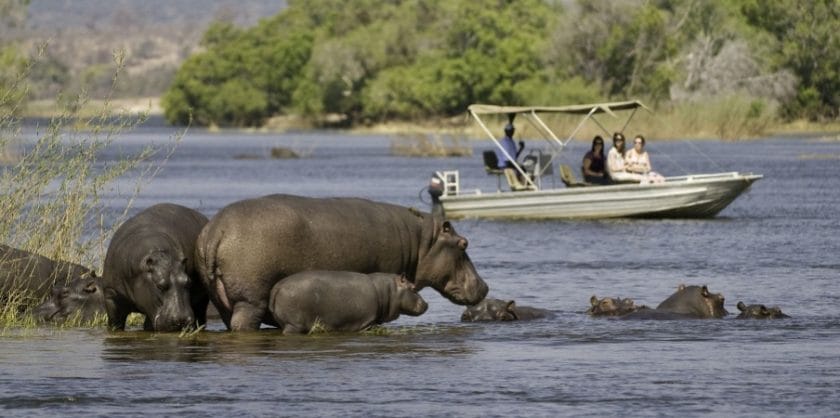
Fantastic fauna and flora: Moremi is arguably Botswana’s best wildlife region, with permanent water that attracts big game year-round. Over 1000 species of plants grow along the waterways and in the surrounding plains, which in turn are home to over 400 species of birds. All of Africa’s iconic megafauna can be found here, although rhino are concentrated on Chief’s Island where they can be more easily monitored and protected from poaching.
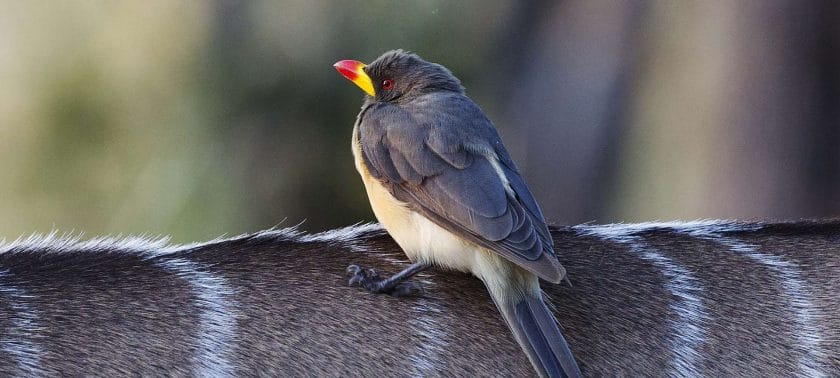
Boat trips into the Delta: Boat excursions can be arranged from the two main waterway campsites, Third Bridge and Xakanaxa, and there’s also a small boat station on the Mboma peninsular near Third Bridge. Both motorboat and mokoro trips are available – do both if you can, they’re equally special for different reasons. While mekoro are silent and peaceful (and with a knowledgeable guide a great way to learn about the waterways’ small plants and animals), the faster boats will get you out into the more distant lagoons, with the chance of seeing big game and large nesting bird colonies from the water.
Most visitors to Moremi’s eastern section arrive in their own 4×4 – and soon realised that the park’s roads are something of a challenge. In the dry season (roughly April to November), thick sand can make the going very slow, especially between Third Bridge and Xakanaxa. In July and August, however, is the Delta itself is at its fullest and roads along the waterways can flood completely. Once the rains begin in November/December many tracks clog up with mud. Some 4×4 experience is certainly a good idea and travelling in convoy is also highly recommended. Note that there’s no fuel at all between Maun and Kasane, and no shops either (although there’s a new small camp shop at Third Bridge). You need to be completely self-sufficient when visiting Moremi, and that includes your own supply of fresh drinking water. None of the public campsites are fenced and visitors are expected to be careful of wild animals at all times, and never to leave their campsite after dark.
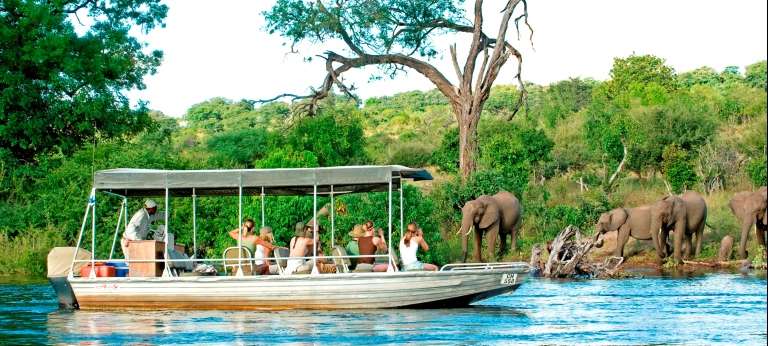
Outside of Moremi Game Reserve the Okavango Delta is divided into a number of unfenced concession areas, each managed by a local community or private safari operator. In north-western Botswana, the concessions are designated ‘NG’ – an acronym for the broader municipal area, known as Ngamiland. Along the Delta’s northern edge, you’ll find NG12, NG18, NG19, NG20, NG21, NG22 and NG23, each with their own lodges and tented camps, and offering a range of activities depending on their specific location, access to water, etc. NG19 is the most easterly and covered separately as the Khwai Community Concession – the rest run westwards, all the way to the Panhandle. On the whole, the concessions closer to the Panhandle receive more flood water and so have more opportunities for boat safaris, but each camp is uniquely situated, with those further back from the main channels focussing on walking safaris and game drives instead. This area offers some of the best wildlife viewing in the Delta, with more variety and greater numbers than in the south and west.
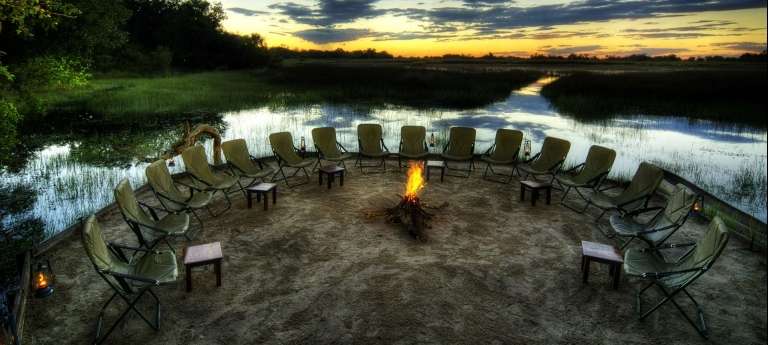
Walking safaris: The Okavango Delta is not especially well-known for walking safaris, but good walking conditions are possible, particularly in the Delta’s northern concessions. Here you’ll find a beautiful mix of lush floodplains and open woodland, and plenty of plains game as you explore back from the waterways.
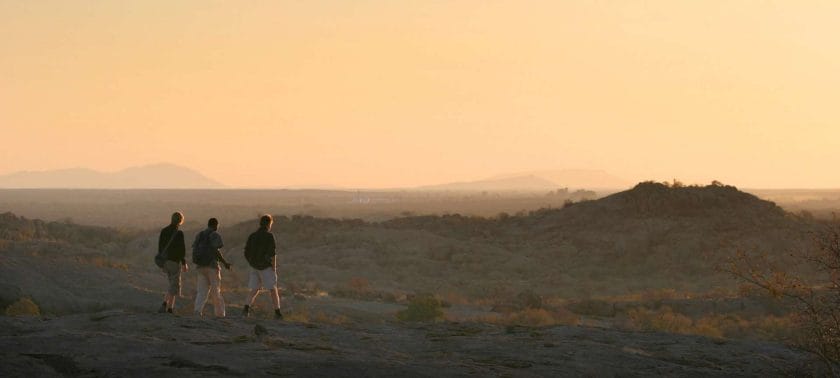
Boat safaris: Most camps in the northern concessions have good access to deep water, with fantastic opportunities to discover the Delta by motorboat. Mokoro (canoe) safaris are also usually possible, but motorboats allow quick access to a number of wonderful open lagoons. The north’s reed beds, twisting channels and scattered palm tree islands offer some of the most spectacular landscapes anywhere in the Delta.
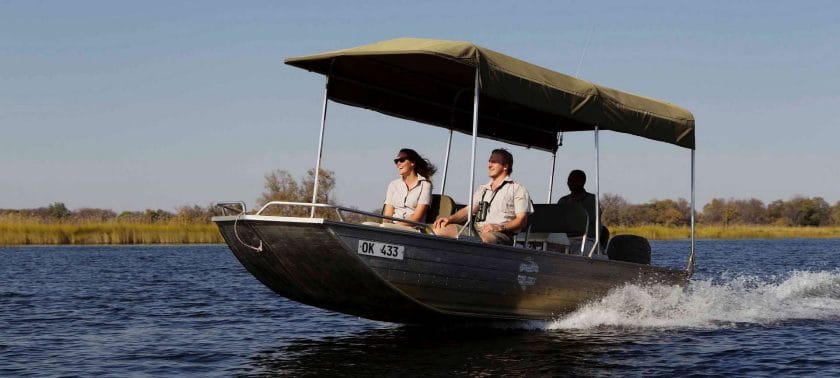
All the camps and lodges in the Delta’s northern concessions are extremely luxurious, with high season rates usually in excess of $1000 a person a night. Discounts of up to 50% are standard during the low season (December to March), but although there can still be some very fine days, rain and overcast conditions are the norm. Each camp offers its own specialist activities according to its location so be sure to check what’s available before you make your pick. May to August is the peak flood season and the best time to visit if you want to explore the Delta by boat. And April and May are best for photography, when the atmosphere is clearer after the end of the summer rains.
The Okavango Delta is fed by the Okavango River, which flows southeast from Angola, through Namibia’s Zambezi Region, and enters Botswana at the small border village of Mohembo. Here it spreads out into a strip roughly 11km wide, a thick green mass of twisting channels, dense papyrus and reed beds. This long, green ‘Panhandle’ continues for roughly 100km before fanning out into the Okavango Delta proper. Along its western edge you’ll find a number of self-drive safari and fishing camps and the area is, on the whole, much more low key and affordable than elsewhere in the Delta. Although there’s excellent fishing, good birding and plenty of crocs and hippos, the Panhandle is not known for big game and traditional wildlife safaris are not an option. However, unique to the area, are a selection of fully-crewed houseboats, ideal for larger groups looking to kick back on the water.
Fishing: Angling is undoubtedly the Panhandle’s biggest attraction and there’s good fishing to be had throughout the year. Catfish and bream are common in the area, but tigerfish are the main prize, especially between August and November. Tigers up to 10kg have been caught in the northern channels and just about every lodge and camp offers guided fishing trips to find them.
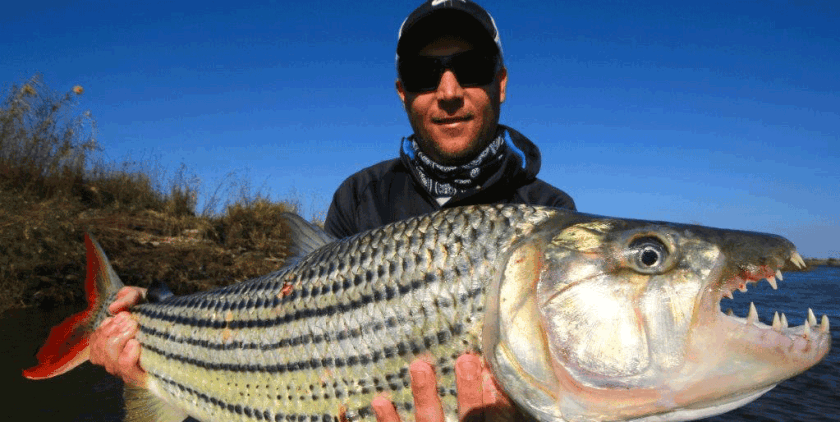
The annual catfish run: This part of the Okavango sees the annual catfish run when thousands of predatory catfish, some up to 1.5m in length, swarm up the channels as the water levels start to drop (roughly August to November). As they go they hunt smaller fish and are in turn hunted by birds and tigerfish – an incredible feeding frenzy that’s a sight to behold!
Unlike much of the Delta, the Panhandle is easily accessible, with a generally good, although in places badly potholed, tarmac road running along its western edge. Reaching some of the camps and lodges will still require a 4×4, however, as many of the access tracks are either extremely sandy or seasonally waterlogged. The eastern edge of the Panhandle is high-clearance only, with a single sandy track running south from Mohembo to Seronga. If you’re visiting the region a detour to the nearby Tsodilo Hills is recommended. It’s one of the world’s oldest inhabited sites, with archaeological evidence dating back 60,000 years.
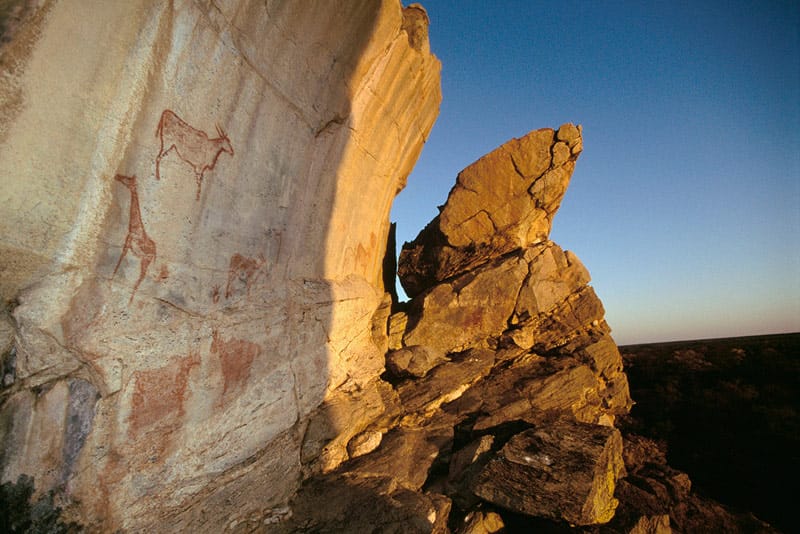
The southern Delta can be divided into six main concessions, three smaller regions to the north and three larger areas further south. To the north, NG27A, NG27B and NG31 are so far north they’re practically central, sitting just off Chief’s Island along Moremi Game Reserve’s fenced southern border. When the floodwaters arrive much of this area is underwater and the lodges and camps here are especially well known for their mokoro safaris. Beautiful riverine forest characterises the region, including giant water berry, fever berry, fig, sausage and baobab trees. Further south, the three larger concessions are NG29, NG30 and NG32. Although their northern sections can see good floodwaters, these sprawling reserves are on the whole far drier and the camps specialise in game drives and horseback safaris.
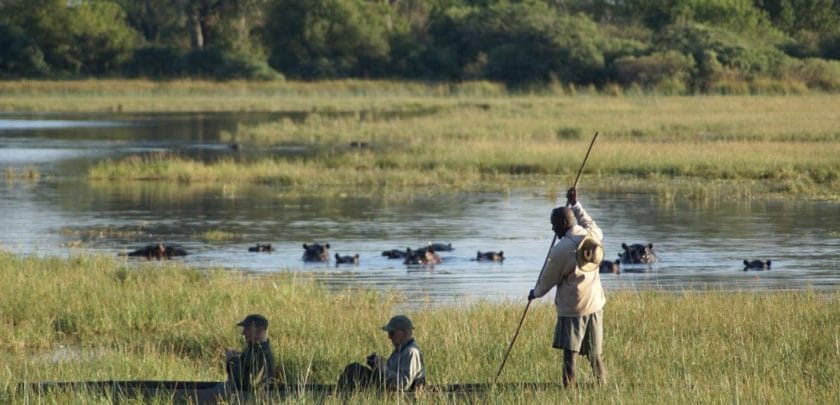
Horseback safaris: A multi-day horseback safari is a wonderful experience and a great way to get up close to plains game ‘on their terms’. For the most part wild antelope don’t see horses (and their riders) as a threat and it’s often possible to get much closer than on foot. Only very experienced riders are allowed, however, and you’ll need to be comfortable galloping out of any trouble!
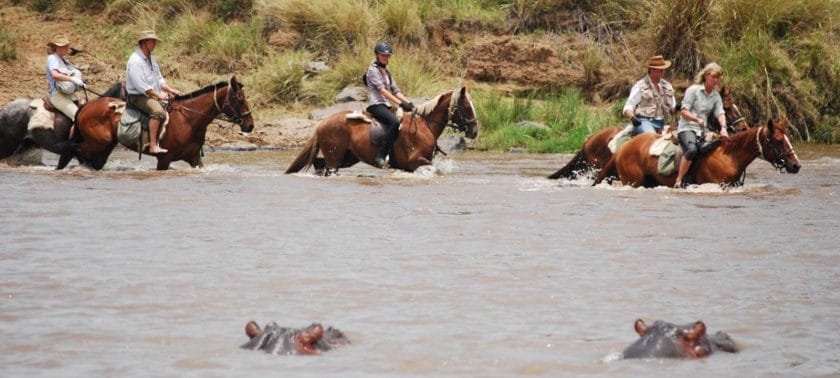
Mokoro trips: The Delta’s southern regions are best known for mokoro safaris, especially the three smaller concessions just south of Chief’s Island. Day trips are often combined with short island walks and while wildlife tends to be elusive in these wetter areas, the birdlife is excellent and the soft reflections and stunning, riverine landscapes make for some spectacular photo opportunities.
The annual flood usually arrives in April/May, rising first in the northwest, and lingering longest in the southeast. April to November is the best time to visit the area when the skies are clear and the floodwaters optimal for mokoro safaris. Although most of the southern lodges are extremely luxurious and exclusive, unlike the north there’s also a handful of more affordable mid-range camps. Significant discounts are available during the wet summer months (up to 50% off from December to March), but rain and overcast conditions are common during this period and despite the excellent birdlife it can be a bit miserable in a waterlogged mokoro.
Along the western edge of the Okavango, just below the Panhandle, the deep-water channels and surrounding floodplains are some of the most beautiful to be found anywhere in the Delta. Three main concession areas cover this stunning region and there are only a handful of exclusive camps and lodges. Concession NG24 is the most northerly and currently has no safari operation at all, while NG25 has half a dozen luxury camps and NG26, the most southerly, a couple more. Although the wildlife is not as diverse as in the concessions further east and north, elephant and lion are fairly common, as well as other smaller predators and antelope, including lechwe and sitatunga which are regularly seen. This is also an excellent area for water birds, and in the southwest, slightly back from the waterways, horseback safaris are also possible.
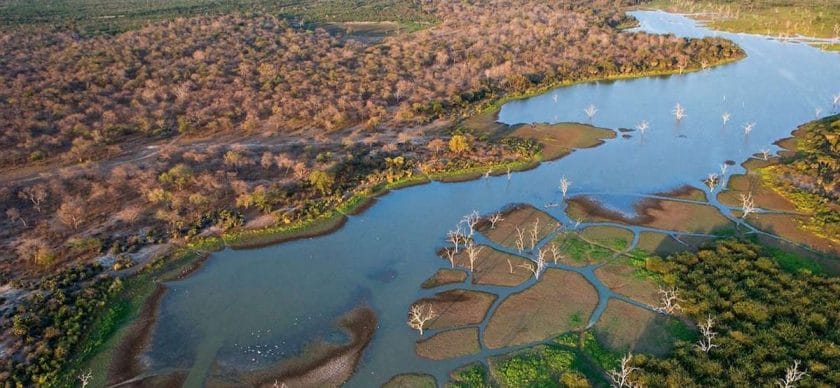
Water-based activities: The more northerly camps have excellent access to the deep-water channels and motorboat and mokoro excursions are the norm. Boat-based bird-watching is popular and ‘catch and release’ fishing trips can also be arranged – look out for the annual catfish run which occurs between August and November.
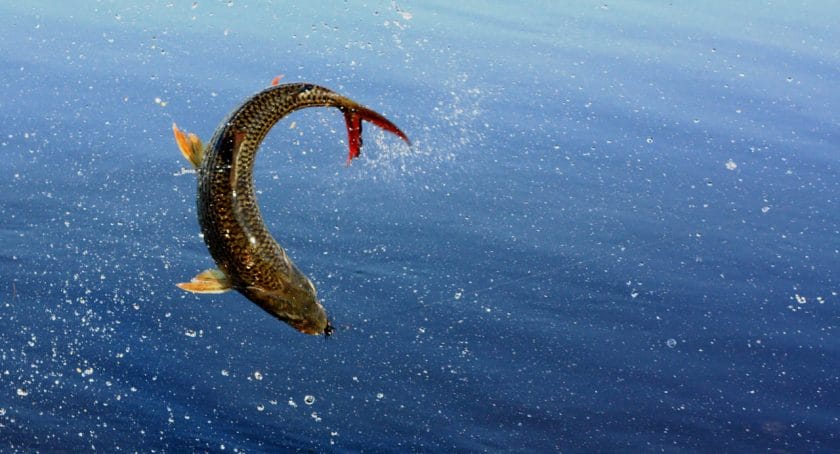
Walking with elephants: Until recently elephant-backed safaris were still possible in this part of the Delta, but these have been phased out in favour of bush walks alongside the elephants and interacting with them from the ground.
The floodwaters arrive earlier here than further east in the Delta, and tend to subside earlier too so timing is important. April to November is broadly the best period to visit, but come later in the season (from September, when the water levels are lower) for horseback safaris and general wildlife viewing. That said, the camps and lodges nearer the Panhandle have good water access and offer water-based activities year-round. A few are among the most luxurious in the Okavango, but there are one or two midrange options as well and, as is common practice throughout the Delta, there are substantial discounts during the rainy summer months (January to March).
Travel with Confidence
With over 20 years of experience, our team will help you choose the perfect african safari for your adventure., 24/7 support, personalized, popular okavango delta safaris, these recommended tours for okavango delta can be tailor-made to match your budget..
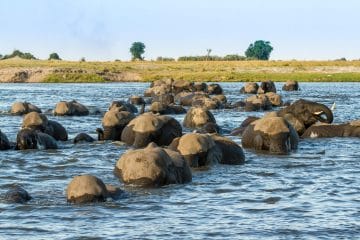
Victoria Falls, Chobe and Moremi Affordable Safari
Southern Africa Zimbabwe Victoria Falls Botswana Chobe Okavango Delta
From $ 3200 /USD
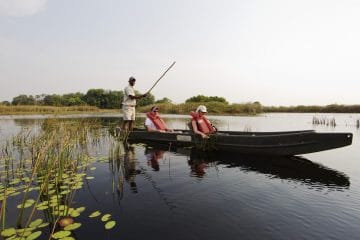
Popular Botswana Safari Through the Delta
Botswana Okavango Delta
From $ 3140 /USD
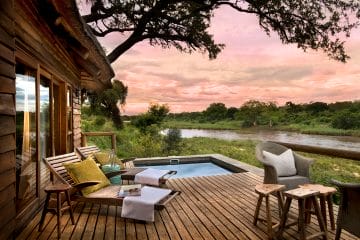
Best of South Africa and Botswana Safari
Southern Africa South Africa Cape Town Kruger National Park Johannesburg Botswana
From $ 7450 /USD
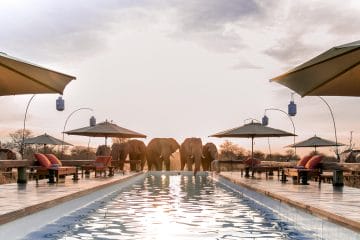
Botswana Redefined - A Slow Safari Concept
Botswana Okavango Delta Kalahari Desert
From $ 6700 /USD
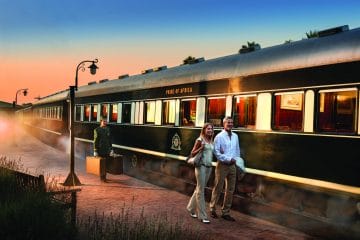
Luxury Train Journey to Victoria Falls and Okav...
Southern Africa South Africa Johannesburg Zimbabwe Hwange Victoria Falls
From $ 7700 /USD
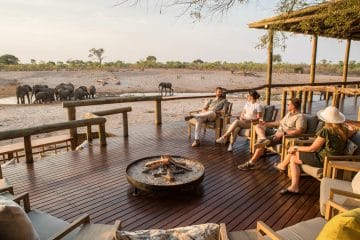
Wonderful Botswana “Relais & Chateaux“ Safari
Botswana Selinda Game Reserve Okavango Delta
From $ 8180 /USD
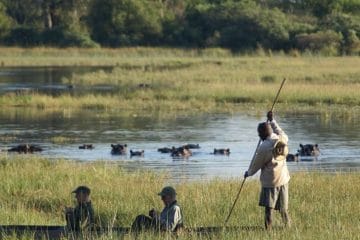
36 Okavango Delta Safaris to choose from
Stay for 5 - 18 days
Experience our Tailor-made Tours in Okavango Delta
When is the best month to travel to okavango delta.
- Okavango Delta in January
January is the Okavango Delta’s wettest month, with regular spectacular thunderstorms that usually arrive in the late afternoon. Mornings in January often begin bright and clear, turn suddenly violent and then clear again overnight. It’s rare in the Okavango to see consecutive days of persistent rain, but in January and February there’s always that chance. In general, however, you can expect brief, heavy downpours with a few days of partly-cloudy weather mixed in between. The northern concessions and Panhandle tend to see the biggest storms, but it’s impossible to be precise except to say that some rain will fall. Daytime temperatures in January average over 30°C (86°F), and can climb above 36°C (97°F) when the sun comes out. Night-time minimums are seldom below 20°C (68°F) and humidity is high all across the Delta.
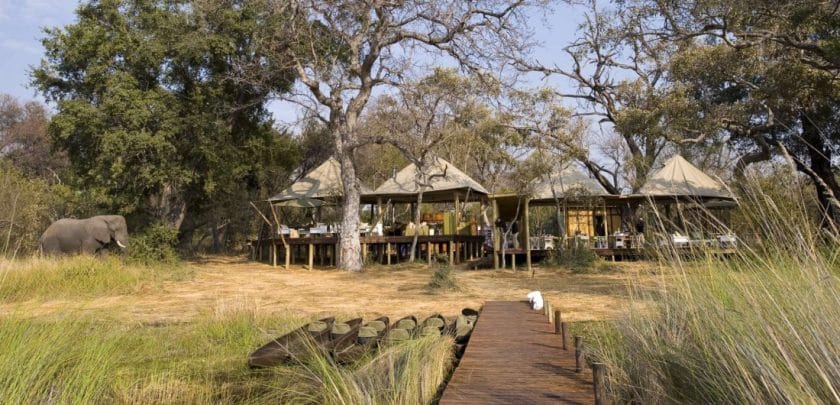
Best Regions in January
Although the rains are at their peak, the Delta floodwaters have yet to arrive and January sees some of the lowest water levels across the Okavango. Motorboat and, especially, mokoro trips may not be possible in certain areas and only lodges with deep-water access are able to offer water-based activities. In fact, most Okavango Delta lodges used to close completely during January, but many now stay open year-round, offering motorboat transfers to the deeper channels or more traditional land-based activities such as walking safaris and game drives. Driving, however, can be difficult at this time of year as the heavy rains turn the dirt tracks to mud. Moremi Game Reserve is especially notorious and although off-roading in the mud can be fun, some experience is required and it’s essential to travel with more than one vehicle.
Highlights: Because of the rain, January is seldom recommended as the best month in the Okavango, but nevertheless it is a beautiful time to visit. The birdlife is excellent and the Delta comes alive with their song – it seems there’s always something calling out, throughout the day and deep into the night. As so few people visit during January the camps and lodges also tend to be very quiet. Guests are treated to an even more intimate experience than usual, with the added benefit of significant discounts – as much as 50% off the standard rates.
Disadvantages: The major disadvantage in January is the rain. Some rain will almost certainly fall, but if you get unlucky a whole week may be drowned out. January is also not the best time for water-based activities – not just because of the weather, but for the low water levels too. If you visit in January, then keep your expectations realistic. If you go for the overall ambiance you won’t be disappointed.
- Okavango Delta in February
February is another wet month in the Okavango Delta, but like January, the rain and clouds are usually interspersed with a few fine, bright days. These summer months are always highly unpredictable however – there may be sunshine for over a week and then four or five days straight of cloud and afternoon storms. A thunderstorm over the Delta is one of Southern Africa’s most awe-inspiring sights: incredible towering clouds and sudden jagged lightning; reflections bouncing off the water towards the wild, distant horizon. It’s almost worth the risk of a rained-out safari, which is always a possibility, even though persistent rain is unusual. When the clouds do clear, the temperature can easily hit 36°C (97°F), though it’s typically closer to 30°C (86°F), and around 20°C (68°F) at night.
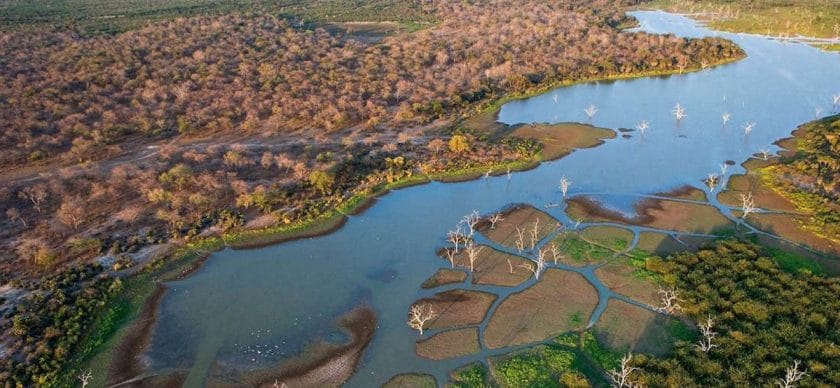
Where to Go
In Moremi Game Reserve, and all around the Delta, the frequent heavy downpours take their toll on the dirt roads. February is perhaps the muddiest month in Moremi and you’ll need two or more vehicles in case one gets stuck. If the rains have come early, the Panhandle may already be filling as the first surge of floodwater pours down from Angola. The rest of the Okavango will still be very low, however, and water-based activities may not yet be available further east. Lodges on the deeper channels – in the central Delta and northwest – can be great for birding at this time of year. Many species will be in their breeding plumage and the reed beds and vegetation in general is at its verdant best.
Travel Tips
Highlights: February is not known as a great time to see predators, but just because it’s raining they don’t disappear. The thicker vegetation tends to make animals harder to spot, but when you do see them the lush bush and stormy backdrops can make for some wonderful and unusual photographs. Like January, February is usually fairly quiet in terms of visitors, despite many lodges offering up to 50% off their usual rates.
Disadvantages: Although the vegetation is at its greenest and most beautiful, the birdlife at its best, and the herbivores well-grazed and in excellent condition, the risk of rain still keeps many people away. With water levels still at their lowest across most of the Okavango, water-based activities are also not always possible and the dirt roads everywhere are at their muddiest at this time of year.
- Okavango Delta in March
March is a transition period in the Okavango Delta and although it can still see some heavy rain, the change in seasons is usually apparent by the end of the month. This is most obvious in the gradual drop in night-time temperatures, down to 15°C (59°F) on the coldest mornings. Daily highs, however, are slower to move – 30°C (86°F) to 35°C (95°F) remains the norm until well into April. Although the chance of rain is still high, the risk of consecutive overcast days is much lower than in January and February. It’s still a risky period to visit the Okavango, but as the humidity drops so does the threat of a rained-out safari and late March can see some of the year’s clearest, most pleasant nights around the campfire.
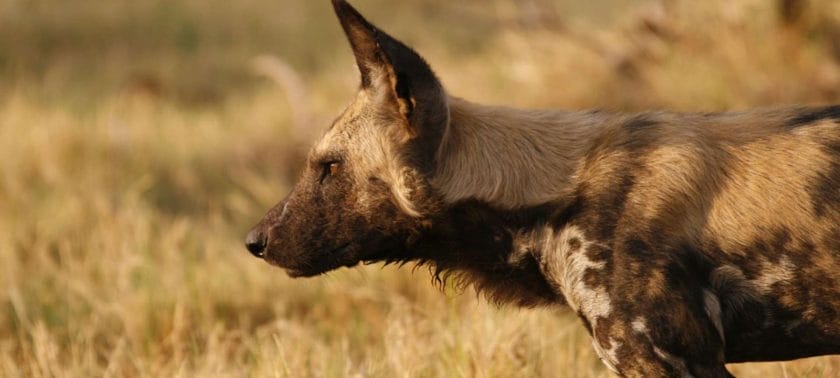
By March, the floodwaters are usually in full flow down the Panhandle and it’s not a great time for fishing while the channels are turbulent and muddy. Further south and east the flood can take another month to reach the central Delta, but the lodges in the northwest can be excellent at this time of year. Exploring the northwest Delta by motorboat or mokoro is wonderful in any season, but March can be particularly special. It’s the last month before many migrant birds return north, the vegetation is lush and green, and the channels are slowly rising and changing with the coming of the flood. Across the rest of the Okavango, conditions are rather more hit and miss. Water-based activities will still be hampered by low water levels further east, but the increasingly sunny days and clear, rain-washed atmosphere produces some beautiful landscapes, dotted with well-fed, healthy animals.
Highlights: Although there’ll still be some rain, the weather in March can be gorgeous. And with many lodges still offering up to 50% off, it’s not a bad time to take a gamble. Those who do visit in March will find the Delta lush and vibrant, full of migrant birds and fat antelope, under steadily clearing, deep blue skies.
Disadvantages: March is the last month until November that sees significant rain, and water-based activities in the eastern Delta won’t be at their best until the flood arrives in May/June. Driving off road remains a challenge until the rains abate in April, and the roads through Moremi are still little more than a succession of muddy pools.
- Okavango Delta in April
Throughout April the autumn gradually sets in, and cooler, drier weather steadily creeps across the Delta. As with March it’s the nights that cool more rapidly than the days. The coldest evenings can drop to around 12°C (54°F), but daytime highs are usually still over 30°C (86°F). Although the first few weeks of April may see some scattered showers, clearer skies are more and more common and the clouds all but vanish by the end of the month. April is a wonderful time to be in the Okavango Delta, with moderate to warm temperatures, little chance of rain, and the opportunity to see the flood work its magic as the waters fan out into the central and northern regions.
April is a beautiful month to be anywhere in the Okavango, with fresh, rain-washed skies dotted here and there with fluffy clouds. It’s a magnificent time to be out on the water, and motorboat and mokoro trips are at their best in the north and west. It will take another month or two before the waters filter east, but lodges on the deeper channels should have good boating conditions. In the Panhandle, anglers can start casting for bream (tilapia), but the best fishing is usually later in the year. April marks the start of the antelope breeding season and the shallow floodplains on the Delta’s fringes come alive with competing males. Across the Okavango all life seems to thrive, with tall, green grass and fruit-laden trees as far as the eye can see.
Highlights: April is a magnificent month for photography and an idyllic time for mokoro trips under crisp, white clouds. The Okavango is glorious as the floodwaters rise, full of life and energy before the dry season begins.
Disadvantages: The eastern concessions still have low water in April and water-based activities may be limited away from the deep channels. In Moremi the roads usually dry out quite quickly, but it can still be very muddy at the beginning of the month. On the whole, there are few disadvantages of visiting the Okavango in April, although predator sightings tend to be better later in the year once the vegetation thins out.
- Okavango Delta in May
As May unfolds, the Okavango Delta gets cooler and the bright, cloudless days begin to dip below 30°C (86°F). Along the rapidly filling waterways the nights tend to be milder, but on the open plains away from the channels it may drop as low as 5°C (50°F). It’s safe to say that no rain ever falls in May and you’ll seldom see more than the odd wisp of cloud. The deep blue sky remains crisp and clear, not yet as dusty as it can get later in the year.
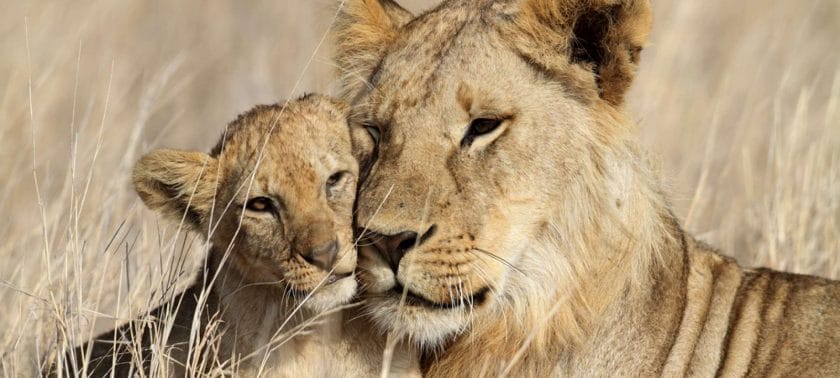
As surface water evaporates on the surrounding Kalahari plains, more and more animals are drawn to the Okavango’s rising floodwaters. This is especially true along the Delta’s northern concessions which attract elephant and plains game from the increasingly dry Chobe and Linyanti regions. If your primary goal is wildlife – especially lion and other predators – then the northern concessions and Khwai region are a good choice this early in the season, as is Chief’s Island which has excellent game year-round. In general, however, May is prime time across the Okavango, an excellent mix of rising water levels and drying grasslands, when the wildlife gathers along the Delta’s deepening pools, and there’s still plenty to eat around the floodplains. By late May the elevated water levels allow extensive motorboat and mokoro activities and the early mornings aren’t yet as cold as they can get in June and July.
Highlights: Those who visit the Okavango Delta regularly often cite May as their favourite month. It’s true that predator sightings are not as prolific as later in the season (September and October are usually best), but May brings its own rewards. Moderate temperatures, clear blue skies, rising floodwaters and an abundance of well-fed, healthy herbivores all combine to make the Okavango particularly special in May.
Disadvantages: If you’re desperate to see predators, then your chances are slightly better later in the year, when the vegetation is drier and thinner and the animals easier to spot. That said, most lodges and camps have very experienced trackers and guides and although wildlife sightings are never guaranteed, they’re usually able to find animals for their guests in just about any season.
- Okavango Delta in June
June is mid-winter in the Okavango Delta and one of the coldest, driest months of the year. Daily average temperatures are around 25°C (77°F), although some hot days will still get up to 30°C (86°F). It’s the nights, however, that can get particularly cold – close to freezing at times, but more usually around 5°C (41°F). Early morning excursions can be very chilly in the wind, especially on motorboats and open game drive vehicles. June marks the start of the hard, dry winter season – after two months without rain, the Kalahari vegetation is thinning fast. There’s more pressure on the animals as they cluster closer to the waterways, which are now nearing maximum levels as the flood moves further east.
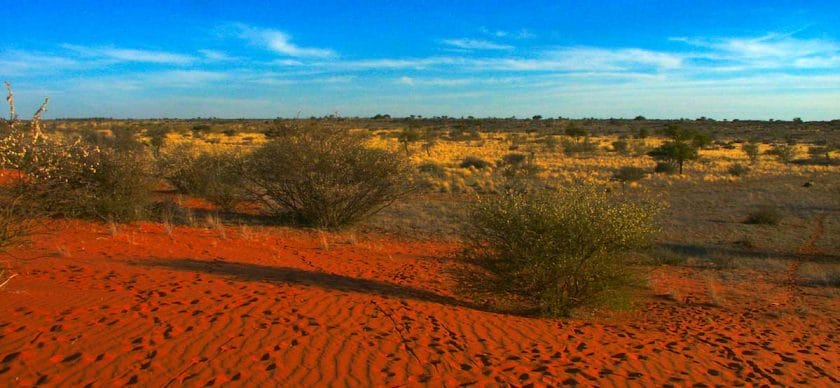
Best Regions
The Delta’s south-eastern fringes are the last to see floodwaters, but by the middle of June they have usually arrived. By now there’s good, deep water across the Okavango, a magnet for wildlife from all over the Kalahari. It’s hard to single out any one region in June – it’s a very special time to be anywhere on the Delta. Those looking for predators and large plains game should perhaps still head to the northern concessions, but wildlife concentrations are increasing everywhere. The central Delta is always excellent, but with the floodwaters now at their highest, mokoro and motorboat excursions can depart directly from many of the lodges, which raised up on stilts seem to hover magically over the water.
Highlights: By June the thinning vegetation makes predator spotting easier and all manner of activities are possible across the Delta. June is an excellent time to visit the Okavango, especially if you want to try a mix of water and land-based activities.
Disadvantages: June is a popular month in the Okavango Delta and you’ll need to book your safari fairly far in advance. Most lodges and camps are small and intimate, however, and are spaced well enough apart that it never feels crowded.
- Okavango Delta in July
July is the coldest month in the Okavango Delta, with daytime highs around 25°C (77°F). Although the days are mild, the nights cool quickly, dropping close to freezing on a few mornings each year. By now the annual flood has percolated across the Delta, and water levels usually reach their peak around the end of the month. Even lodges quite far from the main central channels can now offer mokoro trips through the submerged floodplains. July is another clear, dry month in the northern Kalahari, the third straight month without a drop of rain. The Delta is therefore an increasingly important source of water and attracts thousands of animals from the surrounding plains.
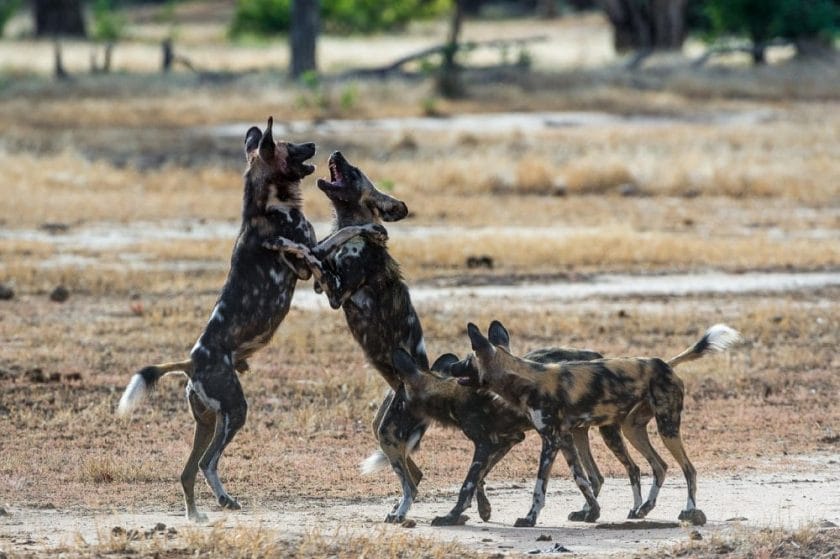
The Okavango’s peak season begins in July and there’s no one region that stands out from another. Water-based activities are possible nearly everywhere and the thinning vegetation makes wildlife spotting ever easier. Along the Delta’s northern fringe, elephant and buffalo gather in numbers, but large herds can also be found to the east and south. If this is your first and perhaps only visit to the Okavango, then July and August are perhaps the best months to arrive. Although September and October are arguably even better for game viewing, July’s high floodwaters are particularly special and the surrounding forests and grasslands still retain some of their summer green.
Highlights: July to October is a good time to see African wild dogs, especially in the northern concessions and along the Khwai River. Now is the time to see the Delta at its fullest as it spills its main channels into the Kalahari sand.
Disadvantages: July to October is the Delta’s busiest period and the camps and lodges charge peak season rates. Mornings in the Delta can get very chilly in July so be sure to pack warm clothes for early morning boat trips and game drives.
- Okavango Delta in August
Temperatures climb steadily through August and daytime highs once again top 30°C (86°F). At the beginning of the month the mornings can still be close to freezing, but lows of 10°C (50°F) are more common as September approaches. By August no rain has fallen in the northern Kalahari for at least four months and the only fresh grazing is along the Delta’s flooded waterways. Predator and prey alike are forced to gather along the fringes and wildlife viewing is excellent all over the Okavango.
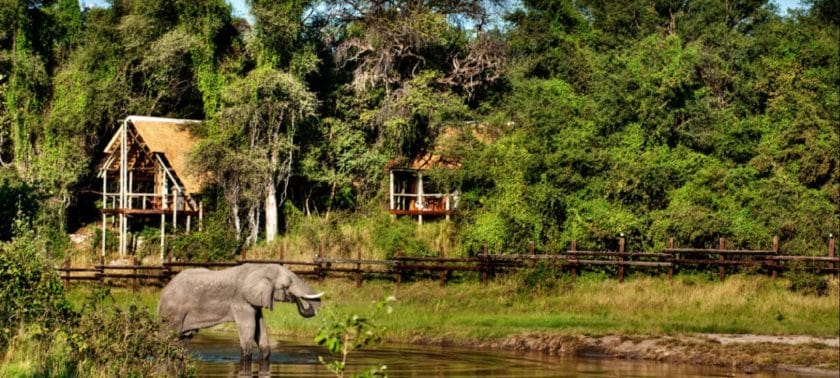
August is an ideal month to be anywhere on the Delta, so pick your region based on what you’d most like to see or do. In the Panhandle and western concessions, the floodwaters begin their slow withdrawal, sparking the annual catfish run and heralding the start of prime tigerfish angling season. Along the northern Okavango, the game viewing is excellent as large numbers of herbivores gather along the waterways. Predators, especially lion, leopard and African wild dog are regularly sighted during this period. In Moremi Game Reserve, the wildlife viewing is also superb and boating trips are at their best with the high floodwaters. These have now reached as far southeast as Maun, allowing motorboat excursions up the Thamalakane River and into the Delta. In the southern concessions, horseback safaris are ideal in August, while the weather is still relatively cool and the vegetation thin and easier to negotiate.
Highlights: August is known as a great month for wildlife and the game viewing only improves as the dry season continues. Like July, August is ideal for first-time visitors, when both water and land-based activities are possible nearly everywhere. Keen birders should head to Moremi’s Gcodikwe Lagoon as thousands of herons, storks and egrets arrive and start building their nests. And, even if you’re not interested in fishing, the catfish run is impressive – a roiling feeding frenzy that whips up the main channels and attracts a number of opportunistic predators and fishing birds.
Disadvantages: The only disadvantage of visiting the Okavango in August is that it’s peak season and the camps and lodges charge their highest rates. It’s also one of the most popular times to visit the Delta and bookings need to be made far in advance.
- Okavango Delta in September
The long, dry winter continues into September and by now there’s been no rain for about five straight months. The Okavango Delta is now an essential source of grazing and water, and as the annual flood gradually recedes, the pressure builds and competition increases along its drying waterways. Both night and daytime temperatures rapidly increase, averaging 15°C (59°F) to 35°C (95°F), with some hot days up to 40°C (104°F). The shallow pools and floodplains evaporate quickly in the heat and the surrounding vegetation thins out even further, with the only strips of greenery sitting tight against the channels.
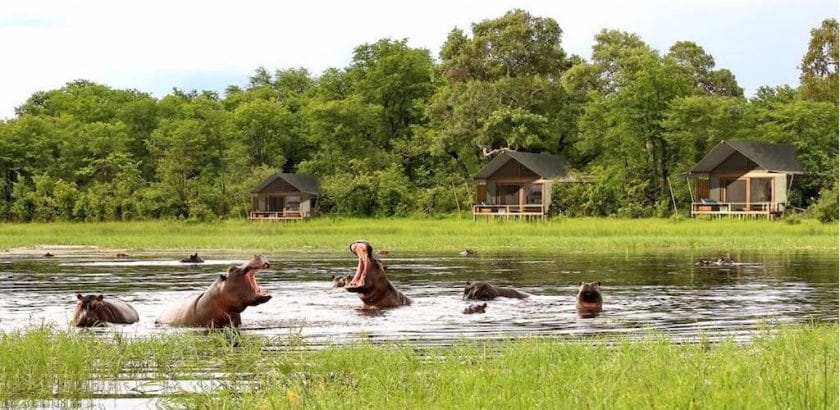
The floodwaters recede in the northern and western regions first, triggering the annual catfish run which starts in the Panhandle and spreads southeast. It’s a wild feeding frenzy that’s a sight to behold and well worth a visit even if you’re not interested in fishing. For those who are keen anglers it’s an ideal time for tigerfish and many come to the Panhandle specifically for this reason. Elsewhere in the Delta, September is one of the best months for wildlife viewing and a good time for walks in the northern concessions and horseback safaris in the south. As the month progresses, the ebbing flood can have an impact on mokoro trips. The southwestern regions tend to dry up first so head north and east for the best conditions.
Highlights: As the shallower waterways slowly dry up, they strand thousands of fish in ever decreasing pools. These attract hundreds of storks, herons and birds of prey, who squabble among themselves over the easy meal. September and October are traditionally the best months for predators, which are much easier to spot through the now very dry vegetation. Both predators and prey congregate on the channels, the only source of water for miles in any direction.
Disadvantages: September is still peak season, which means peak rates across the Okavango, and bookings need to be secured up to a year in advance. It also gets quite hot and dusty by the end of the month and boating and mokoro safaris may not be optimal along the Delta’s fringes.
- Okavango Delta in October
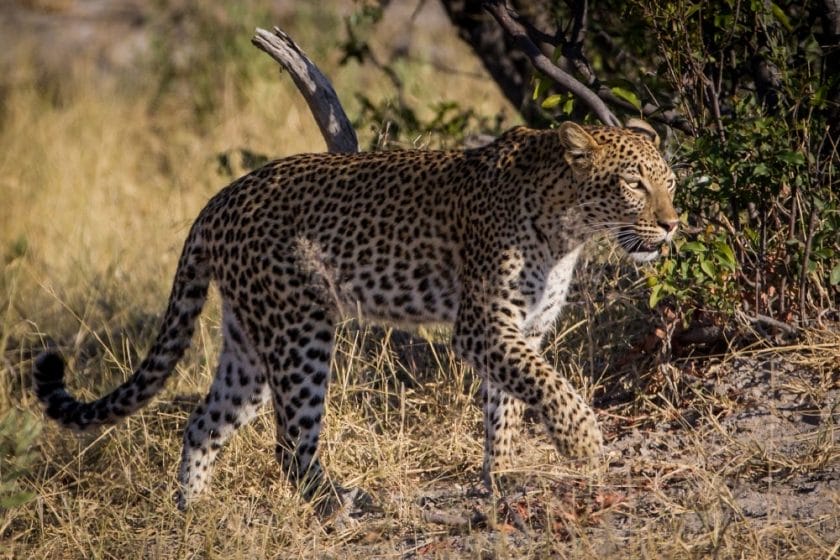
October is an excellent month for fishing along the Panhandle, especially for tigerfish as they hunt the deeper channels. Along the Delta’s northern waterways, and especially around Khwai, the waters tend to linger longer, attracting thousands of thirsty elephants. Wildlife viewing is at its best in October and it’s the perfect time of the year for spotting predators all over the Delta. For water-based activities, however, conditions vary from year to year, depending on the strength and timing of the floods. On the whole the eastern and north-eastern Delta tends to have good deep water throughout October and the heron rookeries of Gcodikwe Lagoon are teeming with birdlife. That said, any lodge or camp that lies near the deeper channels will offer boating activities even if a vehicle transfer is required.
Highlights: Predator spotting is undoubtedly the main highlight in October and the birdlife is also excellent around the deeper lagoons. Hot, exciting wildlife-filled days become long, warm nights, chatting around the campfire. Visit in October for the best chance of unforgettable encounters, and plenty of stores to tell when you get back home.
Disadvantages: Although October is perhaps the best month for wildlife (and especially predators), the receding flood waters do change the Delta’s ambiance. Many lodges will now be quite far back from the water, and miss that special magic that comes with floating above the flood.
- Okavango Delta in November
Early November is usually hot and stifling as the Okavango holds its breath for the coming of the rains. The exact start date varies considerably from year to year, but when the clouds do break the relief is palpable. Although daily highs of over 40°C (104°F) are the norm at the beginning of the month, the temperature gradually drops as the rains become more frequent. Localised showers evolve quickly into massive afternoon storms, with thunder and lightning flashing across the Delta.
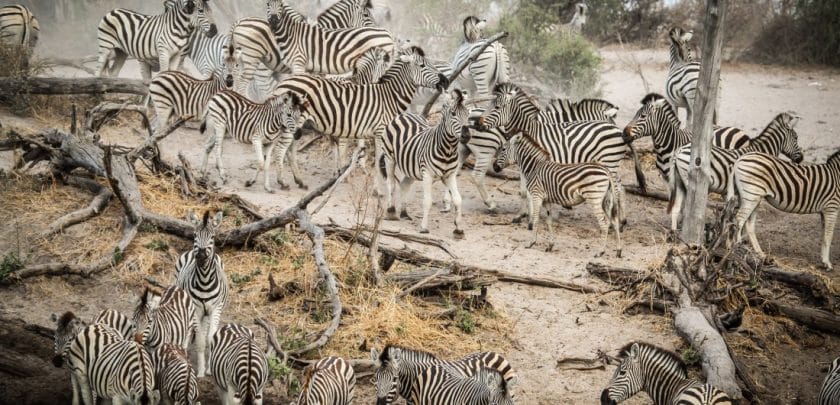
It’s impossible to say where the rains will fall first, or whether they’ll even arrive at all. Some years some areas may not see significant rainfall until December and until that happens game viewing continues to be excellent. The Khwai River, in the northeast, has good water year-round, and wildlife, especially elephants, tend to congregate along its banks late into the dry season. Chief’s Island has permanent game and good, deep-water access as well, as does the rest of the central Delta and the north-western concessions. When the rains do arrive, the pressure is released and the animals start to move back into the surrounding bush. November is an interesting time to be anywhere in the Delta as the animals and plants begin to recover from more than half a year without rainfall.
Highlights: Once the rains arrive, the antelope birthing season begins, and all over the Delta there are new signs of life. Many lodges and camps offer shoulder season prices, and it’s an excellent time to get a good deal before the rainy season starts in earnest in December.
Disadvantages: November is an unpredictable month weather-wise and if the rains arrive early your safari may be washed out. The wildlife may also begin to disperse, although sightings – especially of newborns – are usually still very good until the end of the month.
- Okavango Delta in December
December marks the start of the rainy season proper. It’s the second wettest month of the year and afternoon thunderstorms become increasingly regular and violent. As the rains intensify the dusty atmosphere clears and between the storms the skies are bright and fresh. The usual pattern is a few days of cloud and rain, followed by another few days of hot, sunny weather. This builds and builds until the next storm breaks and as the month progresses the gaps between storms lessen. It’s unusual to have more than two or three days without sunshine, but if two storm systems run into each other there may be persistent cloud cover for over week. When the sun does come out, temperatures can rise to 40°C (104°F), although the rains cool things somewhat and the December average across the Delta is around 33°C (91°F).
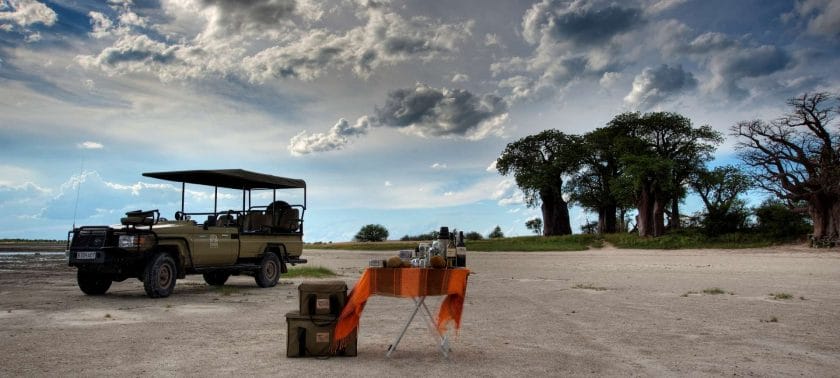
As the rains fill the Kalahari’s seasonal pans and pools, the herbivores begin to disperse from the Delta. With surface water now more readily available they can roam further afield in search of fresh grazing. New buds and shoots are appearing everywhere and the riverine forests and surrounding plains teem with life. Although still a good time of year for game viewing, the early rainy season is not ideal for motorboat and mokoro trips. You may get lucky with a few bright days, but it could just as likely be overcast and raining, and the Okavango water levels are also very low. The central, northern and north-western lodges will have the best access to deep water, but if you’re especially interested in water-based activities, it’s best to visit the Okavango between May and August.
Highlights: December is all about the rejuvenation of the bush, a brief, stormy springtime after months of heat and dust. All around the Delta, and across the Kalahari, new grass is sprouting and young lambs and calves take their first tentative steps. December also means low season rates and it’s a great time for discounts while the game viewing is still good.
Disadvantages: There’s always the risk of heavy rain in December and if you’re unlucky you may not see much sunshine at all. Though wildlife viewing is usually still good until the vegetation thickens in January, it’s still not at the same level as September/October. December is also not the best time for mokoro and motorboat trips, with low water levels all across the Delta.
Our Recommended Tours in Okavango Delta
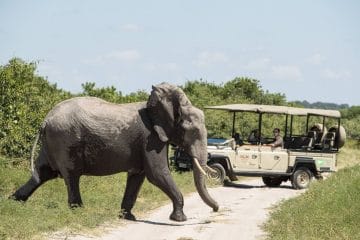
Affordable Chobe and Delta Explorer
Southern Africa Botswana Chobe Okavango Delta
From $ 3345 /USD
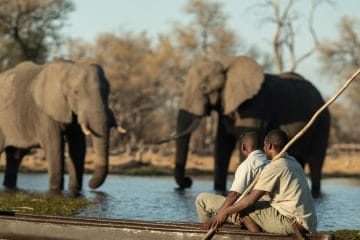
Exclusive Okavango Delta Safari
Southern Africa Botswana Moremi Selinda Game Reserve Okavango Delta
From $ 3700 /USD
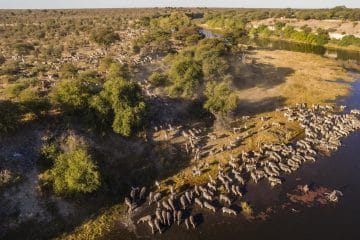
Makgadikgadi Pans & Okavango Delta Safari
Southern Africa Botswana Makgadikgadi Pans Okavango Delta
From $ 9600 /USD
Looking for Something Unique?
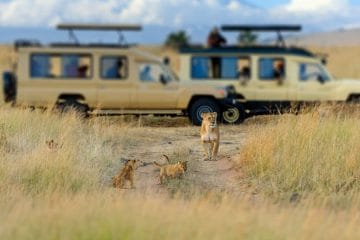
Big Cat Safaris in Africa
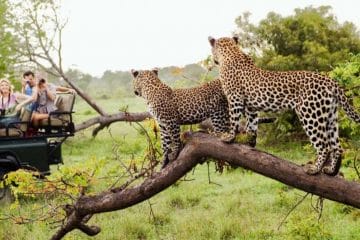
Big Five Safaris in Africa
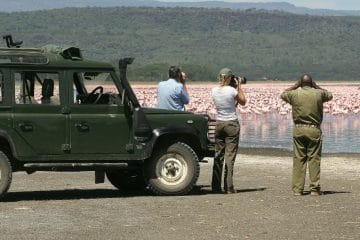
Birding Safaris in Africa
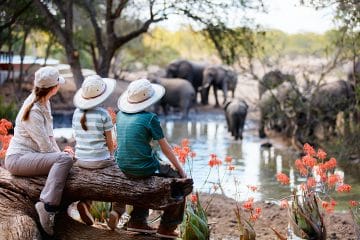
Family and Kid-Friendly Safaris in Africa
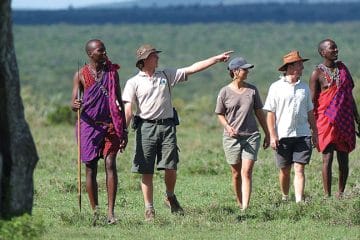
Walking Safaris in Africa
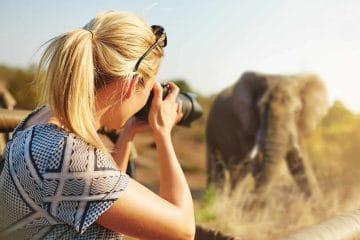
Photographic Safaris in Africa
Why travel with us?
Recent reviews from travellers who planned and booked their africa trips with discover africa safaris, susan was incredible, communicative, accommodating and made our trip 5 star and....
15 Day Southern Africa Honeymoon Safari Review
Annie, United States 19 Oct 2023
Superstar lana.
8 Day Timbavati & Kapama Safari Review
Leah, Australia 12 Oct 2023
Discover africa designed the safari of my dreams..
11 Day Botswana & Victoria Falls Wildlife Safari Review
Ksenia M, United States 06 Sep 2023
Excellent advice for a safari in south africa.
Waterberg Safari Review
Ramiro Castillo, Argentina 16 Jan 2019
Fantastic service and profesional presentation , nothing was too hard to organise....
Botswana & Victoria Falls Safari Review
Mark, Australia 09 Nov 2018
What an experience.
Sanctuary Lodges Review
Jon, United States 15 Jun 2017
Ready to plan your tailor-made safari.

Susan Swanepoel, Safari Travel Planner
Free safari planning advice from destination experts
Faqs about okavango delta.
- Electricity in Botswana, Kenya, Namibia, South Africa, Tanzania, Zambia, Zimbabwe and in most of the continent is 220/240 volts.
- Most safari lodges and camps are not connected to an electrical supply. Solar lighting (backed up by batteries) is common, with many lodges having a generator, which runs part of the day (morning and late evening when guests are out on their activities).
- Lanterns also provide light at night. In many camps running on solar power, you will not be able to use a hairdryer.
- Southern Africa is a hot wildlife destination. There is a world of luxury bush camps, lodges and Eco-friendly tourist establishments in the heart of wildlife heaven.
See Okavango Delta in Your Comfort
- Affordable Okavango Delta Safari
- Okavango Delta Luxury Safari
- Okavango Delta on a Budget
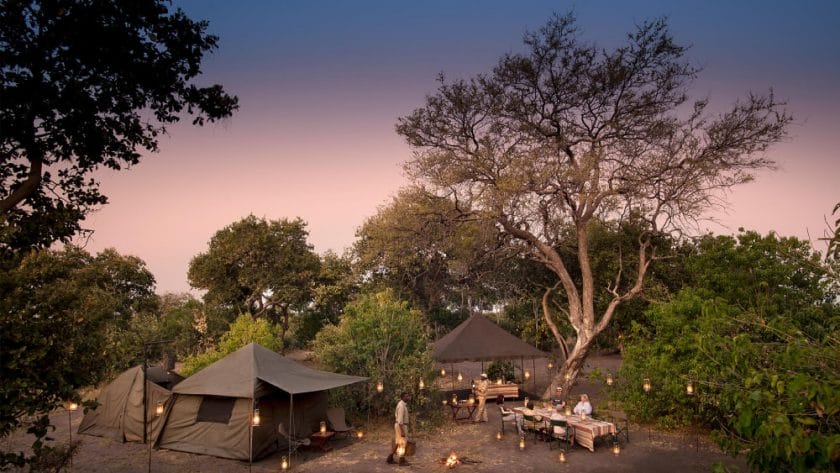
Between the self-drive camping and ultra-luxury lodges, there are two main routes for a more affordable Okavango holiday. The first is to find a ‘mobile safari’ operator – a mid-range adventure package that suits your budget. ‘Mobile safaris’ are essentially organised, guided camping trips and range from group budget ‘pitch your own tent’ tours all the way up to full service luxury. Somewhere in the middle you’ll find an affordable, comfortable option, usually heading into Moremi Game Reserve and sometimes, Chief’s Island. Often the tours involve mekoro or perhaps some walking, and a willingness for adventure is generally required. The other main option is to seek out a mid-range tented camp; there are a handful of these scattered throughout the Delta. Most, however, lie on the Delta’s forested fringes, while the central Okavango lodges tend to be more exclusive.
Mobile safaris can be land or water-based, however, multi day mokoro trips are one of the Delta’s top attractions. Although boats and mekoro aren’t the best for spotting wildlife, exploring the Okavango’s stunning waterways is a unique experience that you’ll never forget. Depending on the tour you may camp wild on small islands or sleep more comfortably in fixed, pre-made tents. It’s often also possible to explore some areas on foot, so there’s the chance to combine a mokoro adventure with a short walking safari too. For boating and mokoro safaris it’s important to visit during flood season, which runs, more or less, from mid-April to late August. Camps and lodges that are able to offer boat excursions from their doorsteps tend to be more high-end and set their rates accordingly.
Most lodges and mobile safaris are quoted as all-inclusive packages, with mid-range options ranging from around $300 to $600 a day. Be sure to check what is and isn’t included – flight transfers and ‘extra’ activities can very quickly drive up the cost. Note that off season rates are usually much lower than normal, with both mid and high-end lodges knocking as much 50% off. January to March are considered the main low season months, so visit during this period for the best discounts and deals. The downside, of course, is the real threat of rain, and the low flood levels which hamper water-based activities. For the best balance between good weather and lower prices, try the late April to May shoulder season for mokoro safaris, and November to early December for wildlife viewing.
With beautiful lakes, lush woodland, wide savannahs, great fauna, and over 400 bird species, the Okavango Delta is a 360° panoramic Garden of Eden.
All of the accommodations on an Okavango Delta Luxury Safari are intimate and personal; all you have to do is relax and go with the flow. Botswana is the gold standard in Southern Africa for low-density, low-impact tourism, and luxury hotels which are among the greatest in the world.
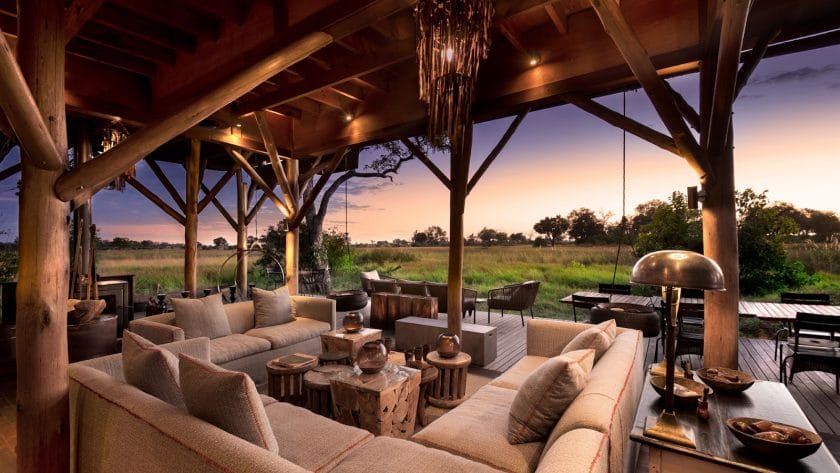
Situated in some of the Okavango Delta’s most remote, secluded regions they often seem to grow organically, directly from the earth.
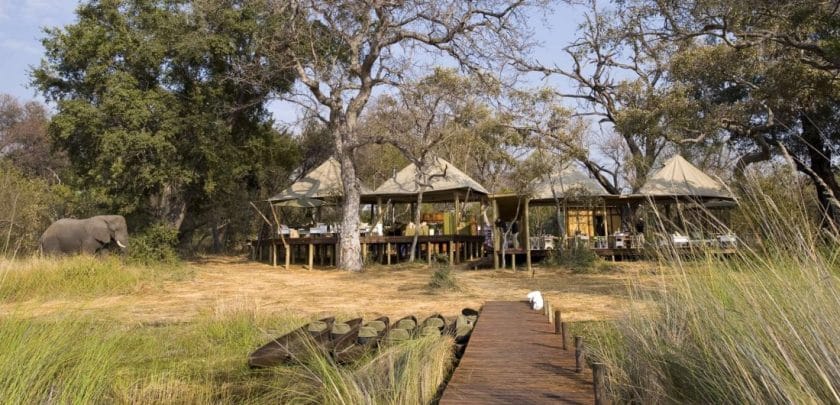
Many Okavango Delta luxury lodges employ lumber and other natural materials to blend in as much as possible, and many adopt ecological construction and management approaches.
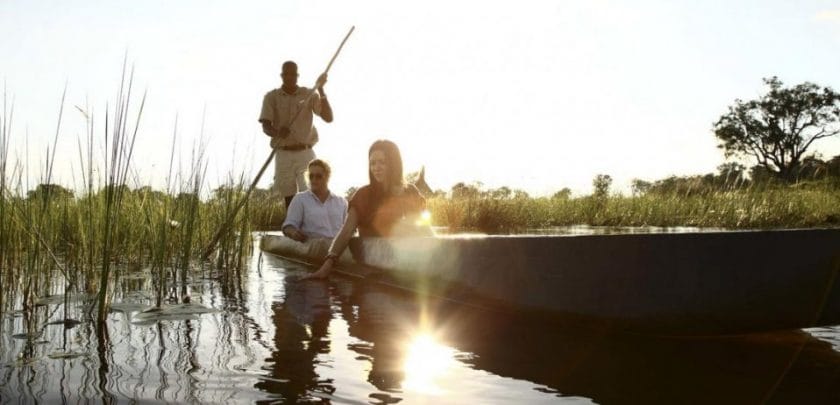
You may gaze out into broad, open, game-rich grasslands or perch high on stilts over an endless, lapping lagoon, depending on the luxury Okavango Delta lodge and the time of year.
What to expect on a Luxury Okavango Delta Safari
Every aspect of a luxury Okavango Delta safari is spectacular in its own right. From the moment you land over the beautiful, elephant-dotted floodplain, to the luxury lodge’s magnificent tented accommodations, the calm mokoro journeys, and the meals, everything is perfect.
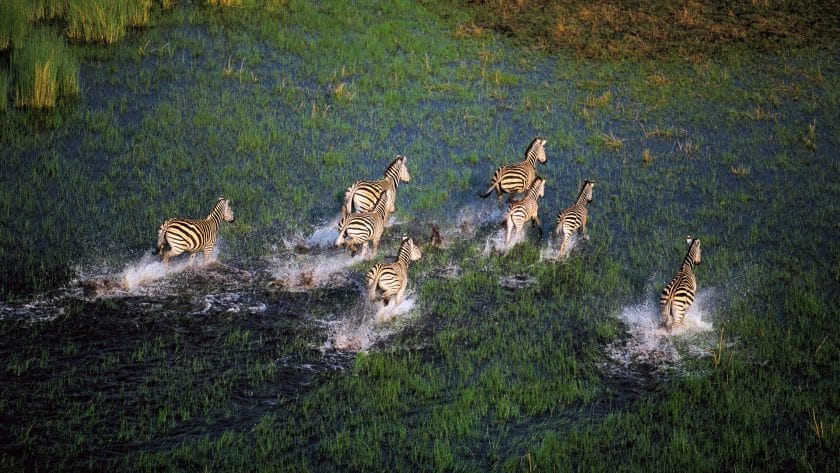
Days are spent touring the Okavango Delta, which is commonly done by Mokoro rides , which adds a unique twist. On your luxury safari, the lodges come alive at night with the soothing light of glowing lanterns for an evening of great dining under the African stars. Okavango Delta luxury lodges are famed for their outstanding service, with private guides and tailor-made activities as standard more suited to wildlife viewing.
Travel tips for a luxury Okavango Delta Safari
The majority of Okavango’s luxury safari camps are small and intimate, which means that space is limited and that the most popular sites fill up quickly.
If you plan on visiting the Okavango Delta during peak season (June to October), book at least a year ahead of time.
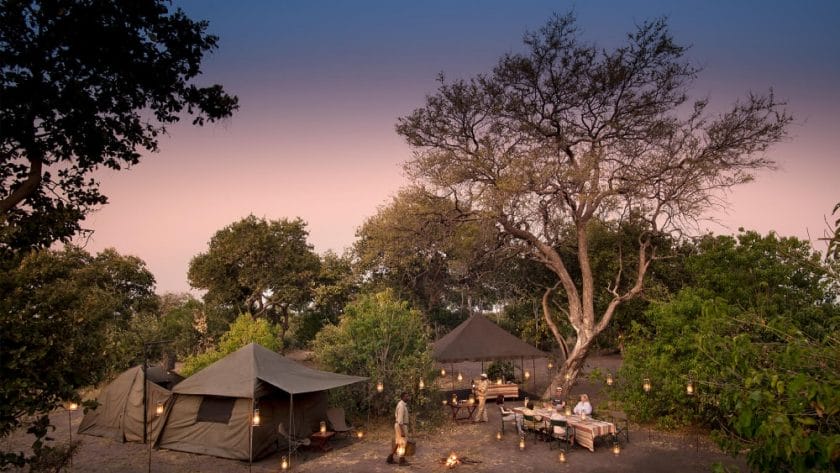
If you’re undecided about where to spend your Okavango Delta luxury safari, consider splitting your stay between two camps – perhaps three or four days near deep water for motorboat and mokoro tours, and another few days in a dry location for game drives.
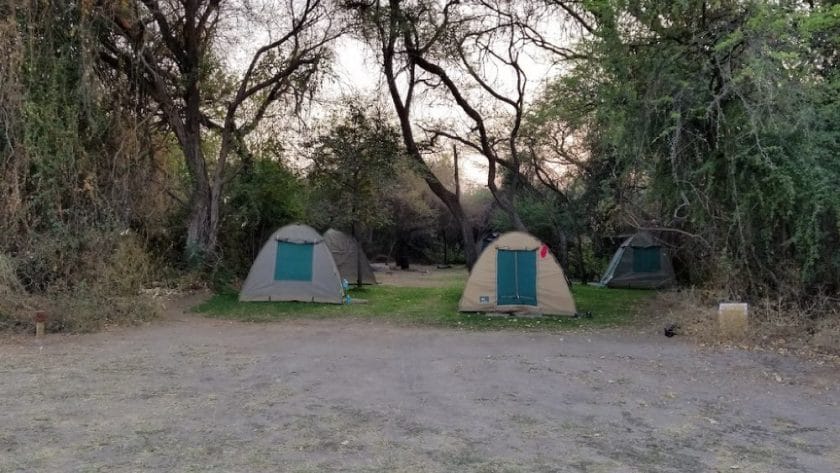
Most of the lodges in the Okavango Delta fall somewhere between mid-range and ultra-high-end luxury. It’s a deliberate strategy by the Botswanan authorities to maximise conservation revenue while keeping visitor numbers low. It’s easy to be cynical about this kind of approach, but funds do seem to go where they’re needed and local communities get to see the value of their resource. The results have been impressive, with very low poaching levels and issues around human-wildlife conflict are far more manageable than in other parts of the continent. All this is to say that a safari to the Okavango is not cheap, but there is some comfort knowing that funds are being used wisely. And while the central Delta is largely off limits to budget travellers, there are still wonderful, affordable campsites in Moremi Game Reserve, along the Khwai River and the Panhandle.
If you don’t have a 4×4 then hiring can be expensive, but it’s often still the most affordable route if you can share with a few people. For solos, a budget group tour is another reasonable option and these can be booked with a reputable company in advance, or head to Maun, and play it by ear. Maun has a couple of low-key camps and a backpackers, a good place to meet fellow travellers and make plans together. Even the tightest budget should find space for a flight over the Delta and these are much more affordable if you can find other people to share costs.
Holiday Styles and Options in Okavango Delta
- Okavango Delta Honeymoon
The Okavango Delta is probably the world’s premier safari destination for honeymoon couples, with stunningly designed, intimate lodges and some of the best wildlife viewing in Africa.
Okavango delta lodges have a reputation for exceptional, personal service and many cater specifically for romantic holidays and honeymoons. Here you’ll find tented suites like villas, with sparkling plunge pools, outdoor showers and candle-lit baths.
And at night, raised walkways lined with warm, glowing lamps as you make your way down to dinner under the stars. Not all Okavango camps offer the same level of luxury, but standards are high just about everywhere you look. The focus is firmly on small-scale, personal experiences. Quality not quantity is the emphasis here for your Okavango Delta honeymoon.
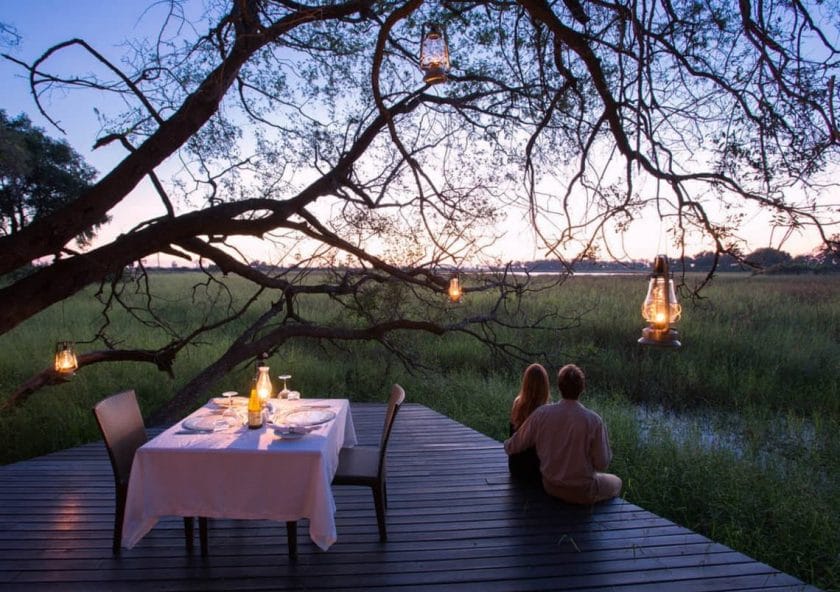
There’s no one region that’s especially good for an Okavango Delta honeymoon, it’ll depend entirely on your budget and what you want to do.
There are beautiful, intimate camps and lodges scattered throughout the Okavango, but keep in mind that local conditions vary widely and the same camp can be very different at different times of year. Arrive from late April to the end of August and you’ll find the Delta flooded and green.
Many camps and lodges will be surrounded by open water, perched high on wooden stilts over an endless magical lagoon. But a few months later and the same area may be dry and bare, great for game viewing and a more traditional safari, but very different from earlier in the year.
That said, many lodges will offer a range of activities regardless of the season, even if transfers or other arrangements may need to be made. Make sure you’re aware of what’s available when you visit. You may need to pick your season carefully to fit your preferred activities in for your Okavango Delta honeymoon.
Mokoro excursions are one of Okavango’s most special experiences and they can be incredibly romantic, especially with a private guide. When the floodwaters are high enough it may be possible to start right from camp – a real sense of exploration for more adventurous couples.
Many central Okavango lodges can only be reached by air and just flying in to camp is an adventure in itself. Longer sightseeing flights can also be arranged – in light aircraft, helicopters or hot-air balloons. But perhaps the most romantic experience is just to be in the Delta together. A honeymoon safari to the Okavango is the holiday of a lifetime and one neither of you will ever forget.
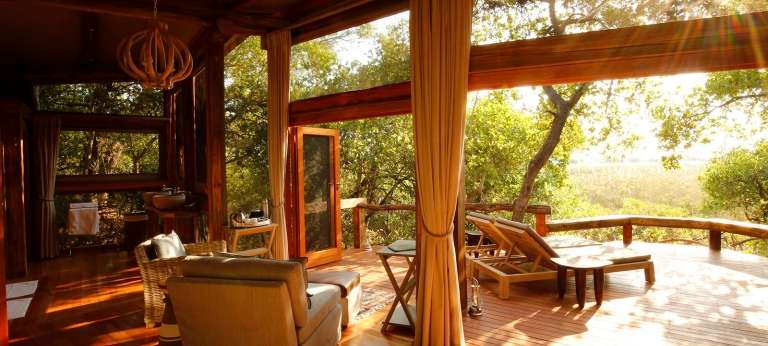
The Okavango’s top lodges are all excellent for an Okavango Delta honeymoon, but if you prefer a holiday without children then look out for those with strict minimum age rules. There are a number of camps that don’t allow kids under 12 so there’s plenty of choice if you prefer adults only.
That said, most camps are well-designed and well-spaced out, and some have the added feature of private sundecks and plunge pools. April and May tend to have good weather, while being less busy, although early April may still see some late rainy season showers. Late May into June/July is also the best time for mokoro trips, although the Okavango’s camps and lodges do get busier as the flood season progresses.
Imagine a vast wilderness of reeds and channels, of towering jackleberry and giant sausage trees. A place where bulrushes hide huge herds of buffalo, where elephants wallow and lions roam. This is the oasis of the Okavango Delta, the jewel in Botswana’s magnificent crown. A wildlife wonderland, it’s been called the last Eden of Africa – both a tribute to its splendour, and an indictment on the decline elsewhere. Its maze of swamps and lagoons form a unique refuge for vulnerable species, with hidden regions so remote that even the acutely threatened rhino can thrive. In the Okavango, you’ll find one of the richest and most bio diverse ecosystems on the continent, a conservation success story and arguably the best wildlife destination in the world…
Declared a UNESCO World Heritage Site in June 2014, the Okavango Delta is recognised for its unique annual flood. 11 trillion litres of water pour south down the Okavango River each year, a deluge from Angola that never reaches the sea. Instead it spreads southeast into the Kalahari interior saturating some 20,000km2 of sand. This is the last vestige of what was once an enormous inland lake, which over millennia has dried and gradually retreated, until only the immense Makgadikgadi Salt Pans remain. The Okavango’s waters may no longer feed a lake, but they’re still critical to wildlife across the region. Central Botswana is the heart of the Kalahari, a semi-arid desert that sees very little rain. What makes the Delta particularly special is that its flooding coincides with the bone-dry winter months. As the summer rains fade in March and April, the waters begin their surge down the north-western ‘Panhandle’. As they hit the Delta, they gently fan out, and can take up to four months to percolate south to Maun. This seasonal flow provides a year-round source of water, a life-bringing reservoir for thousands of species of animals and plants.
The Okavango Delta is one of the world’s best wildlife regions, not just for its great game viewing, but as a general triumph in conservation. Much of its success is down to tireless, careful management and an overriding conviction that successes must be shared. Botswana has long operated a low-density tourism model, allowing a limited number of camps and lodges who then operate at a premium. This can quickly ramp up the cost of a safari to Botswana, but local communities are included and significant revenue is shared. In the Delta, you’ll find some of the world’s wildest and most spectacular game lodges and although prices can be high, it is the price of success. When you visit the Delta, the surrounding communities see value, which keeps poaching low and general encroachment at a minimum.
There are also ways to see the Delta which don’t involve luxury lodges – from houseboats on the Panhandle to Moremi and Khwai’s simple campsites. But wherever you go, park fees and tourism levies ensure that when you touch one of the world’s last great wilderness areas you know that in some small way you’re helping it survive.
Who is Travelling to Okavango Delta with you?
- Family Safari in the Okavango Delta
- Solo Travel in Okavango Delta
An African safari is an unforgettable experience for kids, but long transfers and hours in the car can be a real challenge, especially for younger children. One solution is to pick a single camp or more manageable area and avoid daily travel as much as possible. In the Okavango Delta, this approach is ideal because there’s such a high concentration of wildlife and activities in such a small area. From a lodge in the Okavango you can arrange boat rides and mokoro trips, as well as game drives and bush walks with specially trained guides. There’s a minimum age limit for all safari activities in the Delta, and although it varies from lodge to lodge, it’s usually set between eight and 12. A handful of lodges also offer camp-based activities for kids, such as basic bush craft, animal identification and fishing.
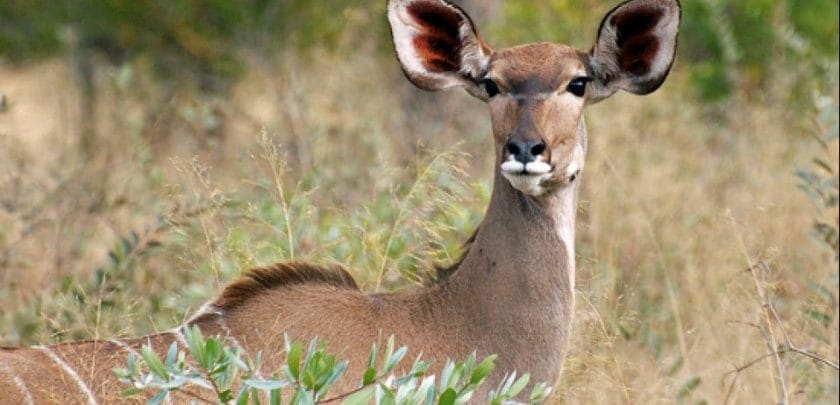
In the past the Okavango has been a difficult place for families, but more and more lodges are now welcoming children. You’ll now find family-friendly lodges scattered throughout the Delta, although facilities vary considerably so it’s worth looking around. Some camps have been exceptionally well setup for kids, with private suites and family units, set to one side with their own lounge and play areas. Others simply have larger family-sized tents or interconnecting tents/rooms that can be booked as a unit so the whole family can sleep together. Additional perks may include specially trained guides for children, separate dining areas and staggered meal times – note, however, that child-minding services are rarely available and very few lodges cater for infants and very young children.
Child-friendly safari activities depend on the lodge and the time of year. Well-equipped lodges can offer an incredible experience and the chance not just to see wild animals in their natural habitat, but to learn about their behaviour and the general environment as well. That said, there’s little point visiting during the peak floods if the lodge has an age limit on boat trips, for example. And families with children younger than eight (sometimes seven or nine) need to be especially aware of any restrictions. Between eight and 12, various junior safari options are more readily available, including motorboat trips, bush craft and basic animal tracking, fishing and game drives. Some camps and lodges have stricter policies than others and a few will assess kids on a case by case basis rather than apply blanket age restrictions to all. Above 12 years old the Delta opens up completely, although this also often means being charged a full adult rate.
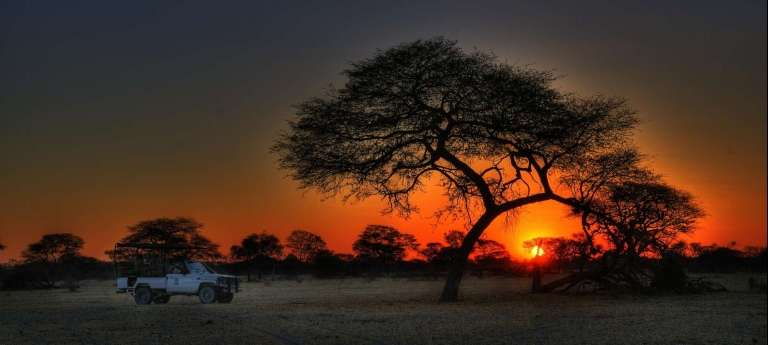
Age limits and child policies vary from lodge to lodge so be sure to check all the details very carefully before you book. Most lodges will insist that kids under eight years old have private game vehicles and guides, which is a great way for younger children to get the most out of the experience, but may also incur significant extra costs. For slightly older kids, mobile camps can be an exciting option. The outdoor camping element is always a thrill and there’s less chance of boredom as you move to a new campsite each night. On the whole it’s a good idea to bring everything you need with you, including bird and animal identification books and any other entertainment – such as board games – to keep them occupied between activities. Malaria is also an issue in northern Botswana and although many lodges are so remote that the risk is minimal, you will likely still need to transit through potentially infected areas. Some antimalarial medication is not suitable for young children so be sure to consult your doctor before you travel. Finally, local law now requires all parents travelling through South Africa and Botswana to carry an unabridged birth certificate for each of their children. The certificate must state the names of both parents and if one parent is absent you must also have an affidavit from them granting consent. The measures are in place to prevent child trafficking in Southern Africa and without the correct documents you will be denied travel.
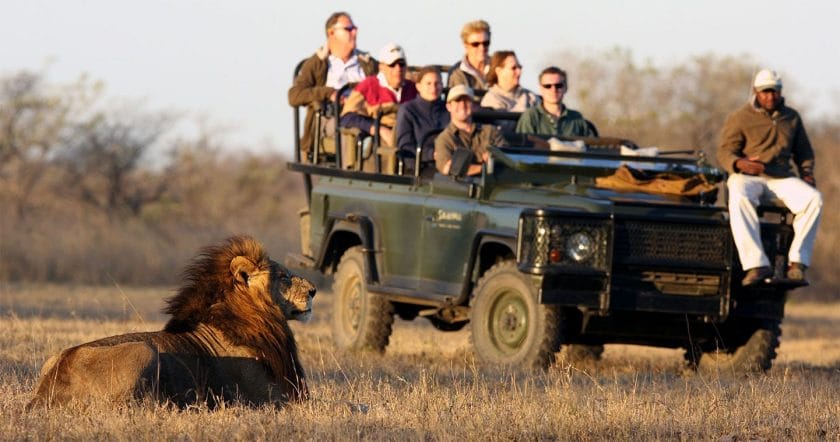
Solo travel is unusual in the Okavango Delta, largely because experiences like this beg to be shared. Solo 4×4’ing also carries some risk, especially in the wet summer season from December to March. That said, there’s no reason not to explore the Delta on your own. Most lodges are more than happy to welcome solo guests. During the shoulder and off-seasons you may have the entire camp to yourself and it’s often possible to get a private, dedicated guide and customise your experience as much as you like. This presents some wonderful opportunities for photographers, and also for keen ornithologists in search of specific birds.
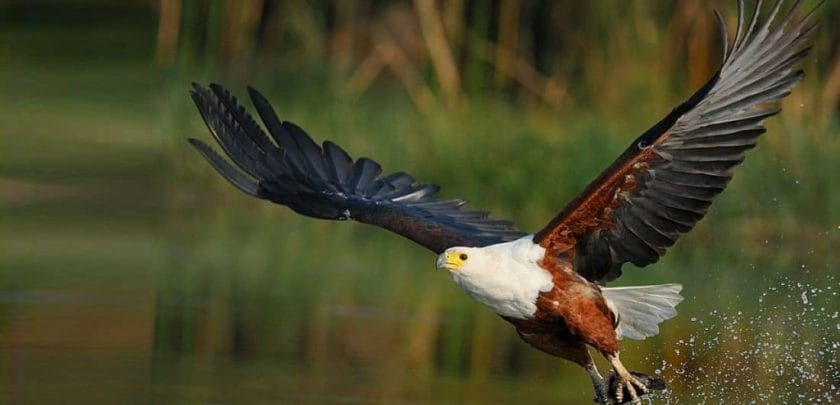
The Okavango Delta’s lodges are generally small, intimate affairs, and many offer communal dining and shared campfires in the evenings. There’s usually the chance to meet fellow travellers over dinner, but in many cases activities are organised privately per booking. This is obviously ideal if you’re after peace and solitude, but if you’d like to meet and travel with other people then your best option is to head for Maun. In Maun, you’ll find a vibrant nightlife in the handful of campsite bars and pubs. Here you’ll be able to join group game drives and mokoro tours and split the costs on otherwise fairly pricey sightseeing flights over the Delta.
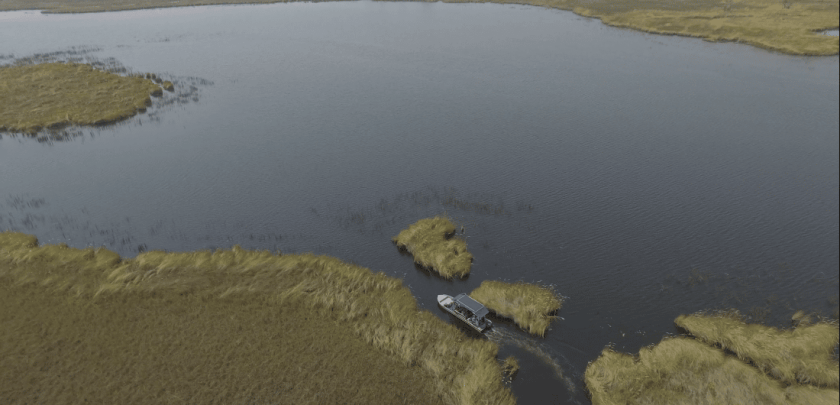
Having your own private guide is an incredible experience, especially out on the waterways in a motorboat or mokoro. The opportunities for photography are unmatched when travelling solo and keen birders and anglers can also request specialist guides. Generally speaking if you arrive alone at a lodge, you’ll quickly be made to feel completely at home. The lodges in Okavango specialise in a bespoke, personal service and will tailor activities to the interests of their guests.
Most Okavango lodges charge a single supplement of at least 20% but this can go up to as much as 50% during peak season. Shoulder season (April/May and November/December) is far more affordable for solo travellers and those looking for solitude will also find the camps much quieter during these periods. Be sure to let your lodge know if you have any special interests, such as birding or fishing, and they’ll usually be able to pair you up with a specialist guide. If you’re on a tighter budget and looking to share costs, then head to one of the busier campsites or laid-back safari lodges in Maun. Here you’ll usually be able to join group activities, including mokoro safaris into the Delta, and sightseeing flights and game drives are much more affordable when shared. If you’re planning to drive alone in this region, then a word of caution before you set out. You should have some prior 4×4 experience and be carrying a satellite phone. Moremi Game Reserve is the only part of the Delta open to self-drive vehicles and although it’s quite close to Maun and not especially remote, it’s easy to get stranded there at any time of year.

What You Need To Know
- Wildlife in Okavango Delta
- Why Should you Come Back to Okavango Delta?
- Khwai Community Concessions
Official counts vary, but it’s generally thought that the Okavango Delta supports at least 2000 major species. Over half of these are plants, from giant hardwoods to waterlilies, with huge reed beds and grasslands and thick riverine forests. In the midst of the Delta you’ll find wild date and fan palms, clustering on low islands between the fig and waterberry trees. Take a look at a satellite image and you’ll see just what an anomaly this is – a lush hand of vegetation reaching south into the sand.
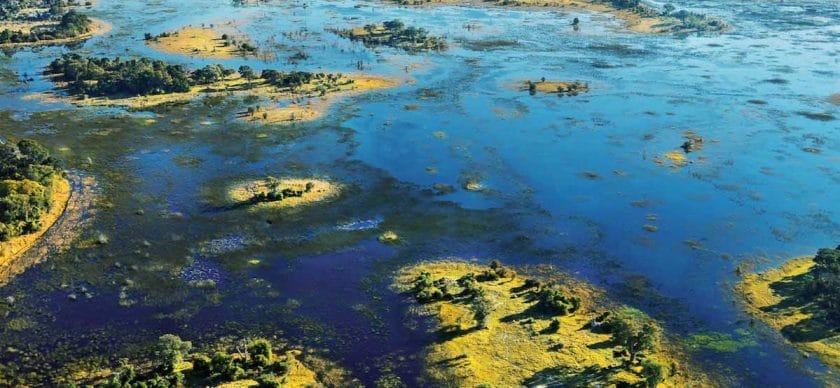
Up close in the channels, beneath the waving papyrus, painted reed frogs can be seen clinging to the stems. Around 30 amphibians have been recorded in the Delta plus 60-odd reptiles and around 70 species of fish. In fact, many visitors come especially for the fishing and ‘catch and release’ fishing lodges are popular along the Panhandle. The ferocious-looking tigerfish is the most sought after prize, plus bream and huge catfish, up to a metre-and-a-half in length.
The Okavango Delta never drains completely and the best way to experience it is by boat. Whether you’re fishing or not, a boat excursion is essential, either by flat bottomed motorboat or local dugout canoe. Called ‘mekoro’, these canoes are polled through the narrow waterways – an ideal way to discover the Delta’s 400-plus species of birds. Expert guides will skirt around the pods of hippos, as you silently soak in one of the world’s last great open-air aviaries.
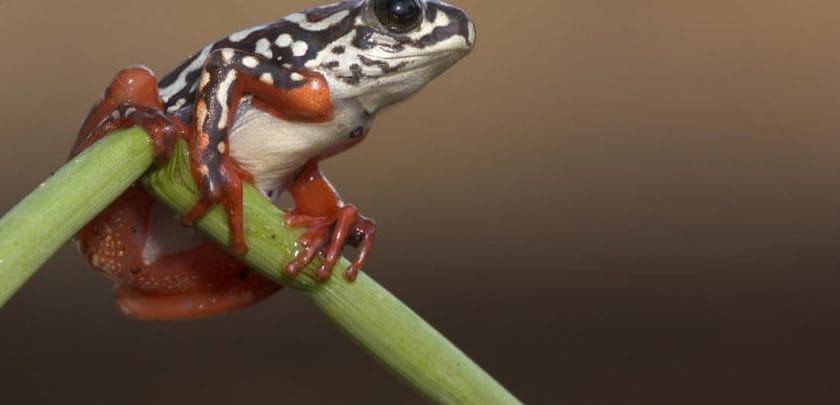
On the islands and floodplains Africa’s iconic megafauna awaits – over a third of the continent’s elephants move through the Delta each year. All of the Big Five are found here in good numbers, including black and white rhino which have been recently reintroduced. While predator sightings are never guaranteed, there are few places left where so many come together. Lion, leopard and cheetah are relatively common, as well as wild dog, hyena, jackal and the smaller wild cats. These prey on the many thousands of herbivores who are drawn to the Delta’s water and abundant food. The rare sitatunga and red lechwe are both adapted to the swamplands and you’ll also find the stunning roan and sable antelope with their scimitar-curved horns.
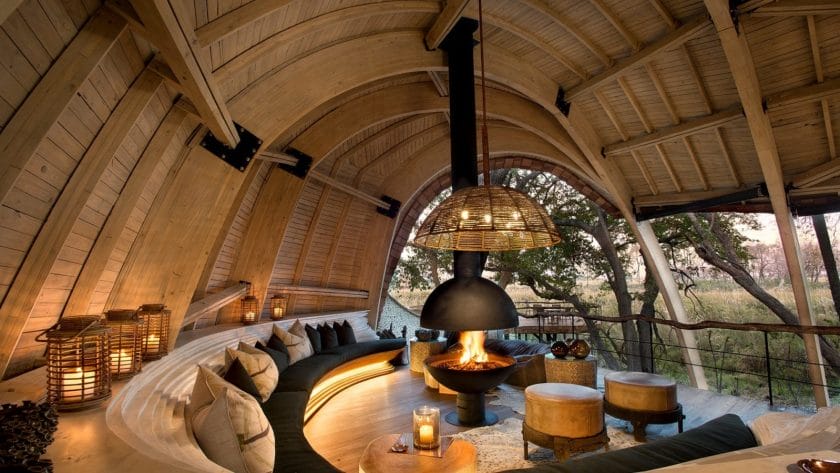
Barely touching the Delta’s north-eastern edge, the Khwai Community Concession runs along the Khwai River, just beyond Moremi Game Reserve’s North Gate. This small concession (number NG19) is owned and run by the community in nearby Khwai Village. About half a dozen midrange to luxury lodges operate here, as well as a couple of very basic campsites, all along the north bank of the narrow Khwai River. The river itself very rarely runs dry and is a magnet for game passing between Moremi and Chobe National Park to the north. It’s a beautiful, low key area that has the advantage of being easily accessible by 4×4 from Maun and also makes an excellent stopover between Moremi and Chobe.
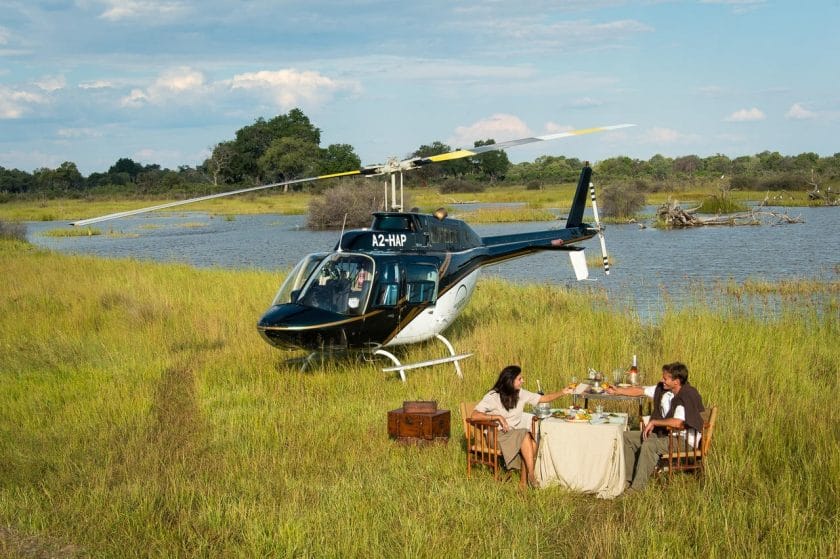
Excellent wildlife, especially close elephant encounters: The Okavango Delta is well-known for its phenomenal wildlife, largely because of its abundant water. The Khwai River is the nearest source for thousands of animals that forage and hunt in the mopani forests between Moremi and Chobe. As such, the river attracts plentiful wildlife, especially in the dry winter months when hot, thirsty elephants gather along its banks.
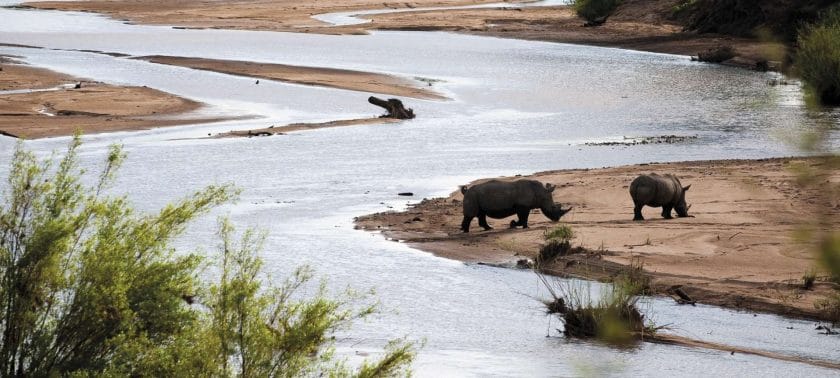
Cultural village tours: Tours of Khwai Village can also be arranged with the community directly or through one of the lodges that operate along the river. They’re a great way to see first-hand how the concessions benefit the community and speak to villagers about their traditional way of life.
The Khwai region can be reached in a few hours’ drive from Maun, but you’ll need a 4×4 to negotiate some thick sand and a few water crossings. Alternatively, there’s a small airstrip which serves the lodges along the river. The village itself has a small shop, but supplies are very limited – perhaps no more than a few cool drinks and some crisps. If you’re not staying in a lodge, you’ll need to take everything with you; note that the two community campsites don’t have ablutions.

- Why Okavango Delta
Registered Members of these Organizations
USEFUL LINKS
- African Safaris
- African Safari Tours
- African Safari Lodges
- Why Book with us?
- Content Collaborations
- Safari Cost Estimator Tool
- Wildebeest Migration
- Privacy Policy
- Website Terms of Use
POPULAR COUNTRIES
- View All Countries
- South Africa Safaris
- Botswana Safaris
- Kenya Safaris
- Tanzania Safaris
- Namibia Safaris
- Rwanda Safaris
- Uganda Safaris
- Zambia Safaris
- Zimbabwe Safaris
POPULAR DESTINATIONS
- View All Destinations
- Cape Town Holidays
- Kruger Safaris
- Victoria Falls Safaris
- Masai Mara Safaris
- Serengeti Safaris
- Etosha Safaris
- Chobe Safaris
- Okavango Delta Safaris
TRAVEL BLOGS
- Cape Agulhas Development Enhances Africa’s Southernmost Experience
- Virgin Atlantic and Kenya Airways improve connectivity to Kenya
- South Africa’s Mega Landscapes Plan: Conservation Boost or Nature Risk?
- Rwanda vs Uganda: Which is Better for Mountain Gorilla Trekking?
- Kruger’s New Gate to Grow Tourism + SA’s Top Parks to Visit in 2024
DISCOVER AFRICA SAFARIS
2nd floor, Tygervalley Chambers One, 27 Willie van Schoor Avenue, Bellville, Cape Town , 7530
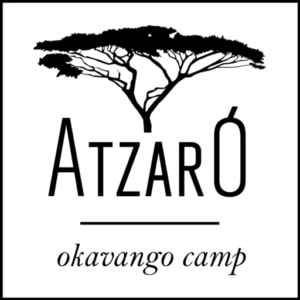
Okavango Delta
The okavango delta safari experience offers a unique view of this pristine wilderness that epitomises the raw beauty of nature at africa’s heart.
The Okavango Delta is a mesmerising oasis at the heart of Botswana. UNESCO World Heritage protected, the area is varied and plentiful thanks to the rich and diverse ecosystem. Adjacent to the renowned Moremi game reserve, it is widely recognised as one of the most untouched and wildlife-rich regions in all of Africa. Known as the world’s largest inland delta, it is a haven for wildlife enthusiasts and nature lovers alike. With its unique habitat, diverse wildlife, and breathtaking landscapes, the Okavango Delta safari offers an unforgettable experience for all who visit its untamed wonderland where nature’s beauty knows no bounds.
The delta is teeming with a remarkable array of wildlife. From majestic elephants and graceful giraffes to stealthy predators like lions and leopards, the Okavango is home to a rich tapestry of animal species. Immerse yourself in a wildlife paradise like no other, where the waterways are inhabited by crocodiles and hippos, whilst the skies above are filled with vibrant birdlife. Exploring with the Okavango Delta safari offers endless adventures. Embark on thrilling game drives, led by experienced guides, as they navigate the wilderness in search of elusive predators and iconic herbivores. Venture on foot with a walking safari, immersing yourself in the sights, sounds, and scents of the African bush.
The vast plain experiences distinct seasons, each offering a unique charm. The flood season, occurring from May to October, is a spectacle to behold. As the floodwaters from Angola arrive, the delta transforms into a watery wonderland. This period is perfect for exploring the delta by traditional mokoro canoe, gliding through the labyrinth of channels and observing wildlife up close. The dry season, from November to April, brings an abundance of game to the delta’s edges, as animals gather around the remaining water sources, the dance of life where wildlife thrives in harmony with untouched nature.
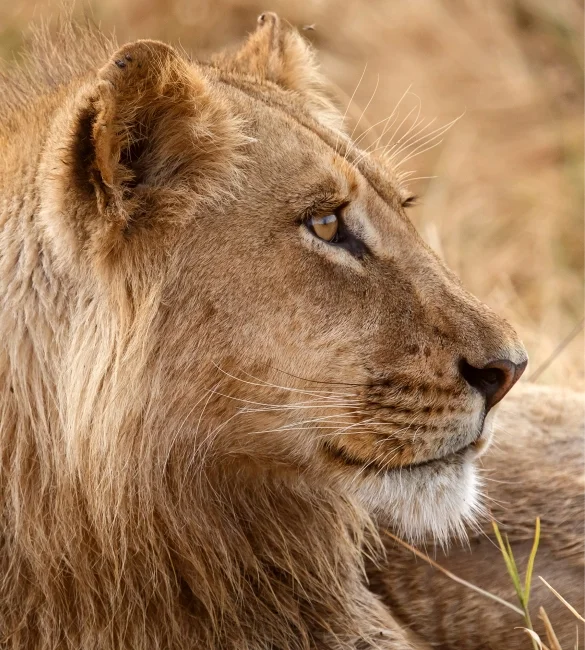
The Okavango Delta is renowned for its rich and diverse wildlife, drawing nature enthusiasts and safari seekers from around the globe. The delta’s unique ecosystem sustains a remarkable variety of species adapted to its changing water levels. Elephants, buffalo, and giraffes roam the floodplains, while predators such as lions, leopards, and cheetahs thrive in the diverse habitats. The waterways are teeming with hippos and crocodiles, adding to the delta’s reputation as one of Africa’s premier wildlife destinations.
A myriad of smaller but equally fascinating creatures are to be found from elusive lechwe antelopes gracefully navigating the waterlogged landscape to the industrious African honeybee building hives in the trees. Reptiles like the Nile crocodile and various snake species add to the ecological tapestry, while amphibians and insects thrive in the wetland environment. The Okavango Delta stands as a testament to the intricate balance of nature, where each species, no matter how large or small, contributes to the overall richness of this extraordinary haven.
Birdwatchers can experience a diverse and spectacular array of avian species in the Okavango Delta, with more than 400 bird species recorded. Among the highlights are the striking African fish eagle, often seen perched on branches overlooking the water, and the vibrant malachite kingfisher, darting gracefully along the water channels in search of prey. Herons and storks wade through the shallows, and the iconic saddle-billed stork, with its vivid colours, is a frequent sight. The delta’s seasonal variations in water levels create a dynamic environment that attracts both migratory and resident bird species, making it a year-round spectacle for bird spotting aficionados.
One of the most remarkable aspects of the Okavango Delta’s birdlife is the sheer diversity of habitats it encompasses. From the open floodplains to dense reed beds and wooded islands, each habitat supports a unique set of birds. The elusive Pel’s fishing owl, adapted to a nocturnal lifestyle, can be found along the delta’s waterways, whilst the ground hornbill patrols the woodlands. Whether gliding over the water or nesting in the trees, the birdlife in the Okavango Delta contributes to the area’s ecological richness and enhances the overall enchantment of this pristine wilderness.
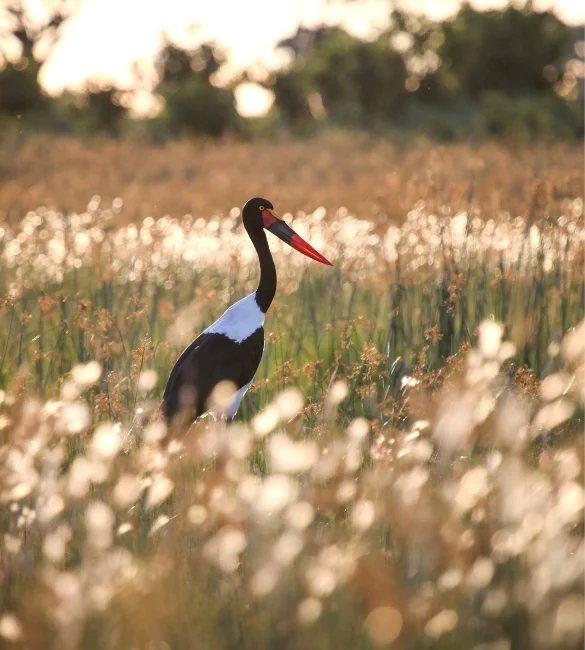
Safari Guides
Our experienced safari guides are not just knowledgeable experts but also passionate storytellers and environmental custodians. Possessing an intimate understanding of the delta’s intricate ecosystems, they navigate the water channels and expansive floodplains with a profound sense of connection to the land. With years of experience, they demonstrate an exceptional ability to track and interpret the behaviour of the diverse wildlife inhabiting the delta, offering visitors a front-row seat to the wonders of the African wilderness. Their keen eyes and wealth of information transform a safari into an educational and immersive experience, sharing insights into the intricate relationships between flora and fauna.
Beyond their expertise, the African Bush Camps trained guides harbour a genuine commitment to conservation. The entrusted naturalist guides are individuals with exceptional experience who hold a deep appreciation for the Okavango Delta’s delicate balance. Their passion fosters a sense of responsibility for the area’s preservation among those fortunate enough to embark on a safari under their guidance.
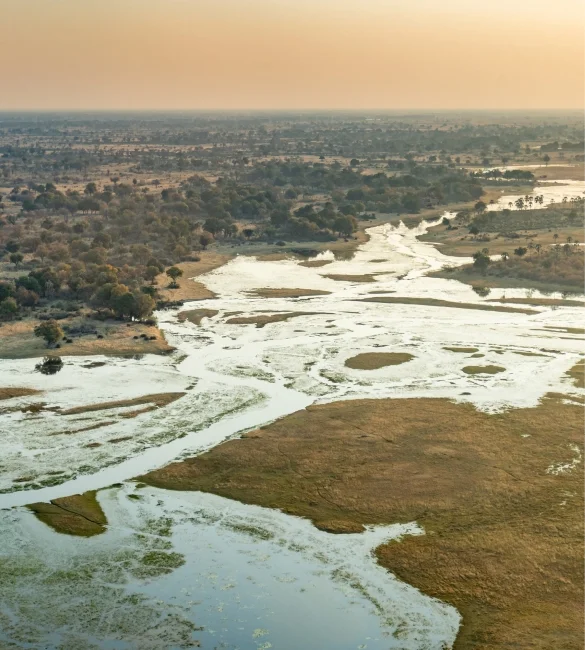
The Okavango Delta experiences distinct wet and dry seasons. The dry season, typically from May to October, brings arid conditions and lower water levels, May to August temperatures hover around 20c during the day, and from August to October around 28c. As the wet season unfolds from November to April and temperatures around 28c, the delta undergoes a remarkable transformation, with rainfall causing the Okavango River to flood the plains, this inundation creating a labyrinth of wildlife attracting water channels and lagoons.
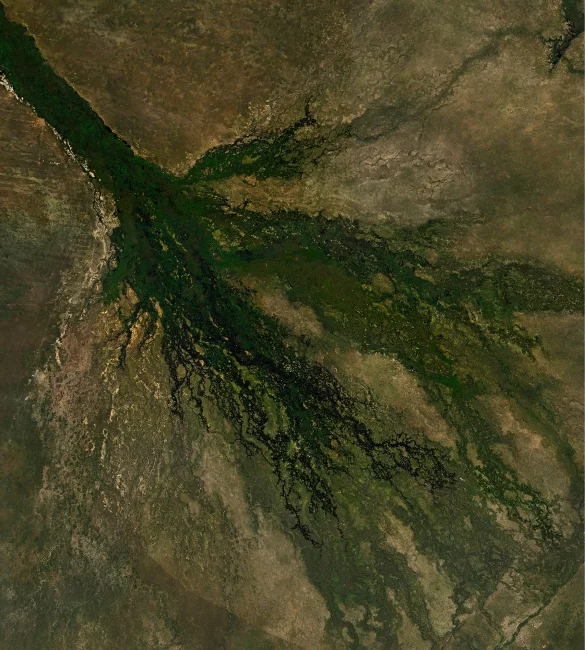
NG32 is a pristine private concession area located within the captivating Okavango Delta in Botswana, between the Moremi game reserve and the Gomoti plains. It is the place we call home at the Atzaró Okavango camp. Known for its exceptional wildlife, breathtaking landscapes, and serene waterways, NG32 offers a unique and immersive safari experience. This region is teeming with diverse ecosystems, from lush grasslands to winding channels and picturesque lagoons, providing a haven for an abundance of wildlife species.
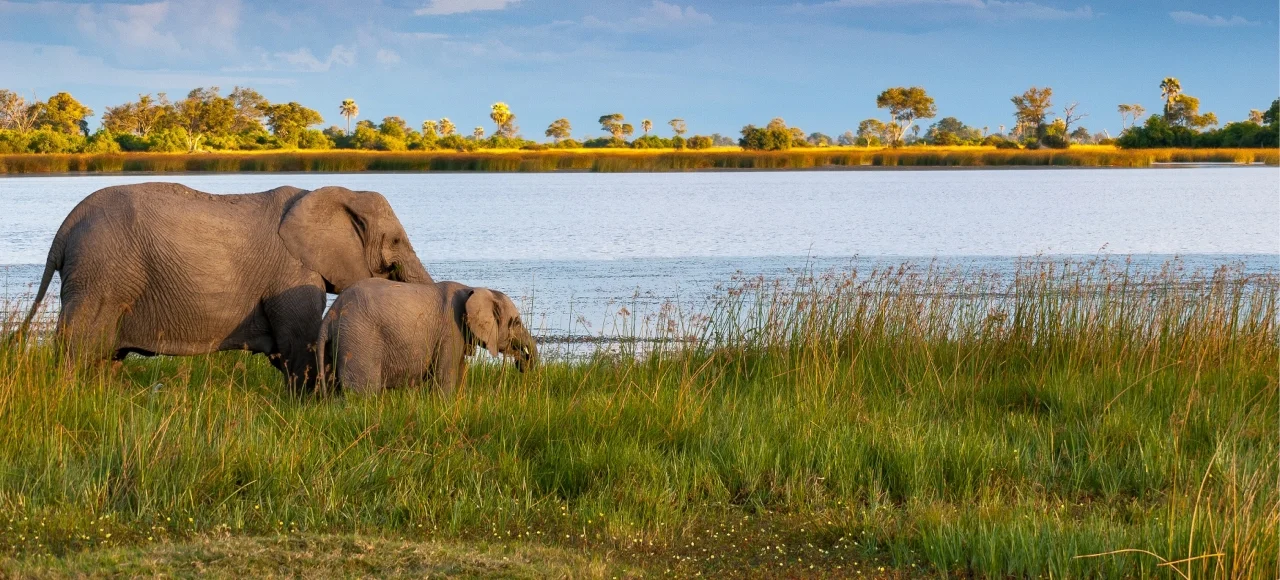
The Okavango Delta is an enchanting sanctuary where extraordinary natural encounters await. It is a captivating destination that showcases the wonders of nature in all their glory. With its abundant wildlife, diverse seasons, and untouched landscapes, it is a true sanctuary for both animals and visitors alike. Experience the pulse of Africa, where adventure and serenity unite in an Okavango Delta safari. Whether you’re a seasoned traveller or a first-time explorer, a journey to the region will leave you with memories that last a lifetime. Come and immerse yourself in this remarkable corner of Africa, where nature reigns supreme, in the delta, at Atzaró Okavango.
For more information : [email protected]
Explore Atzaró Group
Atzaró agroturismo, aubergine by atzaró, atzaró beach, atzaró cape town, ca s’uzina by atzaró, prana by atzaró, about atzaró group, follow on instagram, atzaró okavango camp.
Atzaró Okavango NG32 Okavango Kopano Mokoro Maun Botswana Africa
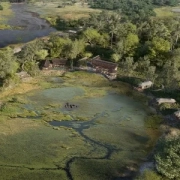
Bookings & Info [email protected]
PR, Press & Marketing [email protected]
In Association With
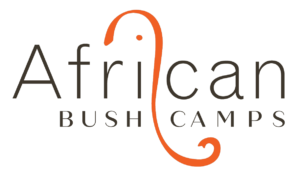
© Copyright – Atzaró Okavango 2024
Privacy Policy | Terms & Conditions
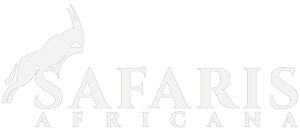
Okavango Delta Safaris
A vistor’s guide to taking an okavango delta safari.
Considering an Okavango Delta safari? Read on below for the ultimate Okavango Delta safari guide.
The Okavango Delta is a huge, swampy inland delta in the heart of the Kalahari Desert in northern Botswana. At around 15,000 square kilometers, the delta is the largest wetland wilderness in the world – a place where African wildlife is untrammeled by human interference, and the safari experience is truly second to none.
Its importance and uniqueness were rubber-stamped in 2014 when the area was announced as the 1000th UNESCO World Heritage Site . The entire Okavango Delta region is an important wildlife area, home to one of Africa’s greatest concentrations of wildlife. The only protected area in the Okavango Delta is the Moremi Game Reserve to the east, surrounded to the west and north by a number of large wildlife concessions.
The delta supports large concentrations of animals on both a permanent and seasonal basis and is one of the best places in the world for wildlife viewing. Large mammal wildlife is found in abundance, including hippos, elephants, buffalo, lion, leopard, giraffe, rhino, and cheetah.
The delta is home to one of Africa’s most vibrant populations of African wild dogs, whilst the watery terrain is the perfect habitat for the elegant red lechwe and shy sitatunga antelopes. In total, the Okavango Delta supports 164 species of mammals, and the elephant population during the flood is estimated to be half the continent’s total population. In addition to the many mammals, the Okavango Delta is also home to over 500 species of birds and 90 species of fish.

Botswana’s Okavanga Delta from the air
Best time to visit the Okavango Delta
Botswana is a large country with a varied climate that can broadly be divided into wet and dry seasons. Each season has its pros and cons for taking a safari in the Okavango Delta, and although the high season is from July to September when the delta is flooded*, an Okavango Delta safari is a jaw-dropping year-round safari option.
Dry season runs from April to October, defined by sun-filled days and next to no rainfall at all. Moving through the dry season the undergrowth thins out, water sources recede, and wildlife is drawn to the limited permanent water sources – typically in the heart of the delta.
Wet season runs from November to March, with plenty of rainfall and increased seasonal water sources for wildlife. Grasslands grow denser, and wildlife begins to spread across wider areas.
January to April
Low season, with rainfall common and temperatures around 30 degrees. Most of the migratory wildlife has left the delta, but there’s still plenty of wildlife to spot. Water levels are very low, with water-based safaris possible only in permanent channels. Most camps offer strong discounts during this period.
May to June
Shoulder season when floodwater starts to surge into the delta from the Angolan Highlands. The panhandle is the first beneficiary of the water, and where wildlife initially concentrates. Grass levels are at their highest in May, making wildlife viewing difficult at times.
July to September
High season, with the flood moving across the delta from the panhandle in the northeast through the delta fan in the southwest. Dense wildlife, clear blue skies, and comfortable temperatures (in the region of 20°C to 30°C). Grass cover has mostly died back by now, making for good wildlife visibility.
October to December
Shoulder season with hot and sticky weather (up to 35°C). Migratory wildlife begins to leave the area, but it’s birthing season for the wildlife that stays, offering some great safari viewing. November sees the rains come, just after the floodwaters in the delta start to dissipate. * Weather patterns are unpredictable, with water levels changing each year – and through the year, and some years experiencing drought. – and weather patterns are unpredictable.
How to get to the Okavango Delta
Situated at the southeastern tip of the Okavango Delta, Maun is the gateway to the delta – and Botswana’s primary tourist hub. Whilst the town itself is not so special, there’s a huge range of accommodation – some on the Thamalakane riverfront – and it’s the place to stock up on supplies at one of the supermarkets if you’re heading into the delta on a self-drive safari .
There is a large selection of Botswana safari companies and tour agencies based in Maun. Whilst it’s possible to just turn up and get yourself a delta safari booked (anything from a day trip to a week plus), it’s worth planning ahead and shopping around online, especially as many camps in the Okavango Delta are small and can get booked up months in advance.
From Maun, getting into the delta will be dependent on where exactly you stay. For the inner delta, you’ll likely need to fly, whilst dirt road and boat may be an option for the more peripheral safari camps.
If you’re travelling to Moremi Game Reserve, an alternative to flying is a two-hour drive to the south gate. For a self-drive Okavango Delta safari in Moremi, you’ll need a 4WD as the roads vary between sand and mud. From November to March (rainy season) Moremi sometimes closes to self-drive visitors, so it pays to check the situation ahead of travelling.
Geography of the Okavango Delta
The Okavango Delta travels 1,200 kilometers southeast from Angola’s Highlands, flows continuously into the delta, and instead of ending at the ocean, spills into the middle of one of Africa’s most epic deserts – the Kalahari Desert. Fed by the Okavango River, an estimated 11 cubic km of water that reaches the delta each year doesn’t make it to the sea or ocean. Rather, some of the water drains into Lake Ngami, while the majority either evaporates or transpires as it spreads out across the delta. Once in the delta water is lost to transpiration by plants (60%), evaporation (36%), percolation into aquifer system (2%), and finally, 2% flows out into Lake Ngami.
The result is a swamp that’s anything but ordinary or murky, with crystal clear waters strewn with lily pads and colourful fish and one of the greatest concentrations of wildlife in Africa. It’s a natural phenomenon, as well as an excellent destination for safari holidays.
The whole delta area is very flat (with less than a 2 metre height variation), which leads the delta to flood each year*, turning the sprawling grassy plains into a lush animal habitat into a maze of channels, streams, rivers, lagoon and islands, all teeming with wildlife. At its widest point the delta spreads to a width of 170km, and from July and September over 200,000 animals migrate from the surrounding desert to drink in this gigantic watering hole – one of the only sources of water during the dry period.
Okavango Delta safari activities
Because of its location, the Okavango Delta offers a Botswana safari complete with activities that are a little bit different to most other safari destinations:
Delta flights
If you’re staying at a safari lodge deep in the delta you’ll have flights included in your package, and the opportunity to see the delta, and likely plenty of wildlife, from the air. Even if you don’t manage a safari in the heart of the delta, there are several companies clustered around Maun airport offering scenic tours in small planes or helicopters – a once in a lifetime opportunity.
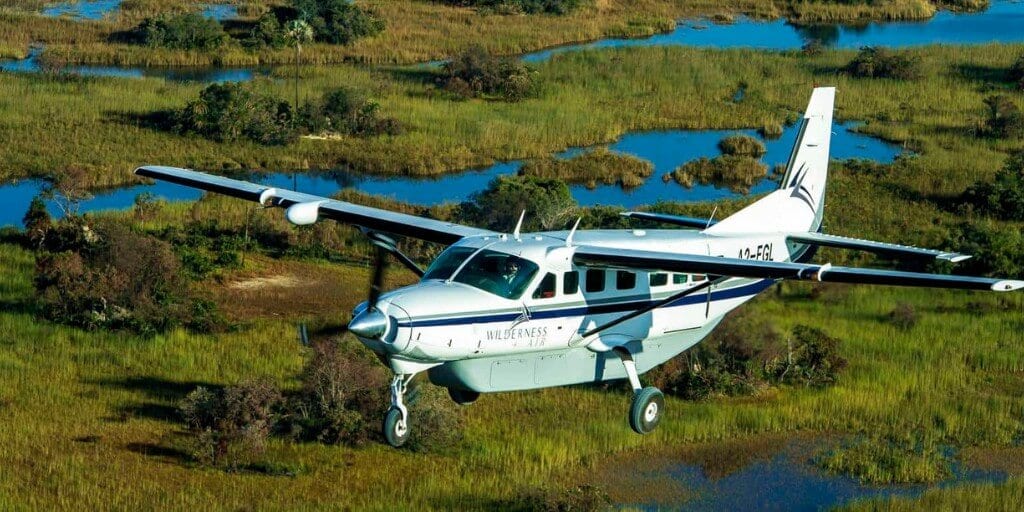
A flight over the Okavango Delta
The Okavango Delta is famed for its mokoros – dugout canoes punted and guided by a single person standing at the back of the canoe, with room for a couple of passengers. Crafted out of a tree trunk, and around 6 meters long, taking a safari in a mokoro is a unique way to observe the sights and sounds of the delta at water level, getting up close and personal to the wildlife. Motorized boat safaris are also available – handy to cover long distances.
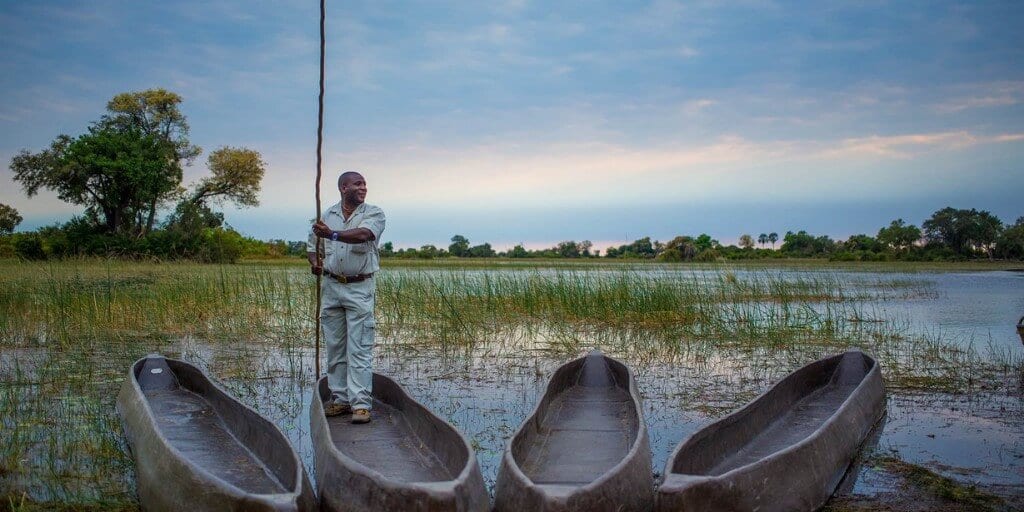
Take a mokoro ride through the delta
Horseback safaris
Riding safaris allow visitors to appreciate the scope and size of the delta, as well as access some of the most remote areas. Horseback safaris are something of a specialised activity, on offer at only a few delta lodges.
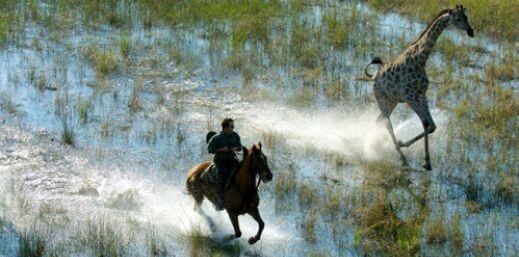
The Okavango Delta offers unique horse riding safaris
Walking safaris
Most delta lodges offer walking safaris to explore the islands and flood plains, allowing for a much fuller experience of the delta.
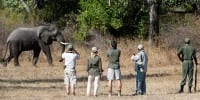
Up close and personal on a walking safari
Fishing is excellent in this region and angling enthusiasts can book fully escorted expeditions along the Boro Channel, a tributary that feeds the Delta. Tilapia (bream) is the most common species to lure.
Okavango Delta safari accommodation
At the heart of Botswana’s safari industry, the Okavango Delta features some of Africa’s finest safari camps and lodges, alongside a selection of quality campsites for self-drive safaris, and pretty much everything in between.
Aside from budget, the accommodation you chose in the delta will be driven by where in delta you want to stay. Like much of northern Botswana, the area around the Moremi Game Reserve in the Okavango Delta is divided into large private concessions. The 18 concessions of the Okavango Delta are limited to up to six camps, and are all run either privately or by community trusts. Staying in a concession rather than Moremi Game Reserve allows for more activity options, such as walking, horseback, mokoro and night game drives. Broadly speaking, camps in the delta can be split into either ‘wet camps’, offering water-based activities such as mokoro safaris and fishing and ‘dry camps’ offering conventional land-based wildlife viewing.
Given the differences between concessions and camps, it’s a good idea to try and stay at two or three camps in the Okavango Delta to get a broader safari experience.
There are a number of Okavango Delta game lodges to choose from if you’re looking for accommodation. Head to Chitabe Camp for an unbeatable location – it’s built on a photographic reserve on one of the most beautiful islands in the Delta. The private area is bordered by the Moremi Game Reserve for great activities during your stay.
Deep within the Delta on the island of Xaxaba, Eagle Island is another popular choice of camps. The tranquil location overlooks a lagoon and is surrounded by Ilala Palms for a relaxing retreat.
Families looking for a safari in the Okavango Delta can find a cosy place to stay at Oddballs Camp on the edge of Chief’s Island. Accessible only by light aircraft, you can get there via a 20 minute flight from Maun.
Okavango Delta malaria risk
The Okavango Delta is situated in a high-risk malaria zone, with a higher risk of contracting malaria during wet season (November to March). It’s highly advisable to take anti-malarial medication and to take additional safety measures such as using insect repellent and wearing long sleeves and trousers to cover any exposed skin. If you don’t want to take the risk of heading on safari in a malarial zone, neighbouring Namibia and South Africa both offer malaria-free safari options .
Okavango Delta map
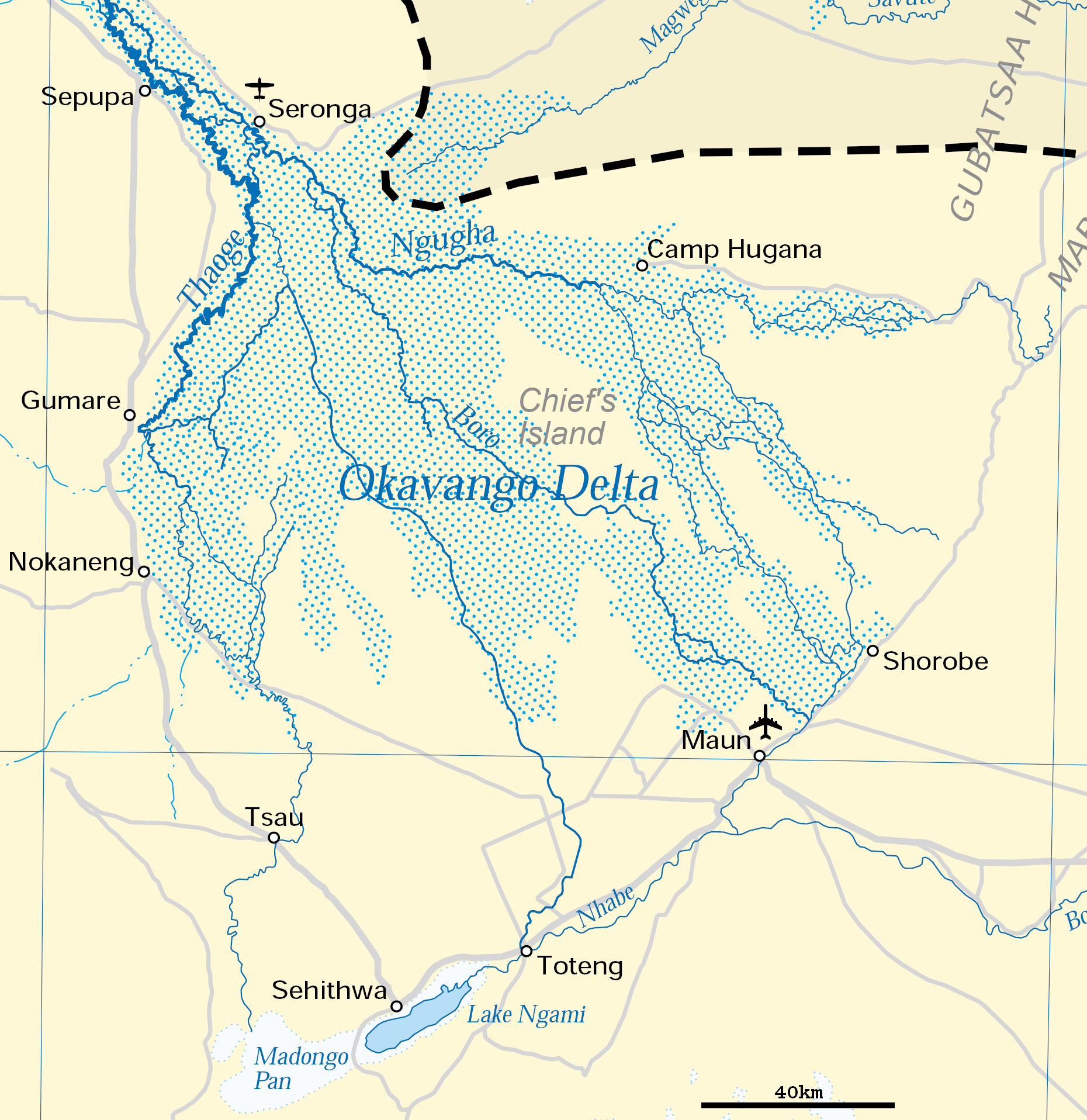
Map of the Okavango Delta area
Experience the Okavango Delta
Have you been an on Okavango Delta safari and have something to share? Please let us know in the comments section below.
Top countries for safaris
- Botswana safaris
- Kenya safaris
- Namibia safaris
- South Africa safaris
- Tanzania safaris
- Uganda safaris
Safari basics
- Safari animals
- How to find the right safari company
- When to go on safari
- What to take on safari
- Safari clothing – what to wear
- Safari rules & etiquette
- Wildlife spotting tips
Most read articles
- All about the ‘big five’ animals
- Collective nouns for animals
- Safari movies to watch before you go
- The world’s fastest land animals
- Apex predators
- 10 Fascinating African tribes
- The biggest animals in the world
- 17 Epic hybrid animals
- The world’s ugliest animals
- Why are flamingos pink?
Africa’s best game reserves
- Chobe National Park, Botswana
- Etosha National Park, Namibia
- Kruger National Park, South Africa
- Masai Mara National Reserve, Kenya
- Moremi Game Reserve, Botswana
- Okavango Delta, Botswana
- Serengeti National Park, Tanzania
Session expired
Please log in again. The login page will open in a new tab. After logging in you can close it and return to this page.
- 1 800 970 7299
- Live Chat (Online) Live Chat (Offline)
- My Wishlist
- Find a Trip
Your browser 'Internet Explorer' is out of date. Update your browser for more security, comfort and the best experience on this site.

Okavango Delta Safari Tours & Vacations
- Destinations
- Okavango Delta Safari Tours & Holidays
Heed the call of the wild in the Okavango Delta
Welcome to the world’s largest inland delta. Made up of maze-like waterways, flooded grasslands and lily pad-covered lagoons, the Okavango is a haven for wildlife . In fact, it boasts some of the best game viewing in Africa . One of the best ways to spot some of the local wildlife residents is aboard a traditional dugout canoe with a local poler. Keep an eye out for giraffes munching on vegetation, elephants splashing around in the shallows or even a pod of hippos hanging out in the plains. The fun doesn't stop when the sun sets—fall asleep to the croaks, rattles and chirps of African critters at a campsite nestled deep in the wilderness.
Our Okavango Delta safaris
Okavango experience, 10 days from 1820.
Tour through Johannesburg, Maun, Chobe, the Okavango Delta and Victoria Falls on a ten...
Explore Southern Africa
18 days from 3595.
Spend some time exploring Botswana, South Africa and Zimbabwe with included safari...
Cape Town to Vic Falls
22 days from 3017.
Spend three weeks exploring South Africa, Namibia, Botswana and Zimbabwe, from Cape...
Botswana Highlights
9 days from 2430.
Discover the culture, wildlife and waterways of Botswana on this upgraded adventure...
Experience Southern Africa
16 days from 4000.
Visit Africa and travel through southern Africa's beautiful regions. Visit South Africa...
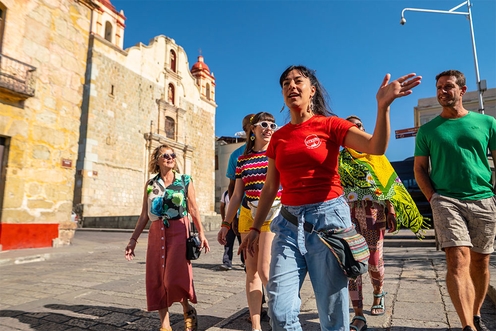
Tailor-Made trips
Take four or more on an exclusive trip and tailor your itinerary
Botswana Adventure
10 days from 4860.
Visit Africa and travel through Botswana, Namibia and Zimbabwe on a tour from Windhoek...
Botswana Family Safari with Teenagers
10 days from 2012.
Take your family to Victoria Falls, Okavango River and Chobe National Park on this teen...
Real Southern Africa
17 days from 2185.
Four countries, eight national parks, 17 days, hundreds of animals, thousands of birds,...
Amazing Southern Africa
22 days from 8471.
Jump onboard an exhilarating journey from Cape Town to Victoria Falls through the...
Vic Falls to Cape Town
22 days from 2941.
Discover the unique and contrasting lands of Zimbabwe, Botswana, Namibia and South...
Cape Town to Zanzibar
41 days from 5785.
See Africa on this incredible overland adventure from South Africa to Tanzania. Soak up...
Okavango & Beyond
9 days from 2172.
Travel from Zimbabwe to South Africa via Botswana. The Okavango and Beyond trip is the...
Southern Africa Adventure
30 days from 4741.
Take a month long southern African adventure from Cape Town into Namibia, Botswana and...
Africa Encompassed Northbound
64 days from 12940.
This epic journey with explores Southern Africa in detail including Botswana, Kenya,...
Johannesburg to Kenya
37 days from 7045.
Travel the waterways of Botswana, the beaches of Zanzibar and the savannahs of the...
Cape Town to Kenya
49 days from 8230.
Experience the ultimate African adventure on this epic trip including Kenya, Botswana,...
Essential Botswana
9 days from 1195.
Four countries, at least five national parks, hundreds of animals, thousands of birds,...
Africa Encompassed Southbound
63 days from 10931.
Set out on a mighty African adventure through Kenya, Uganda, Tanzania, Malawi, Zimbabwe...
Zanzibar to Cape Town
40 days from 4969.
Explore Africa on an epic wildlife-rich adventure from Tanzania to South Africa while...
Kenya to Cape Town
48 days from 8455.
Tour Africa's best from Kenya to Cape Town through Tanzania, Zanzibar, Malawi, Zimbabwe...
Johannesburg to Gorillas
52 days from 11780.
Experience the waterways of Botswana, the beaches of Zanzibar, the savannahs of the...
Johannesburg to Zanzibar
29 days from 4785.
From Johannesburg to Botswana, Victoria Falls, Zimbabwe, Zambia, Lake Malawi and...
Okavango Delta safari highlights
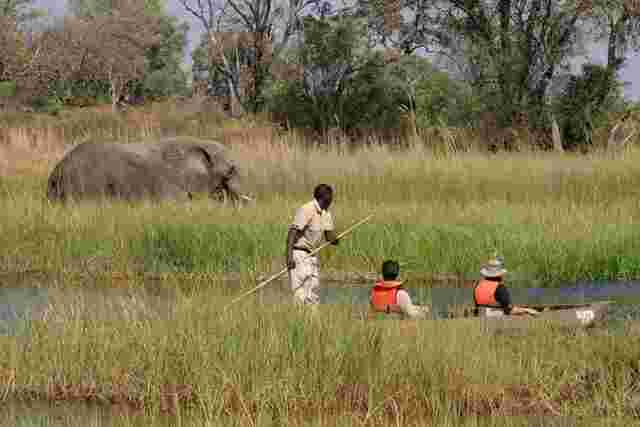
Marvel at the delta on a mokoro
Hop aboard a mokoro (traditional dugout canoe) to cruise the Okavango Delta's lush wetlands with an expert local poler. As you paddle through the snaking waterways (read: hippo highways), keep your eyes peeled – and have your camera ready – for elephants, antelope, rhinos and warthogs among other large game. This incredible ecosystem is also home to many smaller critters, including exotic birds and frogs.
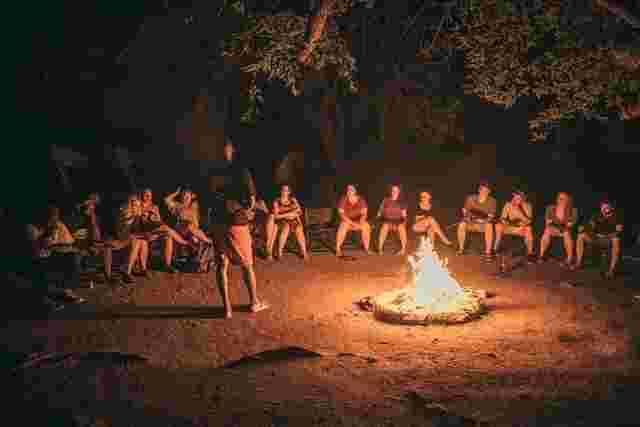
Camp on a remote island
It's not every day you can camp on a remote island in one of the world's best game parks. There might not be electricity or running water, but this doesn't matter when you have front-row seats to the Okavango sunset and the ambient sounds of the African bush to sing you to sleep – wait, is that grunting noise a hippo or your fellow camper snoring?! If camping's not your thing, you might like to stay on a houseboat .
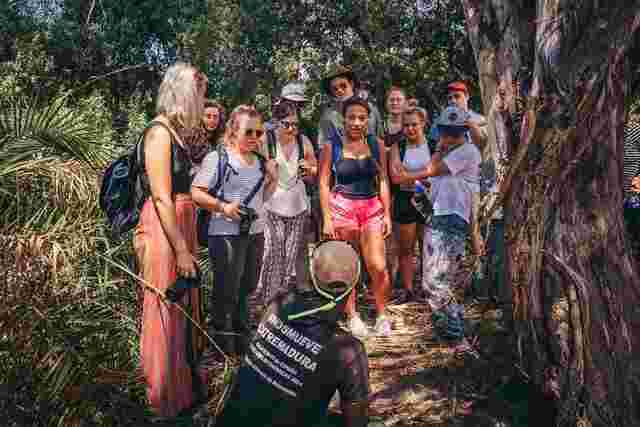
Discover the wonders of sunrise
The early bird catches the worm – or in this case, elephants and maybe Cape buffalo! Wake up before the crack of dawn for a sunrise walk on one of the many Islands in the Delta Panhandle. Listen to the birds chirp as the sun gradually peeks over the plains, watch wildebeests grazing on the grass and keep a lookout for lion paw prints in the dirt. How's that for a wake-up call?
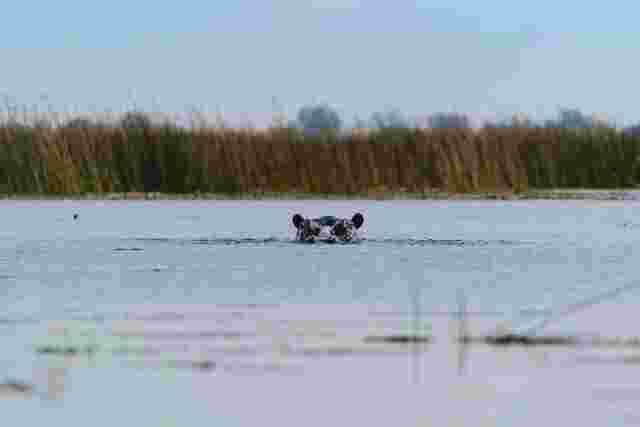

Say hey to a hippo
Grab a sundowner and get ready to get up close (but not personal) to one of the largest land mammals on the planet. Weighing in at 4400 lbs, seeing a pod of hippos may, quite literally, take your breath away. They spend most of their days bathing in the water and come out when the sun sets to graze on the vegetation in the flood plains. You'll probably hear their loud honking noises before you see them.
Okavango Delta tour reviews
Okavango delta faqs, do i need a covid-19 vaccine to join a okavango delta safari.
Trips from 1 January 2023 onwards
From 1 January 2023, Intrepid will no longer require travelers to provide proof of vaccination against COVID-19 (excluding all Polar trips and select adventure cruises). However, we continue to strongly recommend that all Intrepid travelers and leaders get vaccinated to protect themselves and others.
Specific proof of testing or vaccination may still be required by your destination or airline. Please ensure you check travel and entry requirements carefully.
Learn more about Intrepid's COVID-19 policy
When's the best time to go on safari in the Okavango Delta?
The Okavango Delta is a year-round safari destination, but the best game viewing is generally considered to be from May to September during the dry winter months. It's usually easier to spot animals as vegetation is thinner. The wet season sees thicker vegetation and animals dispersing across the park, however, there's still a high concentration of wildlife. If you like birds, the wet season is a birdwatcher's paradise.
Am I guaranteed to see animals?
We can’t guarantee you’ll spot the Big 5, but you’d have to be profoundly unlucky to see no animals at all. On our Okovango safaris, you’ll have front-row seats to some of the best game viewing in the world. This protected reserve is filled with a huge variety of species and your expert driver and local leader will be on hand to point you in the right direction (literally).
What are the "Big Five"?
The “Big 5” used to refer to the five big game animals that were the most difficult to hunt. Now that most shooting is done on a camera, the Big 5 are the most exciting animals to spot while on safari: the lion, leopard, rhinoceros, elephant, and Cape buffalo.
What should I pack for an Okavango Delta safari?
Loose, light layers in neutral colors are the best attire for a safari (dark colors will get hot in the sun and can attract the Tsetse fly). You’ll also want a sun hat, some good walking shoes, a camera, sunscreen and bug spray. For more details, check out our ultimate Africa packing guide .
What type of food will be served on safari?
It depends on the trip style you've chosen. On our Basix trips, you’ll have a cook traveling with you who'll whip up a variety of local and Western-style dishes. Along your route, your cook will stop to purchase fresh, locally sourced food for your meals. You can expect a variety of things for breakfast like fruit, eggs, toast and cereal; lunch is often sandwiches and salads; and dinner is usually a hearty meal like pasta, curry or a BBQ.
On our Original and Comfort trips there'll be more meals at camps and lodges along the way. One thing's for sure: you definitely won't be going hungry on safari!
What are the toilets and showers like on safari?
Most of the permanent tented camps will have private bathrooms with flushing toilets and showers with warm water.
Many of the campsites we stay at have communal facilities with flushing toilets and showers with warm water. However, in some of the more remote areas, there may only be basic facilities (toilets and cold running water).
Will I be able to use my cell phone on safari?
Some of our hotels and campsites will have Wi-Fi, however, internet and phone access may be limited in more remote areas. But you won’t think twice about emails and social media when you’re watching a pride of lions prowl through long grass or enjoying a drink around the campfire with your group.
Are Intrepid's Okavango Delta safaris accessible for travelers with disabilities?
We are committed to making travel accessible to everyone, so we will work with you to assess whether you will be able to complete an existing itinerary, or whether we will be able to make reasonable adjustments to meet your needs before you book. Please see our accessible travel page for more information.
Read more about travel in Botswana
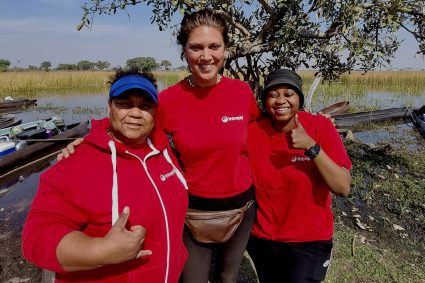
Jan 25, 2024
A trio of intrepid women is shaking....
This trailblazing all-women overland crew in southern Africa is challenging...
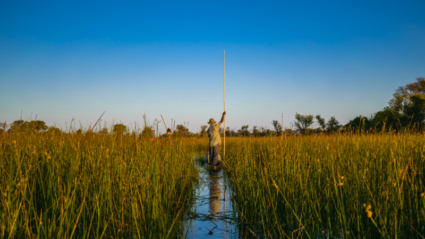
Jul 12, 2023
The top 8 destinations for travel in....
From sipping schnapps in Sweden to tracking endangered mountain gorillas in Rwanda...
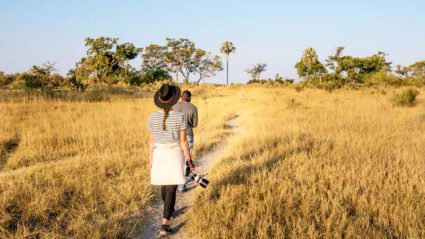
May 24, 2023
Chobe vs okavango: which one should....
We’ve put these Chobe and Okavango head to head in an epic ‘safari battle’. Who's...
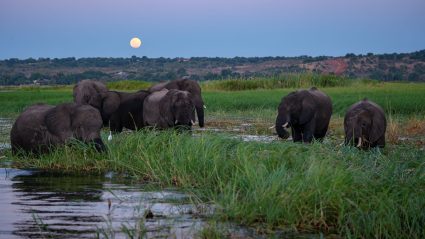
Nov 28, 2023
Brewing a better future: how okavango....
When’s the last time you had a beer that made life easier for an elephant? This...
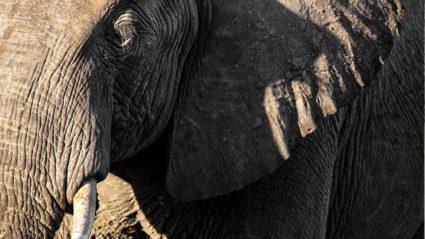
Mar 21, 2017
Africa through the lens with....
Yep, this year we're launching a one-of-a-kind expedition into the wilds of Africa...
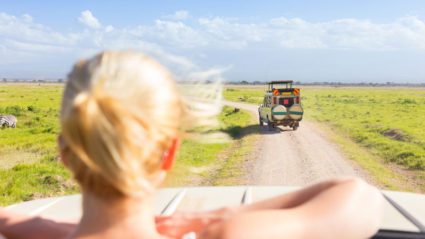
May 15, 2017
A language guide for southern africa.
Learning a few words in the local language will gain you a lot of respect. So to...
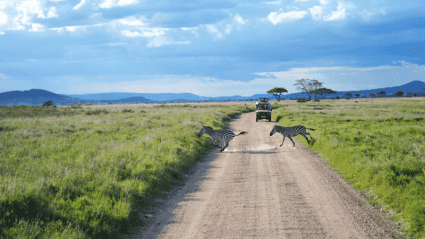
Aug 09, 2018
How to choose your ideal african safari.
Fancy taking a walk on the wild side? An African safari offers up the ideal...
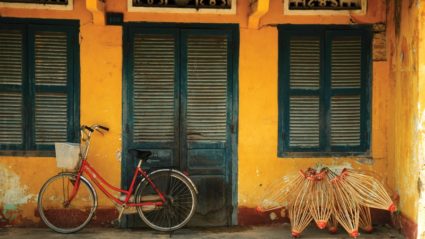
Feb 08, 2018
Valentine’s special: meet your ....
No sweetheart this year? No worries. Choose travel instead this Valentine’s Day!...
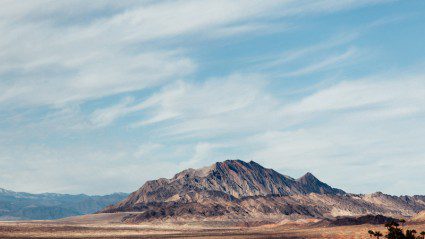
Mar 27, 2015
7 awesome beach-free summer breaks.
Who needs sun and sand? We've got the perfect alternative.
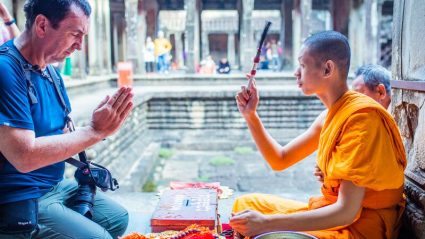
Feb 25, 2019
10 destinations that want you to be a....
As the responsible travel movement gains momentum, more countries are asking...
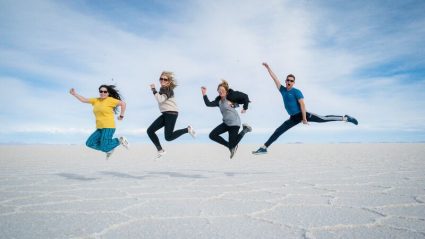
Oct 13, 2020
Lonely planet’s ultimate travel list....
We’re unpacking Lonely Planet’s top ultimate travel experiences, so when it’s safe...
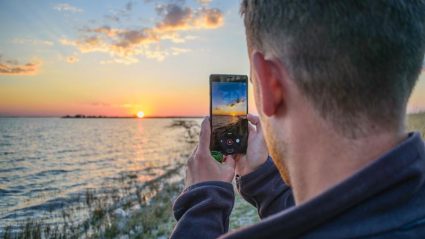
Dec 25, 2018
20 photos that will make you want to....
Heading on a safari had always been a dream of mine. I wanted to get up close and...
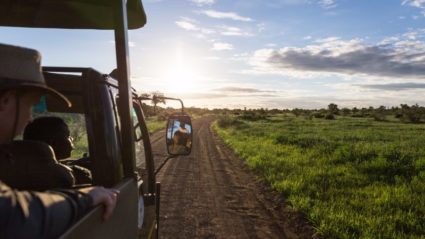
May 24, 2017
A road trip through southern africa.
If I was going to go to the other side of the world, I wanted to see how people...
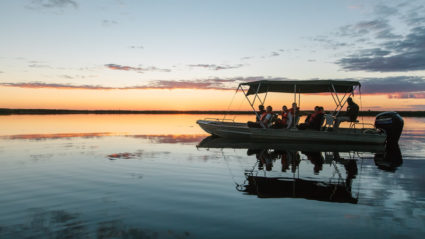
Mar 30, 2018
What it’s really like exploring....
My responsibilities were limited to packing up my gear in the morning, returning...
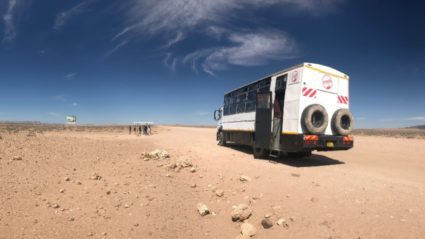
Aug 15, 2018
10 accessories you’ll be glad you....
You'll be glad you packed these essentials on your next overland adventure.
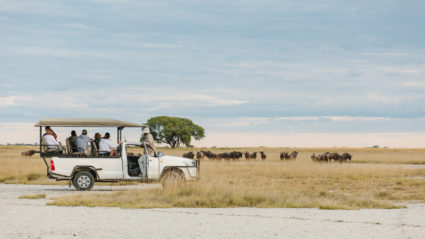
Oct 24, 2017
Botswana in photos: the magic of an....
Three countries, nine days, and more incredible animal encounters than you could...
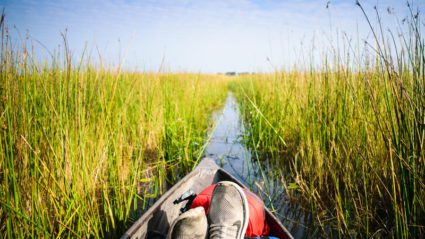
Sep 21, 2018
What it’s really like experiencing....
Full disclosure: the Okavango Delta in Botswana was my #2 fear on my Cape Town to...
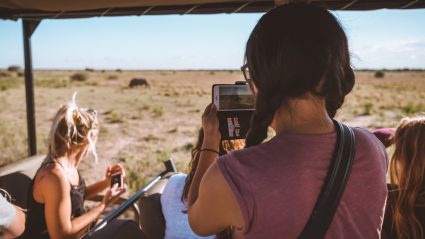
Dec 13, 2018
5 reasons why your next family....
If you’re not afraid to dig a bush toilet and skip a few showers, a family holiday...

Okavango Delta Safari
The Okavango Delta , located in the heart of Botswana , is one of Africa’s most stunning and diverse ecosystems, with fascinating rivers, grasslands, and islands. With our exploration of Okavango Delta safari possibilities, you may go on an amazing journey into the heart of untamed wilderness. There are numerous safari options available to travellers looking for an unforgettable experience in this UNESCO World Heritage Site. From traditional game drive safaris and walking safaris to mokoro excursions , each safari option promises a distinct perspective on the Okavango Delta’s extensive biodiversity, allowing an opportunity to observe the beauty of this natural environment. Let us journey through the many safari options, revealing the magic that makes the Okavango Delta a must-see destination for safari .

What Wildlife is in the Okavango Delta?
The Okavango Delta is one of the best places in Africa to see the Big Five (lion, leopard, elephant, buffalo, and rhino). On the Duba Plains in the Okavango Delta, there is a fairly permanent herd of about a thousand buffalo and lions that occasionally hunt them. As a result, you can almost always expect to observe a lion kill in this area. Cheetah , wild dog , lion, leopard , and hyena are the top predators in the Okavango Delta. Large groups of elephants also dominate the area in search of water and food. Springbok , impala , tsessebe , and the rare red lechwe are frequently seen.

Are there Lions in the Okavango Delta?
The Okavango Delta boasts a thriving population of lions , which some claim are significantly larger than any lions found elsewhere. The abundance of buffalo and other prey species creates an ideal environment for these lions to thrive. Here, amid the intricate waterways and landscapes, the Okavango Delta offers a unique habitat that sustains a lion population that often walk and sometimes swim through water.
Okavango Delta & Chobe Safari – 10 Days
Discover why Botswana is one of Africa’s premier wilderness locations with the 10-day Botswana safari. Experience the astonishing wildlife of the Okavango Delta, Khwai River, Moremi Game Reserve and Kazuma Forest Reserve as you spend your nights at some of Botswana’s top lodges and camps.
3 Nights at Mogotlho Safari Lodge, Khwai River
On arrival at Maun Airport, you will be met by the friendly Hideaways team with true African hospitality and transferred by road to Mogotlho Safari Lodge , your comfortable home for the next three nights.
3 Nights at Delta Camp, Moremi Game Reserve
After your last breakfast at Mogotlho Safari Ldoge, you will be transferred by road to the Khwai Airstrip for your charter flight to Delta Camp . Get your first glimpse of the Okavango Delta’s vast expanse and its crystal-clear channels, lagoons, sweeping floodplains and countless islands. Over the next three days, you can explore this area on foot and on mokoro excursions.
3 Nights at Camp Kuzuma, Chobe
With body, mind and soul satisfied, you will fly to Kasane Airport for your next stay at Camp Kuzuma. After arrival, enjoy lunch before taking to the water for a cruise on the Chobe River (dependent on arrival time). Following your water safari, you will be transferred to Camp Kuzuma where you will spend the next three nights. Your stay at Camp Kuzuma in our 11 000 hectare concession will bring amazing wildlife encounters as animals crisscross this wilderness in abundant numbers. It is regarded as the world’s busiest elephant corridor as these members of the Big Five make their way through the surrounding bush.
Book Your Okavango Delta Safari
Get in touch with our dedicated reservations department, where our consultants are eager to assist you in selecting the ideal destination and lodge that perfectly aligns with your preferences. Let our experts guide you through the exciting possibilities and help you craft a trip that will create lasting memories.
Home / Botswana / Okavango Delta Safari

Flavours of Africa with Nantwich Lodge
An African Safari is a sensory experience. From the moment you step out of the plane onto the tarmac, the

A Time-Lion from Mogothlo Safari Lodge
The Khwai River area and the Mababe concession are renowned for the wild and untamed, Mogotlho Safari Lodge standing true
Plan Your Safari
Get in touch with our dedicated reservations department, where our consultants are eager to assist you in selecting the ideal destination and lodge that perfectly aligns with your preferences. Let our experts guide you through the exciting possibilities and help you craft a trip that will create lasting memories.
Explore our Destinations

Lake Kariba, Zimbabwe
Lake Kariba is the world’s largest man-made lake and reservoir by volume. It lies approximately 1 300 kilometers upstream from the Indian Ocean, along the

Matusadona National Park, Zimbabwe
Matusadona National Park, nestled along the picturesque shores of Lake Kariba, is a breathtaking natural gem that boasts a diverse range of flora and fauna.

Hwange National Park, Zimbabwe
Hwange National Park is the scene of an impressive wildlife spectacle in northwest Zimbabwe. The largest nature reserve in the country, it occupies around 14

Matopos, Zimbabwe
Matopos, also known as Matopo Hills, is an area located in Matobo National Park, South East Bulawayo, Zimbabwe, characterized by a striking assemblage of granite
- Okavango Delta
The Okavango Delta is a sanctuary for the senses.

A little bit about the Okavango Delta
Where to begin? As soon as your small aircraft lands in this UNESCO World Heritage site, you will see for yourself what makes this part of Africa truly unique.
The Okavango Delta is a 360° panoramic Garden of Eden, with fairytale lagoons, dense forest, extensive savannahs, superb wildlife and over 400 bird species. All accommodations are small scale and personal – you just have to kick back and go with the flow.
Going on a safari in the Okavango Delta
There are some things you need to know before setting off to Okavango Delta in Botswana.
What is the best time to travel to Botswana? Do I need any special equipment? What wildlife will I see? You probably have a lot of questions. Start making your bucket list as you read more about your safari trip in the sections below. Find a question unanswered? Make use of the contact form below and we will be happy to assist you!

About the Okavango Delta
There is no other place in Africa where so many ecosystems seamlessly congregate. Where else can you discover this while sitting in a canoe, poled along by an African gondolier?

Okavango Delta special offers
Waiting for that special offer, one that seems tailor-made for you? Our Okavango Delta deals are outstanding values for the money, so we hope to see you soon!

Getting to the Okavango Delta
Wherever you want to go in the Okavango Delta, it all starts at Maun: a small but bustling town and the capital of the Kalahari Desert. Fly in directly from Johannesburg or Cape Town!
The exquisite food, privacy, the elephant experiences, private game drives and top-notch accommodation, staff (especially manager Aaron) left nothing for us to wish for...
Don't miss the mokoro ride, it's a great opportunity to experience the area a different way.
It was much different than the other safari's we were on, with the safari trips being on water (canoe and boat) or on foot, so we could really examine the wildlife.

Okavango Delta lodges & camps
A personal viewing deck to watch a watering hole attracting thirsty wildlife? Of course. An outdoor shower to start the day in crisp morning dew? No problem. Five star meals served around a crackling fire? Only here.
A head full of amazing memories needs a soft bed for the night. All of our accommodations are luxurious, eco-friendly and provide a true Okavango Delta experience. We love to help you find your home away from home.
- Price $$$$$
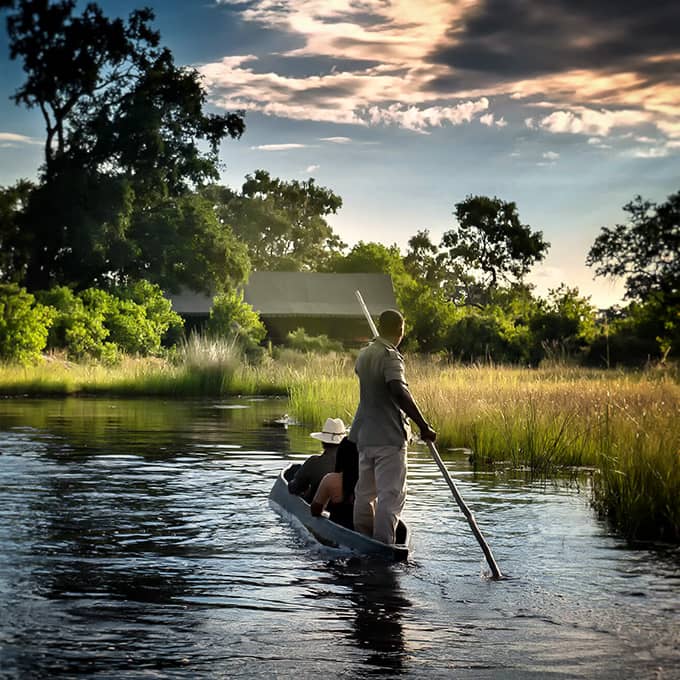
Duke's Camp
lodge style A secluded Okavango oasis
Discover Duke's Camp, an exclusive luxury retreat nestled in the heart of the Okavango. Named in honor of its guardian, Sarefo 'Duke' Sarefo, this camp offers unparalleled wildlife experiences and world-class accommodations.

from US$ 934 per person per night
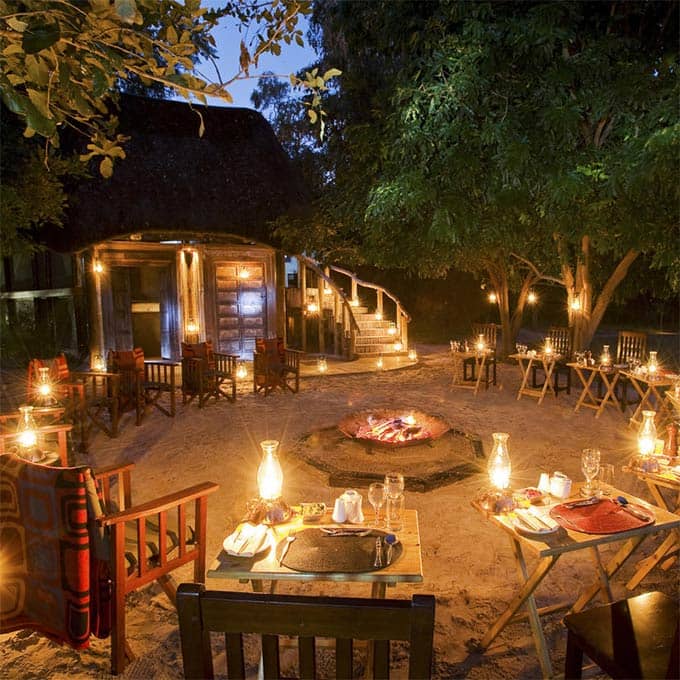
Selinda Camp
lodge style Nourishment for the soul
Where all the splendors of nature come together – water, lush land and African skies - is an exclusive camp. A warm place for families, couples and groups, and perfect for everlasting memories: welcome to Selinda Camp.
from US$ 1,884 per person per night
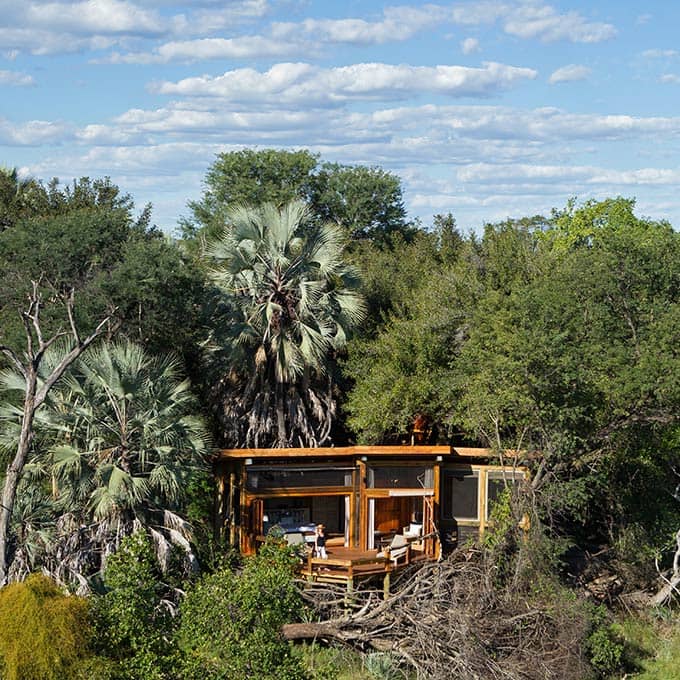
Camp Okavango
lodge style Relaxing, timeless, African
Enchanting, quiet, and relaxing: Camp Okavango is an unaffected paradise, located on a remote island in the delta. Discover this area by traditional mokoro, motorboat or foot – and be sure you take time to meet Alex, the local hippo.

from US$ 629 per person per night
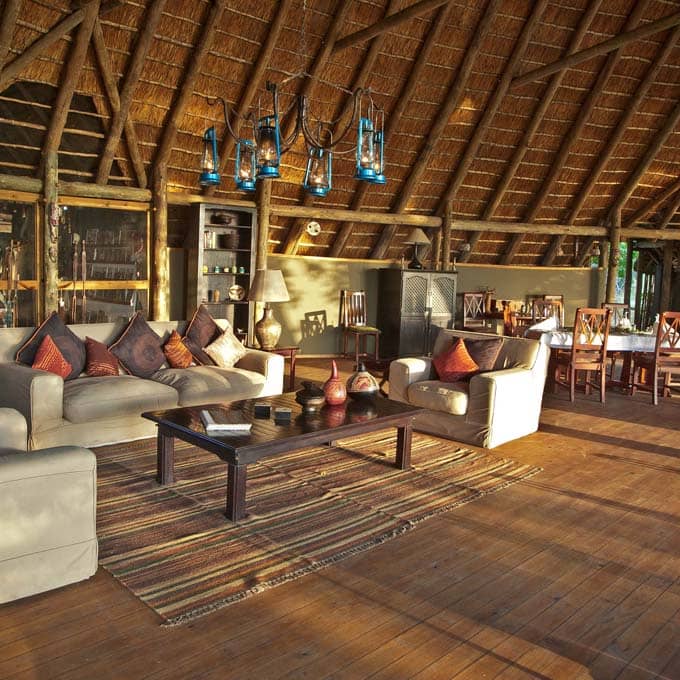
Pom Pom Camp
lodge style Soulful safari
With an emphasis on a soulful nature experience, the vintage, well-appointed, tented camp Pom Pom Camp couldn’t be in better location: in the heart of the delta, surrounded by crystal clear channels where you will find a tranquil, intimate safari spot.
from US$ 599 per person per night
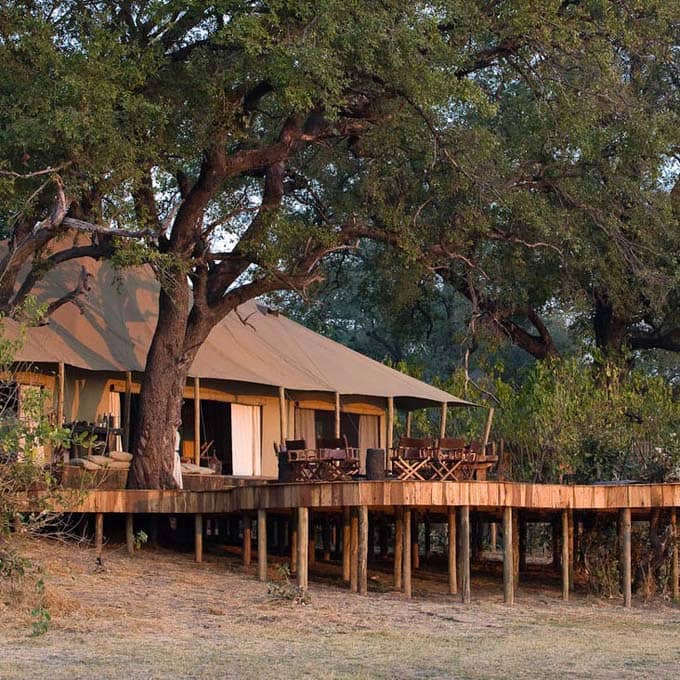
Zarafa Camp
lodge style Pure perfection
‘Have no fear of perfection, you will never reach it’, as Salvador Dali once stated. At Zarafa Camp, this statement is overthrown. From the views, till the best safari bed and a complimentary professional camera to use: they shouldn’t change a thing.

lodge style Elephant encounters
Trunks, tusks and trumpeting: Abu Camp is where you want to be for a true elephant experience. Located in Botswana’s Okavango Delta, you can prepare yourself for some splashing with elephants, so take the plunge into their world.

from US$ 2,490 per person per night
&Beyond Sandibe Okavango Safari Lodge
lodge style Spectacular design
Incredible jaw-dropping design, luxurious, modern decorated suites, healthy and nutritious food; this is where you come for around-the-clock pampering and de-stressing, plus the best wildlife viewing in Botswana's spectacular Okavango Delta.
from US$ 1,850 per person per night
&Beyond Nxabega Okavango Tented Camp
lodge style Welcome home
Nxabega means ‘Place of the Giraffe’, but besides the giraffe, there is big variety of wildlife to be seen around this luxurious, yet warm and neighborly &Beyond Nxabega Okavango Tented Camp. A bonus: all tents have recently been refurbished!
from US$ 1,270 per person per night
&Beyond Xaranna Okavango Delta Camp
lodge style Gentle as a water lily
Located on a Delta island is a wholehearted camp, with the serenity and calmness of a water lily floating in clear Botswana waters: this is Xaranna Okavango Delta Camp. Unwind and experience a constant flow of African hospitality.
from US$ 1,495 per person per night
Sanctuary lodges
lodge style Sanctuary retreats
Sanctuary Retreats boasts some extraordinary safari lodges in the Okavango Delta: Baines' Camp and Stanley's Camp. Sanctuary offers delightful luxury accommodations provide an elegant contrast to the rugged nature of the Okavango.
from US$ 1,024 per person per night
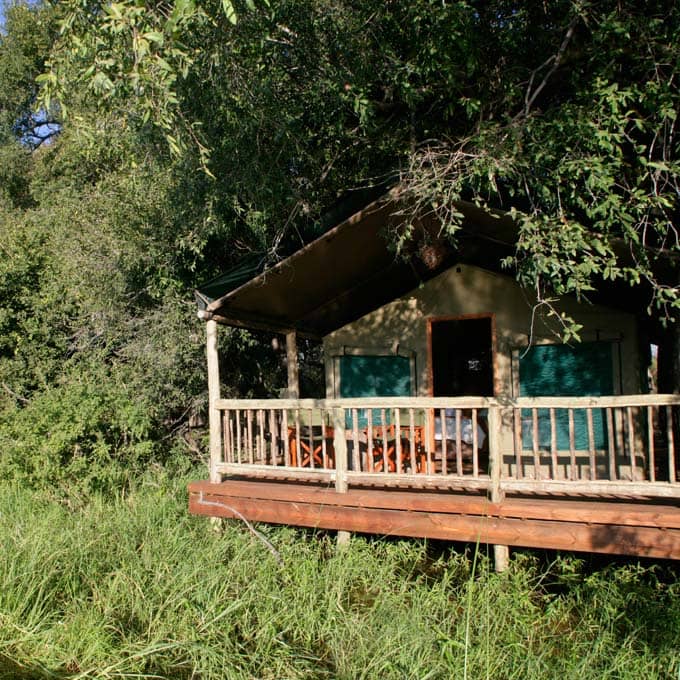
Moremi Crossing
lodge style Brand-new safari spot
Island camping, motorboat excursions, sunset cruises – become part of the bustling river life at this quaint, new gem in the Okavango Delta. This camp combines the timeless simplicity of nature’s splendour, with the latest eco-friendly techniques.
from US$ 450 per person per night
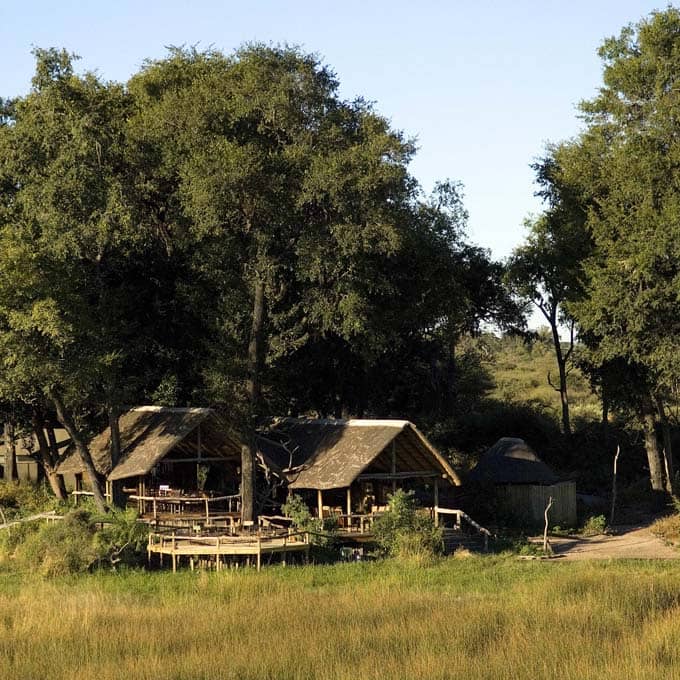
Duba Plains Camp
lodge style Lion-spotting paradise
Breathtaking, wonderful staff, best safari experience so far – these phrases are just a selection of the reviews written about Duba Plains Camp in the Okavango. Explore this accommodation yourself and discover why everybody wants to return.
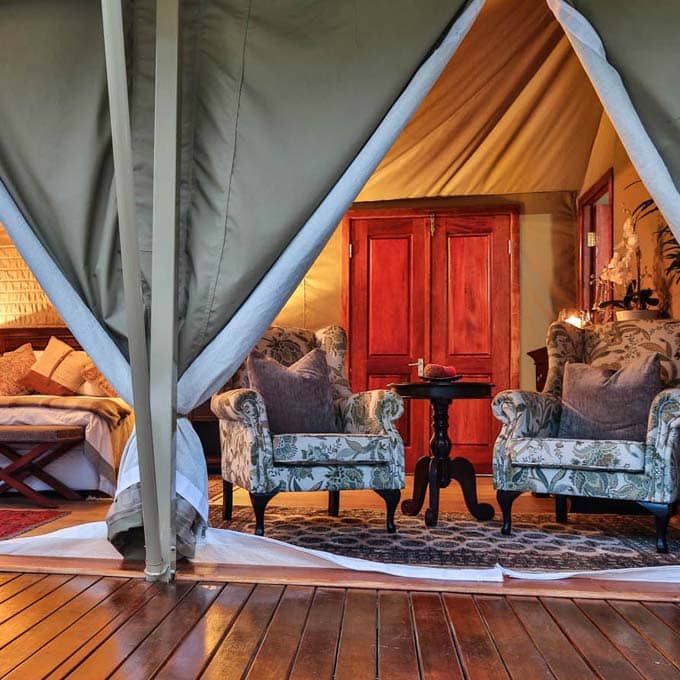
Kadizora Camp
lodge style Lavish luxury safari
On a peninsula, beneath a majestic stand of trees, with uninterrupted panoramic vistas of the Okavango Delta, there is a beautiful, new and intimate camp: Kadizora Camp.

from US$ 499 per person per night
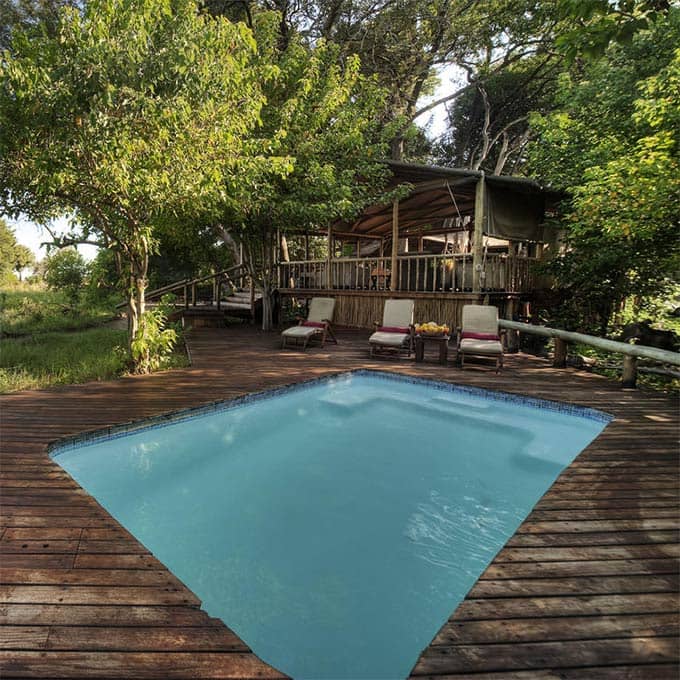
Kwando lodges
lodge style Kwando safaris
Kwando Safaris operates two wonderful safari camps in the heart of the Okavango. Kwando offers an unique safari experience - from decor to the amazing attention to detail.

from US$ 864 per person per night
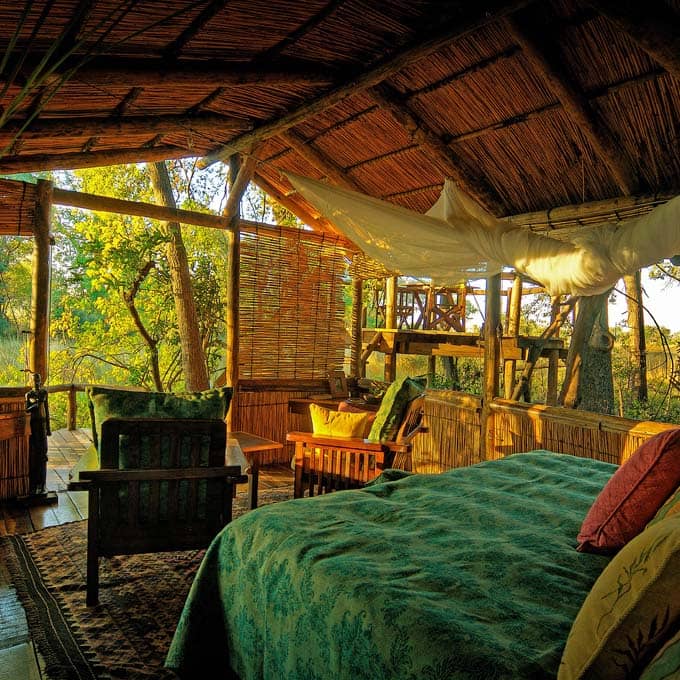
lodge style Solar powered safari
With a personal guide (who grew up in the area) devoted to you throughout your stay, this camp offers a tailor-made safari experience and a homey and laid-back vibe.
from US$ 492 per person per night
Wilderness Safaris lodges
lodge style Wilderness collection
The Wilderness portfolion consists of thirteen wonderful individual properties, so there's always one that suits your taste! Choosing multiple lodges also allows you to see and experience different sections of the Okavango adding to your overall safari experience.
from US$ 679 per person per night
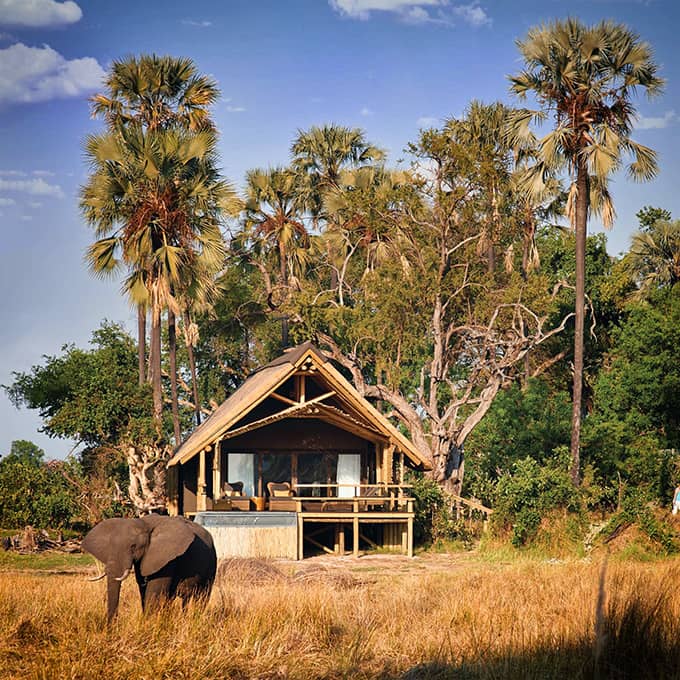
Belmond Eagle Island Lodge
lodge style Unspoilt splendor
This wonderful, far-flung, relaxing African safari retreat is located in one of the most scenic areas of the lush Okavango Delta. At Belmond Eagle Island Camp you will feel like you are walking on air, but realise quickly that floating on water is even better.
from US$ 834 per person per night
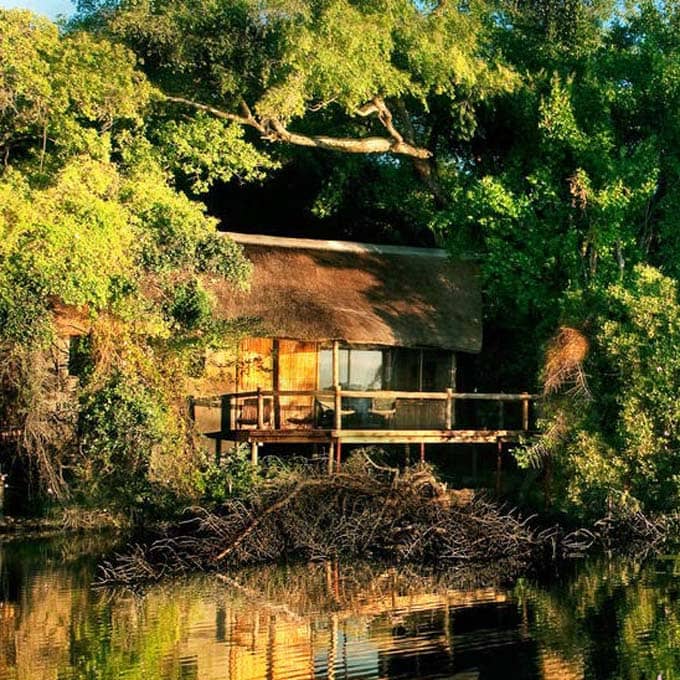
Xugana Island Lodge
lodge style Safari serenity
Let Fred, Julia and the dedicated staff embrace you with hospitality and become part of the warm Xugana family. Here, the air is filled with tranquility, hospitality and adventures – a paradise under a canopy of trees where forever cherished memories are made.
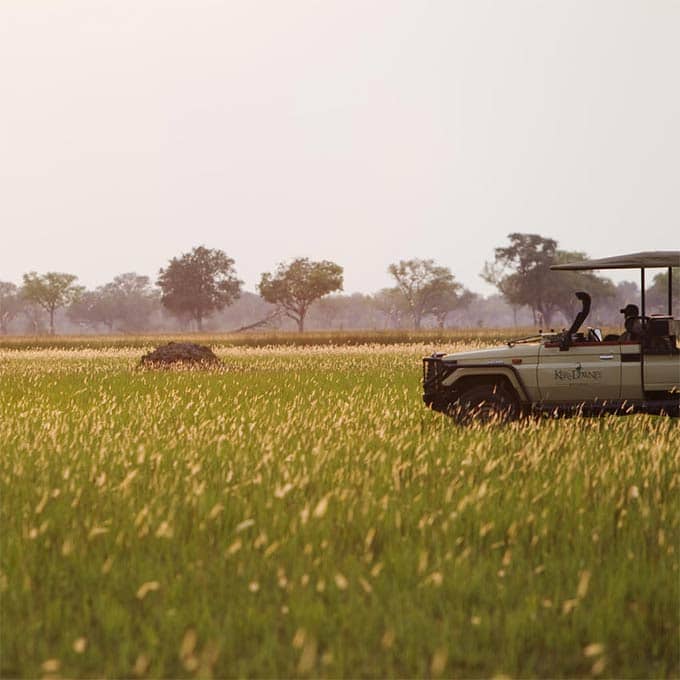
Ker & Downey Okavango lodges
Famous for its outstanding safari operations, Ker & Downey Botswana offers a portfolio of four magical Okavango Delta safari lodges. Whether you are staying at Shinde or Kanana, you can rest assured to experience only the best of the Okavango.
from US$ 634 per person per night
&Beyond Xudum Okavango Lodge
lodge style Glamorous gleam
From one of nine rooftop hideoutsa at &Beyond Xudum Okavango Lodge, you will find yourself overlooking a fairy-tale like lagoon with a patchwork of water lilies. In the distance grazing zebras, right behind you a beautiful, luxurious safari suite.
from US$ 989 per person per night
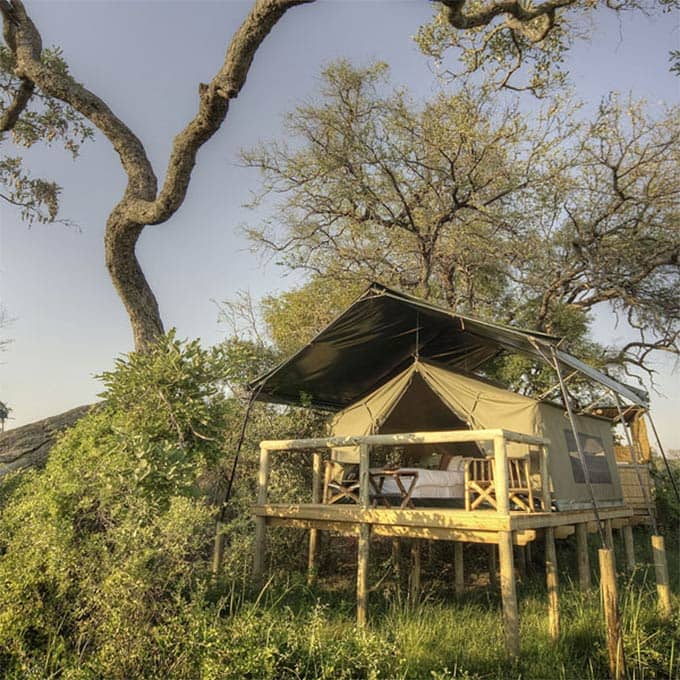
Oddballs Camp & Oddballs Enclave
The two wonderful Oddballs Okavango camps have something to offer for everyone. While Oddballs Camp is world renowned for its perfect setting, Oddballs Enclave -due to its small size- offers the perfect setting for a break with family or friends.
from US$ 318 per person per night
Sandibe is architecturally spectacular and a wonderful place to stay, with excellent food and very accommodating service.
For starters, the food was out-of-this-world good, and the chef (Herman) was unbelievably friendly!
Uncrowded game drives. boat and canoe rides to see elephant, zebra, giraffe, ostrich, wild dogs, lion, cheetah. crocodile, hippo, many birds.
Okavango Delta video
The best way of getting an idea what the Okavango Delta is about is by seeing some incredible footage from the area. View this video of Camp Okavango to experience one of the lodges and wildlfe in the delta.
Be careful, after watching this video you can be sure that you want to travel to Botswana. Today.
We so enjoyed the boat trips, big and small, the helicopter ride was the BEST and a must, and sundowners on the overlooking the delta were great.
As we were in our boat, just as the sun was going down, a male elephant came out of the reeds and crossed the lagoon right next to us - simply magical.
This area of the Okavango is stunning, with both deep water channels and open park-like grasslands with beautiful trees that go on forever. Watching the red lechwe fly over the water is grace itself.
Send your enquiry
We hope you have found all information needed to decide that Okavango Delta is the perfect place for your next travel adventure. Still have questions? Or maybe you would like some more specific information about the different lodges? Please fill in the contact form and we will get back to you soon!
- Maun, Botswana
- [email protected]

Okavango Delta

The quintessential delta experience : game drives in open safari vehicles and gliding in silence through the waterways on an African-style gondola carved from a single tree.
Access into the Okavango Delta is difficult, getting around is difficult, carting supplies in and waste out is difficult. These are all good things for this vast wildlife wilderness is utterly picturesque and devoid of human influence .
If constant close-ups of elephant, buffalo, lion, giraffe, hyena, jackal and plenty of large and small antelope start to grow old, there's always the chance encounter with cheetah, leopard, wild dog, and red lechwe to spice things up.
Birds rightly favour the delta's abundance of supply and the delta favours an abundance of birds. Distinct riverine and woodland habitats attract a wider diversity of birds and some of the rarities you might see include Pel's fishing owls, narina trogons, white-backed night herons, African skimmers, bat hawks, wood owls and carmine bee-eaters.
Moremi Game Reserve , Chiefs Island the Moremi Tongue cover most of the delta and protect most of the wildlife. Safaris in the Okavango can be entirely on water, entirely on land or a combination of both . July to September is high water season in the delta and this period coincides with the Botswana dry season, making for the best game viewing and the best scenery.
Talk to your Travel Expert about your land- and water-based Okavango Safari - we know where to go and when to go for the best of both worlds.
The Formation of the Okavango Delta
A kink in the Kavango River, rising several thousand km away in the Angolan highlands, diverts the river from its natural course towards the Indian Ocean via the Zambezi into the flat sand basin of the Kalahari in Botswana.
Here the river fans out into a palm-shaped network of river scouts that year after year seek a path to the sea. Not to be, as the Kalahari snuffs out their attempts as the water drains into the earth to form the world's largest inland delta spanning 15,000 sq km at its peak.
The Kavango River takes several months to reach its destination and when rivulets begin to fill the the seasonal channels, Botswana's wildlife is on full water rations. Trekking for many days, elephant, buffalo and large herds of plains game leave their rapidly drying hinterlands and head for the communal wetlands in the dry winter months from July to September.
High water is a time of plenty for the herbivores in the delta but their concentrations make for easy pickings. High water is also a time of plenty for the predators, who previously ranged far and wide during the wet season in search of their dispersed quarry.
Favourite Tours & Safaris

Private Guided

Meet the Team

"NTS organized the trip wonderfully!"
We felt that the trip kept getting better every day
"The trip of our lives!"
Everything was excellently planned by Ashlee at Namibia Tours & Safaris.
"A truly wonderful and memorable trip"
Namibia, it's countryside, people and wildlife really should be on everyone's bucket list of places to visit!
"Absolutely a five star experience with this great company!"
Super clear communication, great recommendations and just really clear logistics.
Quick Enquiry
Subscribe to our newsletter, get in touch.

social media

Okavango Delta
About okavango delta.
The Okavango Delta is a unique pulsing wetland. More correctly an alluvial fan, the delta covers between 6 and 15 000 square kilometres of Kalahari Desert in northern Botswana and owes its existence to the Okavango (Kavango) River which flows from the Angolan highlands, across Namibia’s Caprivi Strip and into the harsh Kalahari Desert.
Each year the Okavango River discharges approximately 11 cubic kilometres (1.1 × 10¹³ litres) of water into the Okavango Delta. Most of this water is lost to transpiration by plants (60%) and by evaporation (36%) with only 2% percolating into the aquifer system with the remainder finally flowing into Lake Ngami.
The Okavango Delta is affected by seasonal flooding with flood water from Angola reaching the Delta between March and June, peaking in July. This peak coincides with Botswana’s dry season resulting in great migrations of plains game from the dry hinterland.
Generally flat, with a height variation of less than two meters across its area, dry land in the Okavango Delta is predominantly comprised of numerous small islands, formed when vegetation takes root on termite mounds, however larger islands exist with Chief’s Island, the largest, having been formed on a tectonic fault line.
The 1000th site to be inscribed on UNESCO’s World Heritage List in 2014, the Okavango Delta is an important wildlife area protected by both the Moremi Game Reserve, on its eastern edge, and the numerous wildlife concessions within Ngamiland.
An oasis in an otherwise dry environment the Okavango Delta is known for its superb wildlife, with large populations of mammals and excellent birding particularly in the breeding season.
African Safaris
- South Africa
- Victoria Falls
Travel Information
- National Parks
- Packing for a Safari
- FAQ’s
- +27 72 358 7232
- [email protected]


Camp Okavango
Enter your dates to check availability at:
Great news, there is availability!
Enter your details below and a travel advisor will get in touch
Camp Okavango, a unique and exclusive African safari camp is situated on the remote Nxaragha Island. This hidden treasure, in the heart of the permanent Okavango Delta, assures its guests of an unparalleled year-round water wilderness experience.
- Camp Okavango is situated on a secluded island in the Okavango Delta
- Safari suites with elevated private decks provide excellent views of the delta
- Variety of water-based game-viewing activities
You should know
- Children over the age of 6 years are welcome at the camp. Child rates will apply.
The luxurious Camp Okavango is an authentic African safari lodge situated on the secluded Nxaragha Island in the heart of the permanent Okavango Delta. The camp was designed to be eco-sensitive and is therefore 100% solar powered.
Camp Okavango boasts twelve spacious Safari Suites. Each elevated suite features an en-suite bathroom with double vanities and double showers, overhead fan, hairdryer, dressing robes, tea and coffee making facilities, in-room safe, umbrella, flashlight, emergency horn, and a private deck complete with loungers and stackable doors which offer spectacular views of the delta.
One of the suites is ideal for families and comprises of two bedrooms, two en-suite bathrooms, and an additional children's area complete with games and books. A third child can be accommodated in the second bedroom on a roll out bed.
The camp facilities include two lounge areas, a dining room, library, self-service bar, curio shop, two open-air fire pits on the lower deck level, various seating areas and a swimming pool. Each area is linked to the other by a network of wooden walkways.
Camp Okavango offers a water wilderness experience: game viewing is undertaken by motorboat or mokoro, and on nature walks. Motorboats take guests along the winding channels to neighboring islands, while tranquil mokoro trips provide serene game-viewing experiences. Some of the region’s larger species can be tracked and sighted on nature walks and experienced guides lead all safari activities. Bird-watching is best during the migratory season from November through to March. The Okavango is famous for its fish, which include fighting tigerfish, pike and bream. Fishing is offered on a catch-and-release basis.
The water wilderness of the Okavango Delta supports a huge diversity of bird and animal life. As well as possible sightings of wild dog, leopard and cheetah, other resident species include lion, elephant, buffalo, hippo, giraffe, hyena, zebra, kudu, red lechwe, sable and roan antelope. The elusive Sitatunga antelope can also be found in the wetland ecosystem.
Over 400 bird species have been recorded, including the iconic African fish eagle and the endangered Pel's fishing owl. Reed cormorant, African darter, Eastern white pelican, African spoonbill, Goliath heron, egrets, herons, glossy ibis, sacred ibis, storks, geese and ducks are some of the many species that are often sighted in the area.
Camp Okavango is ideal for solo explorers, couples and families looking for a luxurious safari getaway.
Price includes
- Accommodation, all meals, refreshments, local spirits, and wines. Scheduled activities, laundry service, emergency medical evacuation insurance, national park fees and government levies.
- Our rates are per person sharing unless we note differently.
- Single supplements may apply.
- Request a quote or speak to one of our Agents for the best, most current rates available.
Rates & Pricing
Packages that include this lodge.

Location and getting there
Let's start planning
Every detail, we're available 24/7
Meet your travel advisor
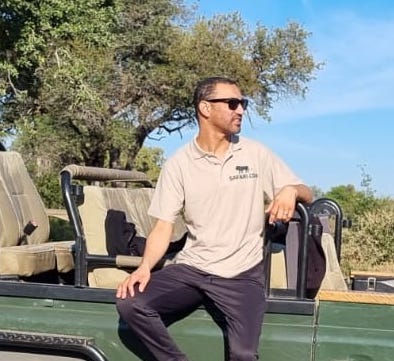
What our guests say about Jayson
March 28, 2024
A superb experience
Dear Jayson, You are a star. The very professional pieces of advice and the optimal design of the schedule that turned our holidays into an extraordinary experience. Thank you so much! Leopard Hills are indeed the boutique luxury camp that you recommended. People there are incredible friendly and knowledgable. The guide was excellent. And the cook, she was a friendly star too. The flight connections went well, despite that rather long drive, and the very early morning start. Wake up calls at 4 AM should be forbidden :) Mauritius was great, Club Med The Plantation Albion was the perfect choice. (The other Club Med @ Cannonier we visited only and were glad we didn’t chose that one…) Thank you again for the superb organisation.
January 23, 2024
First organized trip to Africa.
Booking an entire trip is a new experience for us. Our first contact with Shamiel was pleasant and wanted to know what we wanted out of the entire experience. As the planning moved forward Shamiel brought in Jayson to assist. As they listened to what we wanted and our concerns they brought together a package for us. Both we always accessible and extremely interested to provide us with a great experience.
December 20, 2023
I am so grateful and blessed to meet…
I am so grateful and blessed to meet this wonderful, beautiful soul Jayson Sheffers he’s doing his job with such a passion and pleasure, giving so much energy love and make everything possible make me feel feel and treat me like a queen in the jungle and 🇦🇪SAfrica. Thank you very much. Merry Christmas in advance. Lots of love, blessings, healthy, happy, fulfilled life!

Mar 30, 2024
The on line rep I have been communicating with, Shann, is absolutely wonderful, in all respects. I threw many changes at her and she was always responsive, delivering requested information right away, and works long hours to suit clients in different time zones.
Mar 29, 2024
Thank you so much Keith
Thank you so much Keith! You’ve made booking our holiday and the Safari so easy. We look forward to meeting you.
Pascal was amazing throughout the…
Pascal was amazing throughout the process of booking! He took time to understand our travel requirements and wishes and pulled it all together to create an amazing itinerary!
Mar 28, 2024
Helpful, easy and fast communication
Experienced a double booking
Before payment, we experienced an issue of double booking, where suddenly our chosen lodging is only available for 2 out of 4 days. I hope Safari.com can improve their system to avoid this in the future. While it will be an inconvenience on our part to have to move lodging half way, we also understand the high demand of the lodging as we make the booking just 5 months before departure. I really appreciate Nelia's quick action informing us and providing an alternative plan which works for us. Overall it was quite a smooth booking process.
Safari.com was helpful start to finish
Safari.com was helpful start to finish. The sign up process was clear, the support was great as we tailored our experience. Directions were perfect to get there. Everything in the safari was as we thought it would be and even better. It literally was the trip of a lifetime and exceeded our expectations.
Heleen 's service was superb
Heleen 's service was superb: prompt, friendly and efficient. She altered my reservation promptly and efficiently. She warned me that SAN Parks might not be able to accommodate my wishes, but all is well.
Shamiel was very helpful with advice on…
Shamiel was very helpful with advice on our trip and responded promptly to all my queries.
THE 5 BEST Moscow Safaris
Safaris in moscow.
- Adrenaline & Extreme Tours
- Gear Rentals
- Nature & Wildlife Tours
- 5.0 of 5 bubbles
- District Central (TsAO)
- 3rd Transport Ring (TTK)
- District North-Eastern (SVAO)
- District Eastern (VAO)
- District South-Western (YuZAO)
- Lomonosovskiy
- Ostankinskiy
- Meshchanskiy
- Krasnoselskiy
- Maryina Roshcha (Jewish Quarter)
- Good for Couples
- Good for Kids
- Good for Big Groups
- Adventurous
- Budget-friendly
- Good for a Rainy Day
- Hidden Gems
- Honeymoon spot
- Good for Adrenaline Seekers
- Things to do ranked using Tripadvisor data including reviews, ratings, photos, and popularity.
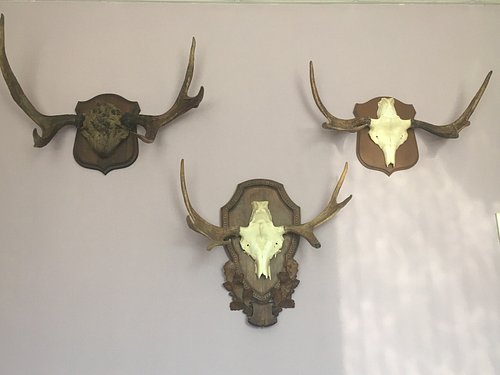
1. Rybokhotsoyuz
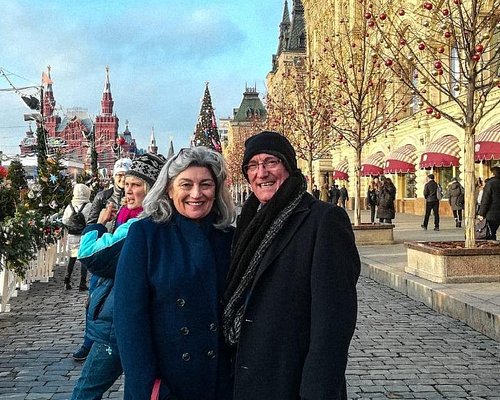
2. Easy Russia Tour Guide
3. UTS GROUP

4. 365AltaiMongolia

5. #1 Russia -Tanzania | Zanzibar, Serengeti Safari & Kilimanjaro Agency | BURIGI CHATO SAFARIS CO LTD

6. Aviashop.Ru

7. Transsib Moscow

8. BASK TOUR
- Easy Russia Tour Guide
- #1 Russia -Tanzania | Zanzibar, Serengeti Safari & Kilimanjaro Agency | BURIGI CHATO SAFARIS CO LTD
- 365AltaiMongolia
- ALL MOSCOW TOURS
- Getting Russian Visa
- Top 10 Reasons To Go
- Things To Do In Moscow
- Sheremetyevo Airport
- Domodedovo Airport
- Vnukovo Airport
- Airports Transfer
- Layover in Moscow
- Best Moscow Hotels
- Best Moscow Hostels
- Art in Moscow
- Moscow Theatres
- Moscow Parks
- Free Attractions
- Walking Routes
- Sports in Moscow
- Shopping in Moscow
- The Moscow Metro
- Moscow Public Transport
- Taxi in Moscow
- Driving in Moscow
- Moscow Maps & Traffic
- Facts about Moscow – City Factsheet
- Expat Communities
- Groceries in Moscow
- Healthcare in Moscow
- Blogs about Moscow
- Flat Rentals
Moscow parks – leisure, nature and historical
Moscow is the most green megapolis in the world. There are over a hundred parks and green spaces like gardens, squares and boulevards. You will definitely bump into a few of them wherever you go. Whether you are interested in memorial, historic parks, parks of wildlife or you just want to have a calm break from the speedy city life – city parks have something special for everyone.
Moscow leisure parks
The leisure Moscow parks are undoubtedly the most popular and famous with the locals and travelers. Today such parks provide a great number of exciting entertainments for Muscovites and city guests, adults and children.
The Gorky Park

Gorky Park opened in 1928 and was the first holiday park in the Soviet Union with playgrounds, a sports stadium, exhibition halls and attractions for kids. Today it has a fresh, vibrant appearance. The park features bike rental stations, a comfortable business area with Wi-Fi, an outdoor movie theatre and a greenhouse where you can buy fresh greens such as basil and lettuce. To contemplate the sky and the stars, go to the observatory and look through the telescope while listening to fascinating stories from astronomers. Enjoy many sports in the park: volleyball, handball, football or a peaceful jog around the beautiful surroundings.

Zaryadye Park
Opened in September 2017, Zaryadye is the youngest on our list. Located just a few minutes away from Red Square, it includes various activities like the floating bridge with its thin V-form extension, an ice cave, also concert hall and an amphitheater. The entire territory of the park was divided into four zones of Russia: forest, steppe, tundra, and the floodplains.
Neskuchny Sad

By walking along the Moskva River’s bank from the Gorky Park towards Vorobievy Gory (Sparrow Hills) you’ll reach Neskuchny Sad («Not Boring» garden), a wonderful place in the Moscow center, one of Moscow’s oldest parks, charming slice of wildlife. The park mostly consists of pristine forest, dotted with old summer pavilions, ponds and quaint little stone bridges. There are a lot of opportunities for different activities lots of children playground, a ping-pong and chess clubs, football fields and tennis courts, horse riding, tree climbing and having rest in one of the nice cafes.
Museon Park

Hermitage Garden

Hermitage Garden has always been known as an amusement, entertainment center with theatres, shows, cafes, summer pavilions, pergolas since 1830. Shalyapin, Sobinov, Nezhdanova – great Russian opera singers starred on the garden stage. Famous Russian composer Rakhmaninov conducted the orchestra. Sara Bernar, Maria Yermolova, outstanding actresses, played in the open air performances. Tolstoy and Lenin had a stroll in the garden. So lots of celebrities from different epoques liked it a lot and spent their time in Hermitage Garden. You can find here three theatres in the garden: Hermitage, Sphere and New Opera. During winter an ice rink works here and in summer a musical stage is assembled to host jazz and brass band festivals.

In Sokolniki Park visitors can play billiard, chess or draughts, table tennis, as well as go cycling, roller blading and swimming in the summer and ice skating or skiing in winter. Each season is highlighted by special memorable and bright events, for example, Summer Jazz Festival or Baby Fest (for future mums), open air beach disco parties, Ice Cream Day, International Clown Festival and many other shows and exhibitions. The park has an observatory, kids center and a co-working zone with free Wi-Fi which is really nice for spending high quality work time there.

Moscow nature parks
The nature parks are national reserves with the amazing forestry and incredible variety of animals and plants there. The breath of wildlife and the chance to be closer to the virgin nature excites both children and grownups. Hundreds of different species of animals can be found in Moscow nature parks. The richest woodlands with old and even ancient trees, like a 200 years pine-tree in the Elk Island National Nature Park, are the point of passionate interest for visitors.
Aptekarsky Ogorod

Aptekarsky Ogorod (Apothecary Garden)
Aptekarsky Ogorod (Apothecary Garden) is one of the oldest gardens in Moscow. It was founded in the XVIII century by Peter the First (great Russian emperor). A larch that he planted himself still grows in the garden, so it’s more than 250 years old. At the time of its foundation, it was a garden with herbs and medicinal plants and was used as an educational center for doctors. Today there are the orangery with its tropical palms, the carp pond, and the immense trees that dot the landscape and turn wonderful golden shades in the autumn. Several restaurants and cafes work here making it a very nice spot for relaxation no matter what season it is. You can book a special tour or join the guided excursion group.
Losiny Ostrov

Losiny Ostrov (Elk Island Park)
Losiny Ostrov (Elk Island Park) is located at the north of Moscow. It covers 22 km from the west to the east and 10 km from the north to the south and it’s one of the most beautiful national parks in Moscow. Two rivers, Yausa and Pechorka begin here. You can find lots of fields, ponds, meadows, streams in the park as well as elks. Here you can enjoy guided tours, available in English. You can choose a guided tour about flora and fauna of the area, you’ll learn why elks are there, which animals are their neighbors. Or enjoy another excursion, which is totally devoted to historical past of ancient tribes once lived there, you’ll know about old Russian mythology, rituals and traditions.
Serebyany Bor

Serebyany Bor (Silver Forest)
Serebyany Bor (Silver Forest) is a famous pine forest in the west of Moscow. The park has 230 forms of plant life, and is also home to watersports complex, providing a lot of activities for visitors. The layout of Serebryany Bor is unusual, as it is located on an artificial island between a meander in the Moscow River and a channel. There is an artificial lake, the Deep Gulf and picturesque Bezdonnoe (Bottomless) Lake in the depths of the forest. Serebryany Bor’s beaches are the cleanest in the city and very popular among Muscovites. On weekends it is difficult to find a free spot here, especially because a whole range of services are offered to visitors, from simple deckchairs to catamaran and yacht rides. Driving is prohibited on the territory of the island so be ready to use trolleybus to reach the entrance.
Botanichesky Sad

Greenhouse of Botanical Garden
Main Botanical Garden of The Russian Academy of Sciences is the largest and most famous is Moscow. The garden is a real museum of nature with a very rich (more than 18000 types) collection of plants. The park was founded in 1945 at the place of the 17th century Apothecaries’ Gardens. The garden’s collection is turned into botanical expositions, made with use of modern receptions of landscape architecture. Here you can see a tree nursery, a shadow garden, hothouse complex, collection of flowers, a rosary, exposition of coastal plants, garden of continuous blossoming, Japanese garden and expositions of cultural plants and natural flora plants. The biggest part of Garden is the Tree nursery occupying the space of 75 hectares. About 2 thousand wood plants grow here. Another big exposition of the Garden is nature Flora, divided into six botanic-geographical collections: European part of Russia, Caucuses, Central Asia, Siberia and Far East. Pride of the Main Botanical Garden is the collection of tropical, coastal and water plants, which is considered as the best in Europe. The Japanese garden, a great model of Japanese landscape gardening art has a 13-level stone pagoda of the 18th century, stone Japanese lamps, ponds, falls and streams, tea lodges and more than 100 species of the most character Japan plants. It is especially decorative in spring, during Oriental cherry blossoming and in fall, when foliage blazes in crimson colors.
Moscow historic parks
Historic nature parks and estates once were the mansions of the Moscow aristocracy. At that far times the estates were outside the Moscow city limits, but after the city expansion and urbanization, they became easily accessible.
Kolomenskoye

Kolomenskoye Museum and Park
The chief attraction of the park is undoubtedly the stone Church of the Ascension of the Lord. It was constructed in 1532 by order of Tsar Vasily III to commemorate the birth of his son and heir, Ivan the Terrible. But there is a lot more to see in the park: the pretty Church of the Icon of Our Lady of Kazan – with its bright azure domes and plenty of gold. Further into the park there is a charming Church of the Beheading of St John the Baptist, built by Ivan the Terrible to mark his coronation.

Kuskovo Park
Kuskovo Park is one of the oldest country estates in Moscow. It was given to General Sheremetev by Peter the Great in 1715, but was left to fall into neglect before being plundered by Napoleon’s troops in 1812. Nowadays the estate has been restored to its former glory and is a good example of Russian 18th Century imperial architecture. The palace is a fine and rare example of wooden neoclassicism. It was completed in 1775, and the rich interiors remain unchanged since 1779. It includes a room hung with exclusive exquisite Flemish tapestries, an abundance of silk wallpaper and an impressive collection of 18th century European and Russian paintings. The palace looks onto the lake, which is surrounded by smaller pavilions: pretty Italian, Dutch and Swiss Cottages, Blank’s Hermitage and the old Orangery, where the State Ceramics Museum is located now, an extensive and absorbing collection of porcelain from the 18th century to the present day. On the other side of the lake is a large wood popular with local cyclists and joggers.
Our Private Tours in Moscow
Moscow metro & stalin skyscrapers private tour, moscow art & design private tour, soviet moscow historical & heritage private tour, gastronomic moscow private tour, «day two» moscow private tour, layover in moscow tailor-made private tour, whole day in moscow private tour, all-in-one moscow essential private tour, tour guide jobs →.
Every year we host more and more private tours in English, Russian and other languages for travelers from all over the world. They need best service, amazing stories and deep history knowledge. If you want to become our guide, please write us.
Contact Info
+7 495 166-72-69
119019 Moscow, Russia, Filippovskiy per. 7, 1
Mon - Sun 10.00 - 18.00
- Travel Planning Center
- Safer Travel
- Airline Partners
- Check-in & Security
- Delta Sky Club®
- Airport Maps & Locations
- Flight Deals
- Flight Schedules
- Destinations
- Onboard Experience
- Delta Cruises
- Delta Vacations
- Shop Hotels
- In-Flight Wi-Fi
- Trip Protection
- How to Earn Miles
- How to Use Miles
- Buy or Transfer Miles
- Travel with Miles
- SkyMiles Partners & Offers
- SkyMiles Award Deals
- SkyMiles Credit Cards
- SkyMiles Airline Partners
- SkyMiles Program Overview
- How to Get Medallion Status
- Benefits at Each Tier
- News & Updates
- Help Center
- Travel Planning FAQs
- Certificates & eCredits
- Accessible Travel Services
- Child & Infant Travel
- Special Circumstances
- SkyMiles Help
Flights to Africa & the Middle East
- Flights to Cape Town
- Flights to Johannesburg
- Flights to Dakar
- Flights to Tel Aviv
Explore Africa
- Flights to Accra
- Flights to Lagos
- Investor Relations
- Business Travel
- Travel Agents
- Comment/Complaint
- Browser Compatibility
- Accessibility
- Booking Information
- Customer Commitment
- Tarmac Delay Plan
- Sustainability
- Contract of Carriage
- Cookies, Privacy & Security
- Human Trafficking Statement (PDF)

Kaza: por qué visitar el parque transnacional más grande y fascinante del mundo
La naturaleza no tiene fronteras. Y, de hecho, generarlas puede tener efectos devastadores en la fauna, pues corta rutas migratorias, separa manadas, limita artificialmente los lugares en los que conseguir alimentos… De esto se dieron cuenta hace unos años Angola, Botsuana, Namibia, Zambia y Zimbabue , cinco naciones africanas que, en un singular esfuerzo, decidieron derribar los límites entre sus países para crear el Área de Conservación Kavango-Zambeze .
Este parque transnacional de casi 520.000 kilómetros cuadrados, el mayor del mundo , aúna 36 parques nacionales y otras muchas áreas protegidas, permitiendo que la fauna de las cuencas de los ríos Okavango y Zambeze fluyan sin restricciones. Esto ha redundado en el bienestar de sus cientos de miles de animales, entre los que se cuentan cocodrilos, leones, leopardos, hienas, rinocerontes, babuinos y jirafas. Concretamente, el espacio alberga un cuarto de millón de ejemplares, entre los cuales se encuentra el 44% de todos los elefantes del continente.
Sus cielos, además, son hogar de más de 500 especies de aves , mientras que entre sus atracciones más imponentes se encuentran tres catalogadas como Patrimonio de la Humanidad: las cataratas Victoria, el delta del Okavango y las pinturas rupestres de Tsodilo .
TRES ATRACCIONES IMPRESCINDIBLES EN KAZA
Conocidas desde antaño por las tribus limítrofes como Mosi-oa-Tunya ("el humo que truena"), las cataratas Victoria hacen honor a su nombre tribal por el ruido que originan las aguas del río Zambeze al caer. Pero ni siquiera esto para a los bañistas más valientes , que se atreven a darse unos larguitos en lo más alto de la misma, sabiendo que a escasos metros se encuentra un salto de 108 metros de altura, la "piscina del diablo". No obstante, son más los que prefieren visitar esta maravilla desde el aire, en helicóptero .
El delta del Okavango, por su parte, es un humedal dentro de un desierto, donde la naturaleza se desarrolla en su forma más silvestre, sin intervención humana: los hervíboros encuentran pastos verdes, sus depredadores deambulan esperando el momento oportuno para cazar, los nenúfares cubren el agua, y las bandadas de aves llenan cada amanecer de sonidos. Es, sin duda, una de las joyas para los amantes del safari.
Ver fotos: Safari en Botswana
Por último, Tsodilo es un conjunto de cuatro montañas repletas de arte rupestre, hasta el punto de que los arqueólogos lo denoniman ‘el Louvre del desierto’. Se encuentra, de hecho, en el desierto de Kalahari, al oeste del delta del Okavango, y en sus cuevas se han encontrado restos de artefactos humanos de 70.000 años de antigüedad.
¿CÓMO VISITAR KAZA?
El Área de Conservación Kavango-Zambeze ocupa un 17% de terreno angoleño. Otro 30% pertenece a Botsuana; el 14%, a Namibia; el 25%, a Zambia y el 14%, a Zimbabue. Debido a ello, para atravesarlo se hacen necesarias cinco visas, aunque la idea es que en el futuro pueda recorrerse este espacio con una sola.
Para evitar burocracia e ir sobre seguro, hay quienes eligen llevar a cabo este safari contratando viajes organizados . Ratpanat es una de las agencias que recorren el terreno desde hace años; su ruta del Okavango Premium , que atraviesa zonas de Namibia, Botswana y de las cataratas Victoria en 21 días de trayecto, incluye vuelos escénicos en avioneta y ultraligero , la posibilidad de conocer a tribus locales y la experiencia de una noche de acampada luxury bajo las estrellas. Wilderness Safaris también es una compañía confiable para conocer estos sobrecogedores paisajes, al igual que Nuba , decana en el viaje de lujo en España. Y, si quieres viajar en familia, aquí va una pequeña guía con todo lo que debes saber para viajar seguro y ¡disfrutar!
Ver más artículos
- ¿Sueñas con viajar a África? Esta es la ruta que estabas esperando
- Pero, ¿se han secado o no las cataratas Victoria?
- La guía definitiva para planear un safari en familia
- Safari en Kenia: una aventura en casa de ‘El Rey León’
- Delta del Okavango, un Jardín del Edén que reafirma la vida
SUSCRÍBETE AQUÍ a nuestra newsletter y recibe todas las novedades de Condé Nast Traveler #YoSoyTraveler
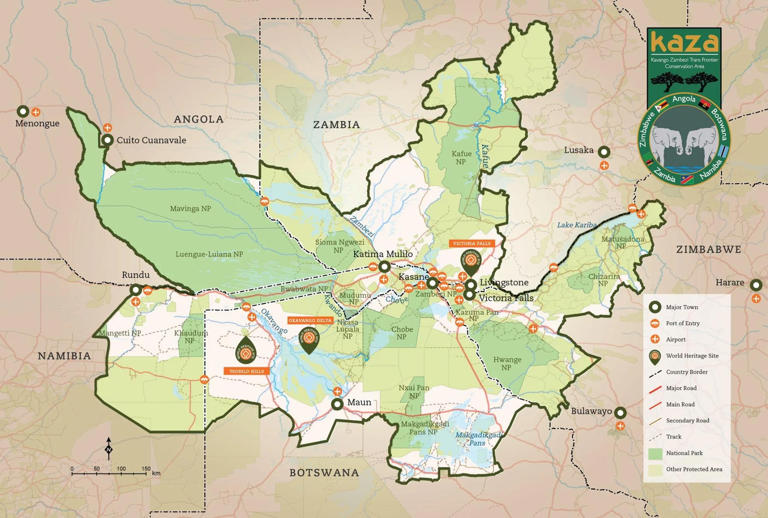
Moscow concert attack: More than 60 reported dead; ISIS claims responsibility
This live blog has ended. For the most recent updates, please click here .
What we know about the Moscow concert attack
- Men in camouflage broke into a Moscow concert hall and opened fire, shooting an unknown number of people, Russia’s prosecutor general said.
- The terror group ISIS has claimed responsibility but did not provide proof of the claim, which was made on ISIS-affiliated news agency Amaq on Telegram.
- Russia's Investigative Committee said that more than 60 people are dead after the attack at Crocus City Hall. Officials have said more than 100 others were injured.
- A fire also started inside Crocus City Hall, a large concert venue northwest of central Moscow. Firefighters have evacuated about 100 people from the basement of the building and efforts are underway to rescue people from the roof, Russian emergency officials said.
- Russia officials said they were investigating the attack as a terrorist act.
- A popular rock band was scheduled to play what appeared to be a sold-out show at the venue, which has a maximum capacity of more than 9,000 people.
Three children among those killed, state media reports
Chantal Da Silva
Three children were among the more than 60 people killed in yesterday's attack at Crocus City Hall, Russian news agency RIA Novosti reported, citing the Russian Ministry of Health.
Officials have warned that the death toll connected to the deadly incident may increase as the investigation continues.
Xi sends condolences to Putin
Chinese President Xi Jinping sent condolences to Russian President Vladimir Putin on Saturday after a deadly shooting at a concert hall near Moscow, saying China opposes all forms of terrorism and strongly condemns terrorist attacks.
China firmly supports the Russian government’s efforts to maintain national security and stability, Xi said, according to CCTV state television.
Moscow bloodshed comes two decades after some of worst attacks in Russia
Phil Helsel
The shooting attacks in Moscow are the latest in a series of deadly terror attacks in the country since the 2000s.
In 2004, militants from Chechnya and elsewhere took hostages at a school in Beslan in southern Russia.
The militants demanded a withdrawal from Chechnya. Hostages were kept in a gymnasium, and 334 died — half of them children — when gunfire and explosions erupted when it was stormed. Hostages’ families were critical of the rescue operation. Russian prosecutors later cleared authorities .
Two years prior, in 2002, Chechen separatists attacked the Dubrovka Theater in Moscow and took more than 700 people hostage. Russian forces used gas, and 129 hostages died. The attackers were killed.
More recently, in 2017 a suicide bomber from Kyrgyzstan killed 15 people as well as himself in an attack on a St. Petersburg subway. In 2013, two bombers killed a combined 34 people in attacks on a railway station and a trolleybus in Volgograd.
The group Islamic State, also known as ISIS, claimed responsibility for the attacks Friday at the Crocus City Hall venue.
Putin wishes victims well, deputy prime minister says
President Vladimir Putin is thinking of those injured in today’s attack and thanked doctors, a Russian government official said according to state media.
State media TASS reported that “Putin wished all those injured in the emergency at Crocus City Hall to recover and conveyed his gratitude to the doctors, Golikova said,” referring to Tatiana Golikova deputy prime minister for social policy, labor, health and pension provision.
More than 60 dead, and death toll could grow, Russian agency says
Russia’s Investigative Committee said Saturday that more than 60 people have died in the attack, and warned the number may increase.
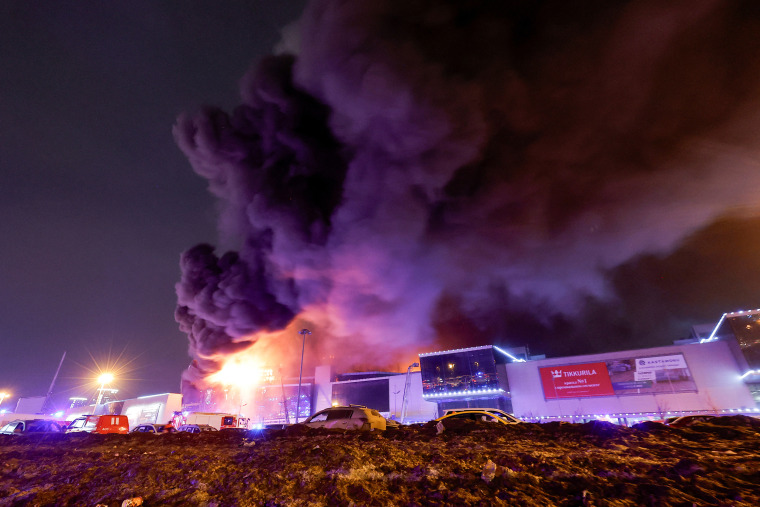
“The bodies of the dead are being examined. It has been previously established that more than 60 people died as a result of the terrorist attack. Unfortunately, the number of victims may increase,” according to the Investigative Committee, which is a federal state agency.
Russia's Ministry of Internal Affairs and the security agency FSB are continuing to investigate, the committee said in a statement, and weapons and ammunition have been found.
U.S. warned Russia about planned terrorist attack in Moscow, NSC says
Monica Alba
The United States shared information about a potential terrorist attack in Moscow with Russia’s government earlier this month, a spokesperson for the National Security Council said.
The U.S. Embassy in Russia on March 7 warned U.S. citizens to avoid crowds and said it was monitoring reports that extremists might attack large gatherings in Moscow.
“Earlier this month, the U.S. Government had information about a planned terrorist attack in Moscow — potentially targeting large gatherings, to include concerts — which prompted the State Department to issue a public advisory to Americans in Russia,” NSC spokesperson Adrienne Watson said.
“The U.S. Government also shared this information with Russian authorities in accordance with its longstanding ‘duty to warn’ policy,” Watson said.
Putin recently dismissed ‘provocative’ warning about potential attacks
In remarks that aired three days ago, Russian President Vladimir Putin accused the West of “provocative statements” about potential terror attacks in Russia, and dismissed them.

“I’ll remind you of recent, let’s say directly, provocative statements of certain official Western structures about potential terror attacks in Russia,” Putin said.
“All of this looks like obvious blackmail and an attempt to intimidate, destabilize our country,” he said before the state security agency FSB.
Putin in those remarks did not specify a country or warning. The U.S. embassy in Russia on March 7 warned U.S. citizens to avoid crowds .
“The Embassy is monitoring reports that extremists have imminent plans to target large gatherings in Moscow, to include concerts, and U.S. citizens should be advised to avoid large gatherings over the next 48 hours,” the U.S. embassy warned.
Guards at concert hall didn't have guns, state news says
The Associated Press
Guards at the concert hall didn’t have guns, and some could have been killed at the start of the attack, Russian media reported.
Some Russian news outlets suggested the assailants fled before special forces and riot police arrived.
Reports said police patrols were looking for several vehicles the attackers could have used to escape.
U.S. had been gathering intelligence that ISIS could attack Russia
Ken Dilanian
The U.S. had been gathering intelligence for months that ISIS could mount a mass casualty attack in Russia, two U.S. officials confirmed to NBC News.
That information led to a March 7 warning issued by the U.S. embassy in Russia about possible extremist attacks, including at concerts, urging people to stay away from large gatherings, one of the officials said.
That official said the claim of responsibility today by ISIS appears to be genuine, though no final assessment had been made about who was responsible.
Some Moscow concertgoers filmed events as they unfolded Friday night, when gunmen opened fire inside a theater and people ran to take cover in fear for their lives.
Witness says gunfire was first thought to be construction noise
A witness to today’s armed attack on Moscow’s Crocus City Hall told a state news agency that they first mistook the gunfire for sounds of an installation being dismantled.
“First, we started hearing typical loud pops, but it was impossible to understand that they were gunshots. We thought that something was falling, as exhibitions were being dismantled at that moment, and someone seemed to be dropping something large,” Mikhail Semyonov told TASS .
“Then, the bangs were getting more and more frequent. Suddenly, there was a scream, and the bangs started to be heard as bursts. Then it became clear that it was shooting,” he said.
ISIS claims responsibility for attack but does not provide proof
The terror group Islamic State has claimed responsibility for the attack in Moscow.
The group, also known as ISIS, did not provide any proof of its claim, which came from ISIS-affiliated news agency Amaq on Telegram.
The group’s members have carried out a number of terror attacks, including the 2015 attacks in Paris that killed 130 people.
Children among the victims, Russia's children commissioner says
Yuliya Talmazan
Russia’s commissioner for children’s rights, Maria Lvova-Belova, said children were among the victims of tonight's attack.
"Information about their condition is regularly updated," Lvova-Belova said on Telegram. "Any additional assistance will be provided immediately."
She later told Russia 24 TV channel that at least two children had been injured, including one boy with a gunshot wound.
Earlier, Russian officials released a preliminary casualty toll of at least 40 people dead and more than 100 injured.
France, U.K., Germany condemn attack
Officials from France, the U.K. and Germany were among those who expressed their condolences to the victims of the attack at the Crocus concert hall.
"The images of the terrible attack on innocent people in Crocus City Hall near #Moscow are horrific," Germany's Foreign Office said on X . "The background must be investigated quickly. Our deepest condolences with the families of the victims."
"We condemn the terrorist attack in the Crocus City Hall near Moscow," the U.K.'s embassy in Russia said . "This is a terrible tragedy."
Meanwhile, France's foreign ministry called for "full light" to be shed on "these heinous acts."
Public events across Russia called off after attack
Several regional leaders across Russia, including in the annexed Kherson region of Ukraine, have canceled public events this weekend over security considerations after the deadly concert attack in Moscow.
Shortly after the attack, Moscow Mayor Sergey Sobyanin canceled all sports, cultural and other public events in Moscow this weekend. State news agency TASS also quoted Russia's cultural ministry as saying that mass and entertainment events in federal cultural institutions have been canceled in the coming days.
Zelenskyy adviser speaks out about attack
President Volodymyr Zelenskyy’s adviser denied that Ukraine was involved in the deadly Crocus concert hall attack.
“Ukraine certainly has nothing to do with the shooting/explosions in the Crocus City Hall (Moscow Region, Russia),” Mykhailo Podolyak wrote on X. “It makes no sense whatsoever.”
No evidence has emerged to suggest Ukraine may have been involved, but Ukrainian officials may be trying to pre-empt accusations, as some Kremlin hawks have already started pointing at Kyiv.
Asked whether the shooting was at all tied to the war in Ukraine, U.S. National Security Council spokesperson John Kirby said: “There is no indication at this time that Ukraine, or Ukrainians, were involved in the shooting, but again, this just broke. We’re taking a look at it, but I would disabuse you at this early hour have any connection to Ukraine.”
Videos posted to social media appear to show chaos inside Moscow's Crocus City Hall during and after a terrorist attack.
Some videos include what sound like gunshots and show men with rifles, as concertgoers frantically try to exit the venue.
State Department issues warning to Americans in Moscow
Jason Abbruzzese
The State Department said that the U.S. Embassy in Moscow is aware of the terrorist attack on Crocus City Hall and that U.S. citizens should avoid the area and follow the instructions of local authorities.
"The U.S. government’s ability to provide routine or emergency services to U.S. citizens in Russia is severely limited, particularly in areas far from the U.S. embassy in Moscow, due to Russian government limitations on travel for U.S. embassy personnel and staffing, and the ongoing suspension of operations, including consular services, at U.S. consulates in Russia," the State Department said in a message posted to its website .
'What a nightmare in Crocus,' Widow of opposition leader Alexei Navalny condolences about concert attack
Yulia Navalnaya, the widow of Russian opposition leader Alexei Navalny who died in prison last month, expressed her condolences about the attack Friday.
"What a nightmare in Crocus," Navalnaya wrote on X. "Condolences to the families of the victims and quick recovery to the injured. Everyone involved in this crime must be found and held accountable."
320 firefighters, 3 helicopters working to put out fire
Russia's Ministry of Emergency Situations said the number of rescue crews responding to the attack is growing and now includes more than 320 firefighters, 130 emergency vehicles and three helicopters dumping water on the burning concert venue.
Moscow regional governor says 40 dead, more than 100 injured
Moscow Regional Governor Andrei Vorobyov said on Telegram that at least 40 people are dead and more than 100 injured in the terrorist attack, confirming figures previously reported by Russian state news.
Putin informed about concert venue attack 'in the first minutes,' Kremlin spokesperson says
Kremlin spokesperson Dmitry Peskov said President Vladimir Putin was informed about the shooting at the Crocus concert hall "in the first minutes" of the attack, Russian state news agency RIA reported.
The president is receiving information about what is happening and the measures being taken through all relevant services and is giving necessary instructions, Peskov said according to RIA.
Russian journalist was inside concert venue when gunmen entered
Russian news agency RIA Novosti said on Telegram that one of its reporters was inside the venue when gunmen entered and began shooting concertgoers.
The journalist said that at least three unmasked gunmen in camouflage entered the hall a few minutes before 8 p.m. Moscow time. They shot people point-blank and threw incendiary bombs, according to the journalist.
Russia's foreign ministry spokesperson calls incident 'bloody terrorist attack'
Maria Zakharova, spokesperson for Russia's foreign ministry, called the Friday night incident at the Crocus City Hall in Moscow a "bloody terrorist attack" as she called for "strong condemnation" from the international community.
"Now, as the Russian authorities have stated, all efforts are being devoted to saving people," Zakharova said. "The entire world community is obliged to condemn this monstrous crime!"
U.S. national security spokesperson says embassy has told Americans to avoid large gatherings in Moscow
Kyla Guilfoil
National Security Council Spokesman John Kirby addressed the attack in Moscow at a White House press briefing Friday afternoon, calling it a “terrible, terrible shooting attack.”
“The images are just horrible and just hard to watch and our thoughts obviously are going to be with the the victims,” Kirby said.
Kirby added that the U.S. embassy has notified all Americans in Moscow to avoid large gatherings, concerts, shopping malls, etc., and “stay put where they are” for their safety.
Russian media says 40 dead, more than 100 injured at concert attack
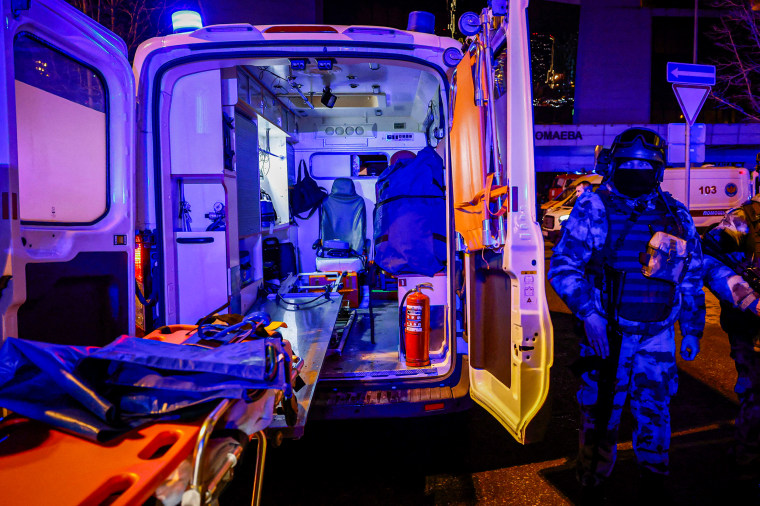
TASS, Russia's state-owned news agency, and RIA Novosti are reporting that Russia's FSB security agency has put the preliminary casualty count at 40 dead and more than 100 injured by a terrorist attack on a Moscow-area concert venue.
NBC News has not confirmed those casualty numbers.
Roof of concert venue at risk of collapse, Russian media says
Russian news agency RIA Novosti said on Telegram that the roof of the building near the concert venue's stage has begun to collapse.
Video posted to Telegram by RIA Novosti showed fire continue to blaze inside the venue.
Moscow area governor says more than 70 ambluances at scene of attack
Andrei Vorobyov, Moscow's regional governor, said on Telegram that more than 70 ambulances have been dispatched to the scene of concert venue attack.
“Everything is being done at the scene to save people," he wrote in the Telegram message. "The Special Rapid Response Unit (SOBR) has been deployed. There are over 70 ambulance carriages near Crocus, doctors provide the necessary assistance to all victims."
Nigel Chiwaya
Russia’s prosecutor general office says number of victims still being determined
Russia's prosecutor general said on Telegram that officials are working to determine how many people have been killed or hurt in the concert attack.
“On behalf of Igor Krasnov, the prosecutor of the Moscow region has gone to the scene of the incident at Crocus City Hall to coordinate the actions of law enforcement agencies," the prosecutor general's Telegram account posted. "Tonight, before the start of the event in the concert hall in Krasnogorsk, unknown men in camouflage clothes broke into the building and started shooting."
"The number of victims is being determined, a fire started in the entertainment center building, and citizens are being evacuated."
Moscow's mayor cancels weekend events
Moscow Mayor Sergei Sobyanin said on Telegram that he was canceling all public events in Moscow this weekend.
"I have taken the decision to cancel all sports, cultural and other public events in Moscow this weekend," he said. "I ask of you to treat this measure with understanding."
Popular rock band was to play sold-out venue that can hold 9,500
Tim Stelloh
A popular rock band was scheduled to play what appeared to be a sold-out show at the Moscow concert hall where there were reports of gunmen in combat fatigues opening fire.
Picnic, formed in 1978, was to play at Crocus City Hall, west of central Moscow.
The multilevel facility in Krasnogorsk has a maximum capacity of 9,527 people. Booking sites show the event was sold out.
Russia's aviation agency says additional security added to Moscow airports
The Russian aviation agency Rosaviatsiya said that additional security measures are being introduced in Moscow airports
"Due to increased security measures, we ask passengers to arrive at Sheremetyevo, Domodedovo, Vnukovo and Zhukovsky airports in advance," the agency said on the Telegram messaging app.
Moscow's emergency ministry says it is working to extinguish fire
Moscow’s emegency ministry said it was working to extinguish a fire that began at the music venue.
The ministry said about 100 people were evacuated from the building, and it was working to rescue people from the roof.
Russian media says state security taking action
Russia's news outlet RIA Novosti said that the country's security agency, the FSB, is taking measures to respond to the shooting at a concert hall near Moscow.
Videos posted by Russian media show men with rifles moving through area
Extended rounds of gunfire could be heard on multiple videos posted by Russian media and Telegram channels. One showed two men with rifles moving through a concert hall. Another one showed a man inside the auditorium, saying the assailants set it on fire, with incessant gunshots ringing out in the background.
Andrei Vorobyov, the governor of the Moscow region, said he was heading to the area and set up a task force to deal with the damage. He didn’t immediately offer any further details.
Russian media reports said that riot police units were being sent to the area as people were being evacuated.
Russian news outlets report gunman opened fire at Moscow concert hall
Several gunmen in combat fatigues burst into a big concert hall in Moscow on Friday and fired automatic weapons at the crowd, injuring an unspecified number of people, Russian media said.
Russian news reports said that the assailants also used explosives, causing a massive blaze at the Crocus City Hall on the western edge of Moscow. Video posted on social media showed huge plumes of black smoke rising over the building.
Russia’s state RIA Novosti news agency reported that at least three people in combat fatigues fired weapons. The state Tass news agency also reported the shooting.
U.S. warned of imminent Moscow attack by ‘extremists,’ urges citizens to avoid crowds
Patrick Smith
U.S. citizens in Moscow had been warned to avoid large gatherings earlier this month because of heightened fears of a terrorist attack.
The U.S. Embassy in the Russian capital said it was “monitoring reports that extremists have imminent plans to target large gatherings in Moscow, to include concerts, and U.S. citizens should be advised to avoid large gatherings over the next 48 hours.”
U.S. citizens should avoid crowds, monitor local media for updates and “be aware of your surroundings,” it said in a brief online update .
Read the full story here.

IMAGES
COMMENTS
The Okavango Delta safari is an African classic. The vast network of waterways changes with the seasons, but always hosts memorable wildlife populations. The diversity here is endless, with islands that exist one year but are gone the next. This world in motion should be drama enough for most visitors, but it is here that Botswana's wildlife ...
Okavango Delta Honeymoon. The Okavango Delta is probably the world's premier safari destination for honeymoon couples, with stunningly designed, intimate lodges and some of the best wildlife viewing in Africa. Okavango delta lodges have a reputation for exceptional, personal service and many cater specifically for romantic holidays and ...
Okavango Delta / Safari / Okavango Explorers Safari. An iconic Okavango safari for any time of year. Combine the permanent deep waters of the Okavango with the explosive game viewing of the famous Duba concession for a perfectly balanced itinerary. At Duba Explorers, in the northern Okavango, you will explore the same game rich lands featured ...
The Okavango Delta is an exclusive safari destination offering luxury and tented accommodation options and an unforgettable safari experience all year round. When. The cooler, drier winter months from May to October are excellent for game-viewing as herds of animals flock to decreasing water sources and the vegetation thins out. Days are warm ...
Affordable Okavango Delta Safari. This six-night safari combines a true water camp in the permanent Delta with a classic land camp for fantastic game viewing for a truly affordable Okavango Delta safari. This is a year round safari offering the full spectrum of land and water-based activities in comfortable camps.
NG32 is a pristine private concession area located within the captivating Okavango Delta in Botswana, between the Moremi game reserve and the Gomoti plains. It is the place we call home at the Atzaró Okavango camp. Known for its exceptional wildlife, breathtaking landscapes, and serene waterways, NG32 offers a unique and immersive safari ...
Okavango Delta / Safari / One week Classic Wilderness Safari. A powerful combination of luxury Okavango camps come together to create a superb 7 night itinerary, one of our most popular. Importantly, this itinerary delivers great game viewing and both land and water activities all year round. Following a triangular route through the south, east ...
Encapsulating the heart of wild Africa with its evocative scenes of wildlife and natural beauty, a journey into the untouched Okavango Delta is one of jaw-dropping big game viewing, peace and tranquility. The delta itself is a beautiful fan-shaped wetland and labyrinth of islands and lagoons, all fed by the third largest river in Southern Africa - the Okavango.
Okavango Delta / Safari / Classic 4 night Okavango Safari. A perfectly balanced itinerary exploring the best of the west and east Okavango. Visiting two luxury tented camps set on excellent private concessions with abundant game and a full range of activities. Both areas have permanent water channels ensuring both land and water activities are ...
The Okavango Delta is a huge, swampy inland delta in the heart of the Kalahari Desert in northern Botswana. At around 15,000 square kilometers, the delta is the largest wetland wilderness in the world - a place where African wildlife is untrammeled by human interference, and the safari experience is truly second to none.
Okavango Delta Safari Tours & Holidays; Heed the call of the wild in the Okavango Delta. Welcome to the world's largest inland delta. Made up of maze-like waterways, flooded grasslands and lily pad-covered lagoons, the Okavango is a haven for wildlife. In fact, it boasts some of the best game viewing in Africa. One of the best ways to spot ...
The safari ends at on an idyllic little island deep in the Delta, a chance to slow the safari down and enjoy the tranquillity and beauty of the Okavango. This 8 night itinerary begins with 3 nights at Selinda Explorers Camp on the private Selinda Reserve followed by 3 nights at Duba Explorers Camp, on a private concession in the Okavango Delta ...
Okavango Delta & Chobe Safari - 10 Days. Discover why Botswana is one of Africa's premier wilderness locations with the 10-day Botswana safari. Experience the astonishing wildlife of the Okavango Delta, Khwai River, Moremi Game Reserve and Kazuma Forest Reserve as you spend your nights at some of Botswana's top lodges and camps.
This wonderful, far-flung, relaxing African safari retreat is located in one of the most scenic areas of the lush Okavango Delta. At Belmond Eagle Island Camp you will feel like you are walking on air, but realise quickly that floating on water is even better. from US$ 834 per person per night.
Okavango Delta / Safari / Four Night Classic Wilderness Safari. This four night itinerary is perfect for those looking for a shorter safari with all the classic elements of an Okavango safari. Excellent game viewing, diverse activities, stunning landscapes and beautiful accommodation all blend together to make this thrilling itinerary.
Birdwatching: The Okavango Delta is a haven for bird enthusiasts, with over 400 species of birds. Keep your binoculars handy to spot iconic species like African fish eagles, Pel's fishing owls, and vibrant lilac-breasted rollers. Fishing: Engage in catch-and-release fishing for species such as tigerfish and bream.
The quintessential delta experience: game drives in open safari vehicles and gliding in silence through the waterways on an African-style gondola carved from a single tree.. Access into the Okavango Delta is difficult, getting around is difficult, carting supplies in and waste out is difficult. These are all good things for this vast wildlife wilderness is utterly picturesque and devoid of ...
The Okavango Delta is a unique pulsing wetland. More correctly an alluvial fan, the delta covers between 6 and 15 000 square kilometres of Kalahari Desert in northern Botswana and owes its existence to the Okavango (Kavango) River which flows from the Angolan highlands, across Namibia's Caprivi Strip and into the harsh Kalahari Desert.
The luxurious Camp Okavango is an authentic African safari lodge situated on the secluded Nxaragha Island in the heart of the permanent Okavango Delta. The camp was designed to be eco-sensitive and is therefore 100% solar powered. Camp Okavango boasts twelve spacious Safari Suites. Each elevated suite features an en-suite bathroom with double ...
These places are best for safaris in Moscow: Easy Russia Tour Guide; UTS GROUP #1 Russia -Tanzania | Zanzibar, Serengeti Safari & Kilimanjaro Agency | BURIGI CHATO SAFARIS CO LTD; 365AltaiMongolia; BASK TOUR; See more safaris in Moscow on Tripadvisor
Losiny Ostrov. Losiny Ostrov (Elk Island Park) Losiny Ostrov (Elk Island Park) is located at the north of Moscow. It covers 22 km from the west to the east and 10 km from the north to the south and it's one of the most beautiful national parks in Moscow. Two rivers, Yausa and Pechorka begin here.
With its unsurpassed global network, Delta, its Delta Connection® carriers, and Partner Airlines offer service to more than 1,000 destinations in over 60 countries on six continents. Find more in our 2019 Europe, Middle East, Africa and India Travel Guide . For flights to Africa & the Middle East, shop Delta's best fares with our Low Fare ...
Se encuentra, de hecho, en el desierto de Kalahari, al oeste del delta del Okavango, y en sus cuevas se han encontrado restos de artefactos humanos de 70.000 años de antigüedad.
Russia's Investigative Committee said Saturday that more than 60 people have died in the attack, and warned the number may increase. Smoke rises above the burning Crocus City Hall concert venue ...